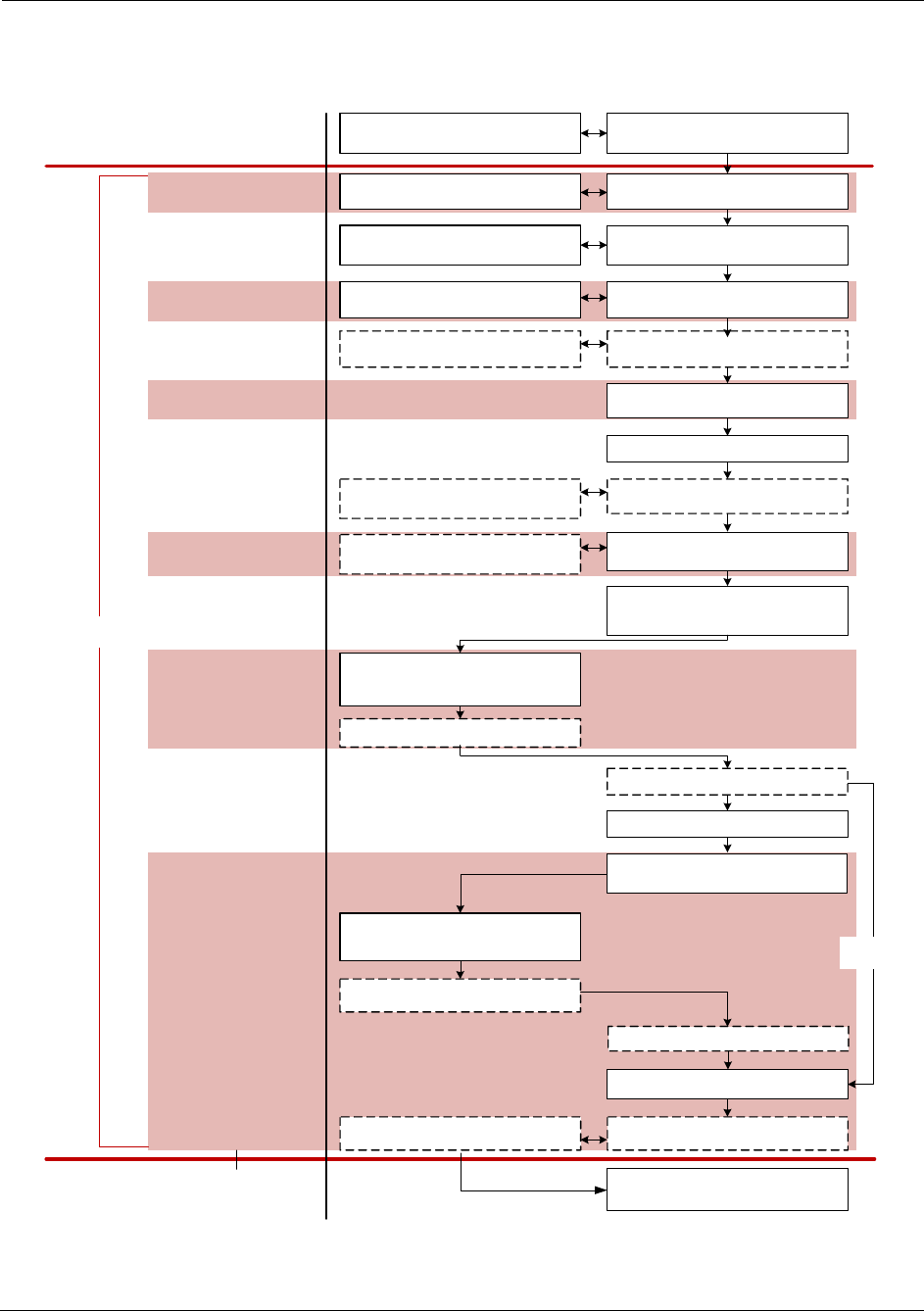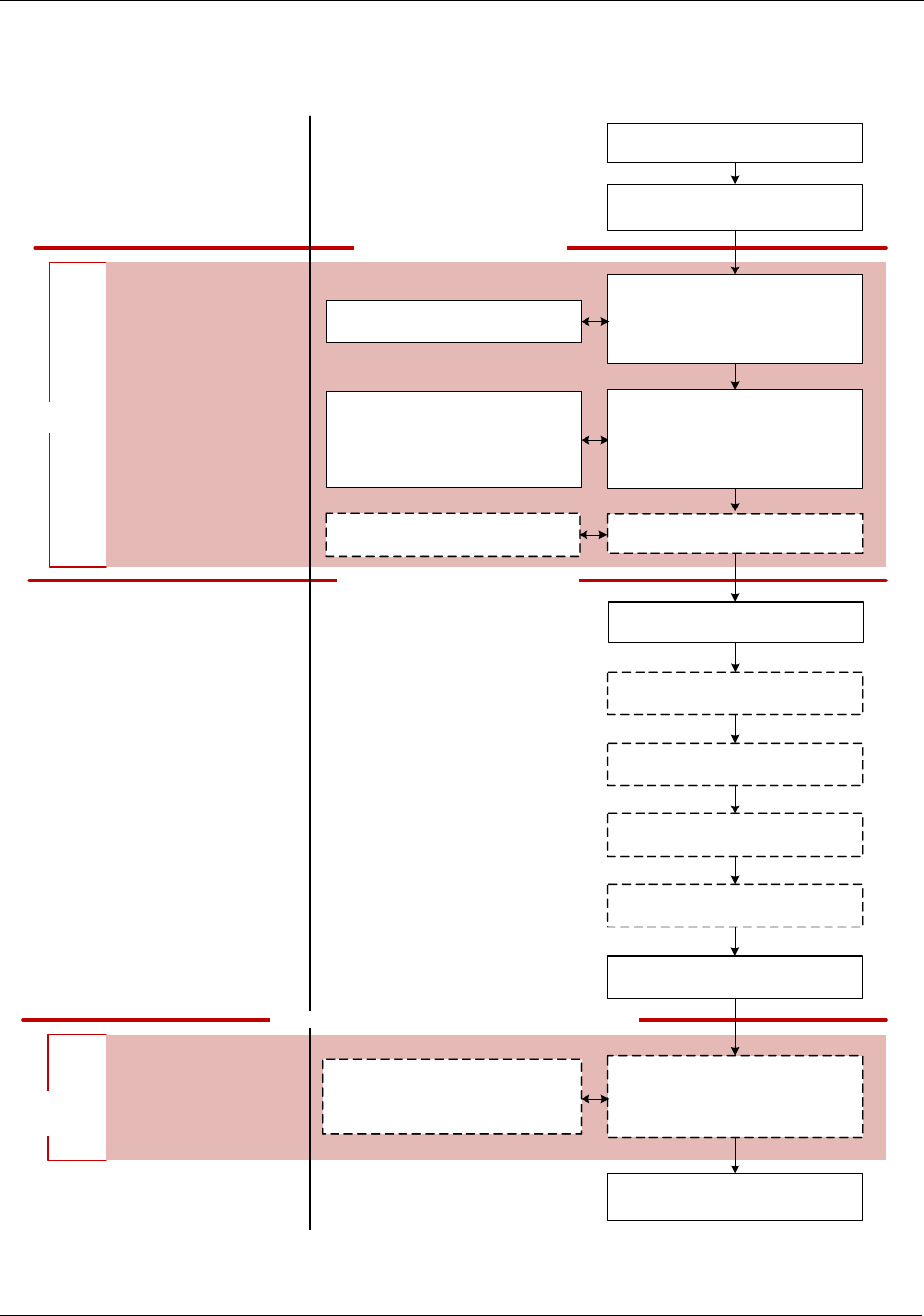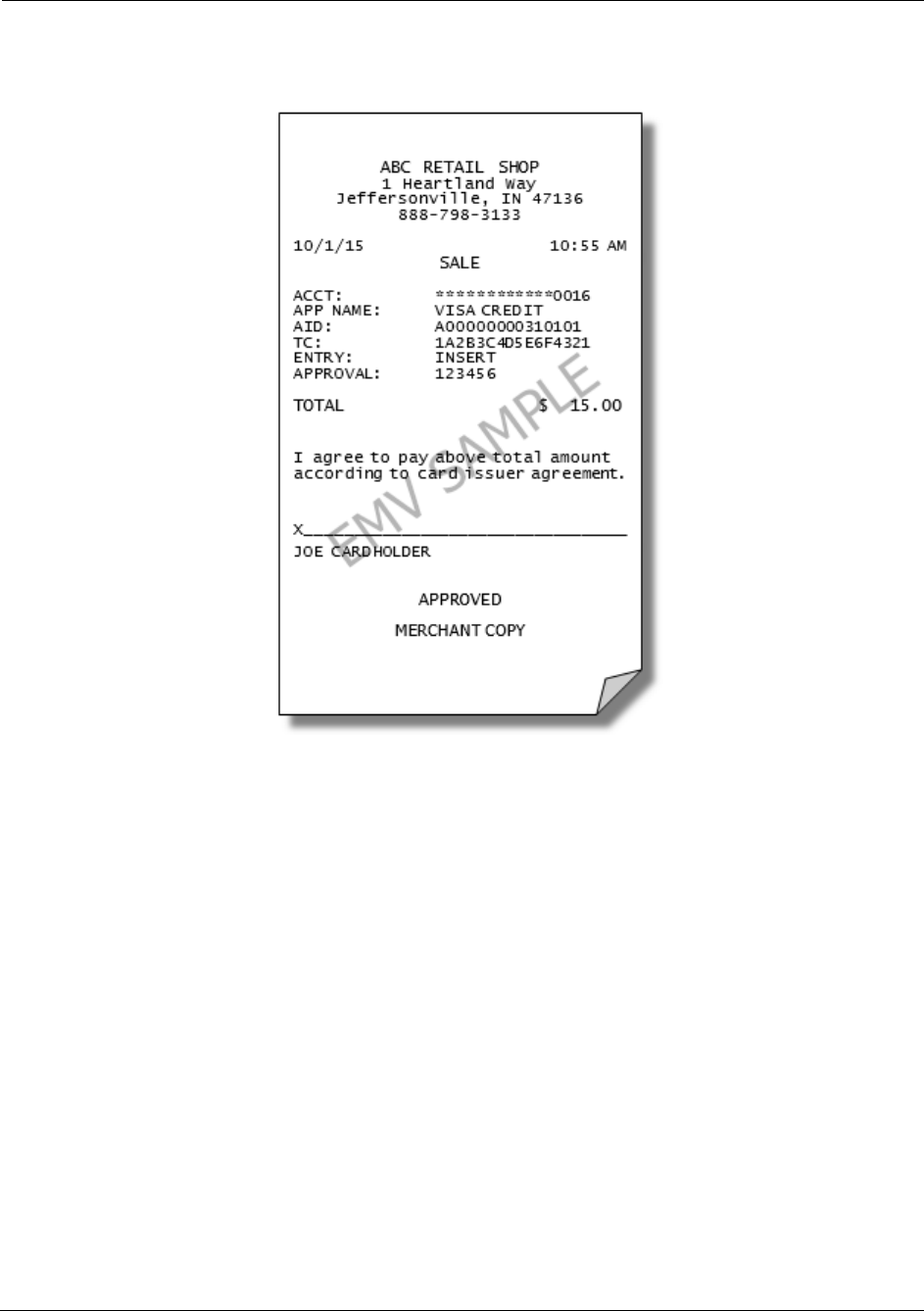EMV Integrator's Guide V 15.2 Oct 2015
EMV%20Integrator's%20Guide%20V%2015.2%20Oct-2015
User Manual:
Open the PDF directly: View PDF ![]() .
.
Page Count: 120 [warning: Documents this large are best viewed by clicking the View PDF Link!]
- EMV Integrator’s Guide
- Release Notes
- Table of Contents
- List of Tables
- List of Figures
- Chapter 1: Overview
- Chapter 2: EMV Processing Overview
- Chapter 3: EMV Development Overview
- Chapter 4: EMV Terminal Interface
- 4.1 EMV Terminal to Card Communication
- 4.2 EMV Data Elements
- 4.3 Contact Transaction Flow
- 4.3.1 Tender Processing
- 4.3.2 Card Acquisition
- 4.3.3 Application Selection
- 4.3.4 Initiate Application Processing
- 4.3.5 Read Application Data
- 4.3.6 Offline Data Authentication
- 4.3.7 Processing Restrictions
- 4.3.8 Cardholder Verification
- 4.3.9 Terminal Risk Management
- 4.3.10 Terminal Action Analysis
- 4.3.11 Card Action Analysis
- 4.3.12 Online Processing
- 4.3.13 Issuer Authentication
- 4.3.14 Issuer-to-Card Script Processing
- 4.3.15 Completion
- 4.3.16 Card Removal
- 4.4 Contactless Transaction Flow
- 4.4.1 Pre-Processing
- 4.4.2 Discovery Processing
- 4.4.3 Application Selection
- 4.4.4 Initiate Application Processing
- 4.4.5 Read Application Data
- 4.4.6 Card Read Complete
- 4.4.7 Processing Restrictions
- 4.4.8 Offline Data Authentication
- 4.4.9 Cardholder Verification
- 4.4.10 Online Processing
- 4.4.11 Completion
- 4.4.12 Issuer Update Processing
- 4.5 EMV Receipts
- Chapter 5: EMV Parameter Interface
- Appendix

EMV Integrator’s Guide
Version 15.2
October 2015

Notice EMV Integrator’s Guide V 15.2
22015 Heartland Payment Systems, Inc., All Rights Reserved–HPS Confidential: Sensitive
Notice
THE INFORMATION CONTAINED HEREIN IS PROVIDED TO RECIPIENT “AS IS” WITHOUT
WARRANTY OF ANY KIND, EXPRESS OR IMPLIED, INCLUDING BUT NOT LIMITED TO, THE
IMPLIED WARRANTIES OF MERCHANTABILITY AND FITNESS FOR A PARTICULAR
PURPOSE, OR WARRANTY OF TITLE OR NON-INFRINGEMENT. ALL SUCH WARRANTIES
ARE EXPRESSLY DISCLAIMED.
HEARTLAND PAYMENT SYSTEMS SHALL NOT BE LIABLE FOR ANY DIRECT, INDIRECT,
SPECIAL, INCIDENTAL, OR CONSEQUENTIAL DAMAGES RESULTING FROM THE USE OF
ANY INFORMATION CONTAINED HEREIN, WHETHER RESULTING FROM BREACH OF
CONTRACT, BREACH OF WARRANTY, NEGLIGENCE, OR OTHERWISE, EVEN IF
HEARTLAND PAYMENT SYSTEMS HAS BEEN ADVISED OF THE POSSIBILITY OF SUCH
DAMAGES. HEARTLAND PAYMENT SYSTEMS RESERVES THE RIGHT TO MAKE
CHANGES TO THE INFORMATION CONTAINED HEREIN AT ANY TIME WITHOUT NOTICE.
THIS DOCUMENT AND ALL INFORMATION CONTAINED HEREIN IS PROPRIETARY
HEARTLAND PAYMENT SYSTEMS INFORMATION. UNDER ANY CIRCUMSTANCES,
RECIPIENT SHALL NOT DISCLOSE THIS DOCUMENT OR THE SYSTEM DESCRIBED
HEREIN TO ANY THIRD PARTY WITHOUT PRIOR WRITTEN CONSENT OF A DULY
AUTHORIZED REPRESENTATIVE OF HEARTLAND PAYMENT SYSTEMS. IN ORDER TO
PROTECT THE CONFIDENTIAL NATURE OF THIS PROPRIETARY INFORMATION,
RECIPIENT AGREES:
(A) TO IMPOSE IN WRITING SIMILAR OBLIGATIONS OF CONFIDENTIALITY AND
NONDISCLOSURE AS CONTAINED HEREIN ON RECIPIENT’S EMPLOYEES AND
AUTHORIZED THIRD PARTIES TO WHOM RECIPIENT DISCLOSES THIS
INFORMATION (SUCH DISCLOSURE TO BE MADE ON A STRICTLY NEED-TO-KNOW
BASIS) PRIOR TO SHARING THIS DOCUMENT AND
(B) TO BE RESPONSIBLE FOR ANY BREACH OF CONFIDENTIALITY BY THOSE
EMPLOYEES AND THIRD PARTIES TO WHOM RECIPIENT DISCLOSES THIS
INFORMATION.
RECIPIENT ACKNOWLEDGES AND AGREES THAT USE OF THE INFORMATION
CONTAINED HEREIN SIGNIFIES ACKNOWLEDGEMENT AND ACCEPTANCE OF THESE
TERMS. ANY SUCH USE IS CONDITIONED UPON THE TERMS, CONDITIONS AND
OBLIGATIONS CONTAINED WITHIN THIS NOTICE.
THE TRADEMARKS AND SERVICE MARKS RELATING TO PRODUCTS OR SERVICES OF
HEARTLAND PAYMENT SYSTEMS OR OF THIRD PARTIES ARE OWNED BY HEARTLAND
PAYMENT SYSTEMS OR THE RESPECTIVE THIRD PARTY OWNERS OF THOSE MARKS,
AS THE CASE MAY BE, AND NO LICENSE WITH RESPECT TO ANY SUCH MARK IS EITHER
GRANTED OR IMPLIED.
To verify existing content or to obtain additional information, please call or email your assigned
Heartland Payment Systems contact.

EMV Integrator’s Guide V 15.2 Release Notes
2015 Heartland Payment Systems, Inc., All Rights Reserved–HPS Confidential: Sensitive 3
Release Notes
Version 15.2 Release Notes
Version Release Date Revisions
1.0 07/15/2014 New document.
1.1 07/31/2014 Clarification updates.
1.2 11/21/2014 Portico updates.
1.2.1 12/19/2014 Removed references regarding preliminary and subject to change.
15.1.1 06/02/2014 Identified corrections and clarification updates.
15.2 10/30/2015 Restructured and applied updates.

Release Notes EMV Integrator’s Guide V 15.2
42015 Heartland Payment Systems, Inc., All Rights Reserved–HPS Confidential: Sensitive

EMV Integrator’s Guide V 15.2 Table of Contents
2015 Heartland Payment Systems, Inc., All Rights Reserved–HPS Confidential: Sensitive 5
Table of Contents
Chapter 1: Overview ................................................................................................................. 13
Introduction ...........................................................................................................................................13
Document Purpose ...............................................................................................................................13
Audience ...............................................................................................................................................13
Payment Application Data Security Standards (PA-DSS) .....................................................................14
Chapter 2: EMV Processing Overview.................................................................................... 15
Introduction ...........................................................................................................................................15
EMV Migration.......................................................................................................................................16
Enhanced Security ...........................................................................................................................16
Card Brand Mandates......................................................................................................................16
Fraud Liability Shifts.........................................................................................................................17
PCI Audit Waivers ............................................................................................................................17
EMV Specifications ...............................................................................................................................17
Contact Specifications......................................................................................................................18
Contactless Specifications ...............................................................................................................18
Heartland Host Specifications ..........................................................................................................19
EMV Online vs. Offline ..........................................................................................................................19
Card Authentication .........................................................................................................................19
Cardholder Verification.....................................................................................................................20
Authorization ....................................................................................................................................20
Full vs. Partial EMV Transactions and Flow..........................................................................................20
Full vs. Partial Transaction Flow ......................................................................................................21
Full vs. Partial Credit Transactions ..................................................................................................22
Full vs. Partial Debit Transactions....................................................................................................22
Chapter 3: EMV Development Overview................................................................................. 23
EMV Terminals ......................................................................................................................................23
Contact Devices ...............................................................................................................................23
Contactless Devices.........................................................................................................................23
Letters of Approval ...........................................................................................................................24
EMV Solutions.......................................................................................................................................24
Integrated.........................................................................................................................................24
Standalone .......................................................................................................................................24
EMV Certifications.................................................................................................................................25
Test Requirements ...........................................................................................................................25
Test Plans ........................................................................................................................................26
VISA Smart Debit/Credit (VSDC) Testing ...................................................................................26
MasterCard Terminal Integration Process (M-TIP) Testing .........................................................26

Table of Contents EMV Integrator’s Guide V 15.2
62015 Heartland Payment Systems, Inc., All Rights Reserved–HPS Confidential: Sensitive
American Express Integrated Circuit Card Payment Specification (AEIPS) Testing ...................27
Discover D-Payment Application Specification (D-PAS) Testing.................................................27
Test Tools .........................................................................................................................................28
Test Environments............................................................................................................................29
Test Process.....................................................................................................................................29
EMV Support .........................................................................................................................................30
Chapter 4: EMV Terminal Interface ......................................................................................... 31
EMV Terminal to Card Communication .................................................................................................31
Application Protocol Data Units (APDUs).........................................................................................31
Tag, Length, Value (TLV) Data Objects ............................................................................................32
Kernel Application Programming Interface (API) .............................................................................32
EMV Data Elements ..............................................................................................................................33
Data Conventions.............................................................................................................................33
Terminal Data ...................................................................................................................................34
Card Data.........................................................................................................................................44
Issuer Data.......................................................................................................................................52
Contact Transaction Flow......................................................................................................................52
Tender Processing ...........................................................................................................................54
Card Acquisition ...............................................................................................................................54
Card Swipe .................................................................................................................................54
Fallback Processing....................................................................................................................55
Application Selection........................................................................................................................56
Available AIDs.............................................................................................................................58
Debit AIDs...................................................................................................................................59
Initiate Application Processing .........................................................................................................59
Read Application Data .....................................................................................................................60
Offline Data Authentication...............................................................................................................60
Processing Restrictions....................................................................................................................61
Cardholder Verification.....................................................................................................................61
PIN Support ................................................................................................................................62
Terminal Risk Management..............................................................................................................63
Terminal Action Analysis ..................................................................................................................63
Card Action Analysis ........................................................................................................................64
Online Processing ............................................................................................................................64
Offline Authorization....................................................................................................................65
Deferred Authorization (Store-and-Forward)...............................................................................65
Forced Acceptance (Stand-In) ....................................................................................................66
Issuer Authentication........................................................................................................................67
Issuer-to-Card Script Processing .....................................................................................................68
Completion .......................................................................................................................................68

EMV Integrator’s Guide V 15.2 Table of Contents
2015 Heartland Payment Systems, Inc., All Rights Reserved–HPS Confidential: Sensitive 7
Card Removal ..................................................................................................................................69
Contactless Transaction Flow ..............................................................................................................69
Pre-Processing ................................................................................................................................71
Discovery Processing.......................................................................................................................71
Application Selection........................................................................................................................71
Initiate Application Processing .........................................................................................................72
Path Determination .....................................................................................................................72
Terminal Risk Management ........................................................................................................72
Terminal Action Analysis .............................................................................................................72
Card Action Analysis...................................................................................................................72
Read Application Data .....................................................................................................................72
Card Read Complete .......................................................................................................................73
Processing Restrictions....................................................................................................................73
Offline Data Authentication ..............................................................................................................73
Cardholder Verification.....................................................................................................................73
Online Processing ............................................................................................................................73
Completion.......................................................................................................................................74
Issuer Update Processing ................................................................................................................74
EMV Receipts........................................................................................................................................74
Approval Receipts ............................................................................................................................74
Decline Receipts ..............................................................................................................................76
Chapter 5: EMV Parameter Interface....................................................................................... 77
Introduction ...........................................................................................................................................77
Exchange ..............................................................................................................................................78
POS 8583..............................................................................................................................................78
NTS .......................................................................................................................................................79
Z01 ........................................................................................................................................................79
Portico ...................................................................................................................................................79
SpiDr .....................................................................................................................................................80
Appendix .................................................................................................................................. 81
EMV PDL Data Examples .....................................................................................................................81

Table of Contents EMV Integrator’s Guide V 15.2
82015 Heartland Payment Systems, Inc., All Rights Reserved–HPS Confidential: Sensitive

EMV Integrator’s Guide V 15.2 List of Tables
2015 Heartland Payment Systems, Inc., All Rights Reserved–HPS Confidential: Sensitive 9
List of Tables
2-1 Key Security Features.................................................................................................................16
2-2 Liability Shifts ..............................................................................................................................17
2-3 Contact Specifications ................................................................................................................18
2-4 Contactless Specifications ..........................................................................................................18
2-5 Heartland Host Specifications.....................................................................................................19
2-6 Card Authentication ....................................................................................................................19
2-7 Cardholder Verification ...............................................................................................................20
2-8 Authorization...............................................................................................................................20
2-9 Full vs. Partial EMV Transactions and Flow ...............................................................................20
2-10 Full vs. Partial Transaction Flow .................................................................................................21
2-11 Full vs. Partial Credit Transactions .............................................................................................22
2-12 Full vs. Partial Debit Transactions ..............................................................................................22
3-1 Integrated Solutions ....................................................................................................................24
3-2 VSDC Testing .............................................................................................................................26
3-3 M-TIP Testing .............................................................................................................................26
3-4 AEIPS Testing.............................................................................................................................27
3-5 D-PAS Testing ............................................................................................................................27
3-6 Test Environments ......................................................................................................................29
3-7 Test Process ...............................................................................................................................29
4-1 Command APDU Format ............................................................................................................31
4-2 Response APDU Format ............................................................................................................31
4-3 Data Conventions .......................................................................................................................33
4-4 Terminal Data .............................................................................................................................34
4-5 Card Data....................................................................................................................................44
4-6 Issuer Data..................................................................................................................................52
4-7 Tender Processing......................................................................................................................54
4-8 Fallback Processing....................................................................................................................55
4-9 Application Selection...................................................................................................................56
4-10 Supported Application Methods ..................................................................................................56
4-11 Offline Data Authentication .........................................................................................................60
4-12 Processing Restrictions ..............................................................................................................61
4-13 Cardholder Verification ...............................................................................................................61
4-14 PIN Support ................................................................................................................................62
4-15 Terminal Risk Management ........................................................................................................63
4-16 Terminal Action Analysis.............................................................................................................63
4-17 Online or Offline Disposition .......................................................................................................68
4-18 Contact EMV Flow Differences ...................................................................................................71
4-19 Card Verification .........................................................................................................................73
4-20 Receipt Requirements ................................................................................................................74
5-1 EMV PDL Tables ........................................................................................................................77
A-1 EMV PDL Data Examples...........................................................................................................81

List of Tables EMV Integrator’s Guide V 15.2
10 2015 Heartland Payment Systems, Inc., All Rights Reserved–HPS Confidential: Sensitive

EMV Integrator’s Guide V 15.2 List of Figures
2015 Heartland Payment Systems, Inc., All Rights Reserved–HPS Confidential: Sensitive 11
List of Figures
4-1 Contact Transaction Flow ...........................................................................................................53
4-2 Contactless Transaction Flow.....................................................................................................70
4-3 EMV Receipt Example ................................................................................................................75

List of Figures EMV Integrator’s Guide V 15.2
12 2015 Heartland Payment Systems, Inc., All Rights Reserved–HPS Confidential: Sensitive

EMV Integrator’s Guide V 15.2 1: Overview
2015 Heartland Payment Systems, Inc., All Rights Reserved–HPS Confidential: Sensitive 13
Chapter 1: Overview
1.1 Introduction
Heartland Payment Systems, Inc. (Heartland) is a leading third-party provider of payment card
transaction processing, providing the following services:
• Host Network transaction services
• Bank Card, Fleet, Debit and Private Label card processing
• Mobile and e-commerce solutions
• Settlement processing
1.2 Document Purpose
The purpose of this document is to provide an overview of integrating EMV chip card technology
on a POS system and interfacing to Heartland Payment Systems payment processing systems.
1.3 Audience
This document is intended for integrators who wish to develop EMV-capable POS solutions and
interface them with Heartland’s hosts for payment processing. It provides guidelines and
recommendations for that effort.

1: Overview EMV Integrator’s Guide V 15.2
14 2015 Heartland Payment Systems, Inc., All Rights Reserved–HPS Confidential: Sensitive
1.4 Payment Application Data Security
Standards (PA-DSS)
The Payment Card Industry (PCI) Security Standards Council (SSC) has released the Payment
Application Data Security Standards (PA-DSS) for payment applications running at merchant
locations. The PA-DSS assist software vendors to ensure their payment applications support
compliance with the mandates set by the Bank Card Companies (VISA, MasterCard, Discover,
American Express, and JCB).
In order to comply with the mandates set by the bank card companies, Heartland Payment
Systems:
• Requires that the account number cannot be stored as plain, unencrypted data to meet PCI
and PA-DSS regulations. It must be encrypted while stored using strong cryptography with
associated key management processes and procedures.
Note: Refer to PCI DSS Requirements 3.4–3.6* for detailed requirements regarding
account number storage. The retention period for the Account Number in the
shadow file and open batch must be defined and at the end of that period or when
the batch is closed and successfully transmitted, the account number and all other
information must be securely deleted. This is a required process regardless of the
method of transmission for the POS.
• Requires that, with the exception of the Account Number as described above and the
Expiration Date, no other Track Data is to be stored on the POS if the Card Type is a:
VISA, including VISA Fleet; MasterCard, including MasterCard Fleet; Discover, including
JCB, UnionPay, Carte Blanche, Diner's Club, and PayPal; American Express; Debit or
EBT. This requirement does not apply to WEX, FleetCor, Fleet One, Voyager, or Aviation
cards; Stored Value cards; Proprietary or Private Label cards.
• Recommends that software vendors to have their applications validated by an approved
third party for PA-DSS compliance.
• Requires all software vendors to sign a Non-Disclosure Agreement / Development
Agreement.
• Requires all software vendors to provide evidence of the application version listed on the
PCI Council’s website as a PA-DSS validated Payment Application, or a written certification
to Heartland testing to Developer's compliance with PA-DSS.
• Requires that all methods of cryptography provided or used by the payment application
meet PCI SSC’s current definition of ‘Strong Cryptography’.
*Refer to www.pcisecuritystandards.org for the PCI DSS Requirements document and further
details about PA-DSS.

EMV Integrator’s Guide V 15.2 2: EMV Processing Overview
2015 Heartland Payment Systems, Inc., All Rights Reserved–HPS Confidential: Sensitive 15
Chapter 2: EMV Processing Overview
2.1 Introduction
In 1996, Europay, MasterCard, and VISA first published the “EMV” specifications for the use of
chip cards for payment. EMV® is now a registered trademark of EMVCo, LLC, an organization
jointly owned and operated by American Express, Discover, JCB, MasterCard, UnionPay, and
VISA.
EMVCo manages, maintains, and enhances the EMV Integrated Circuit Card Specifications to
help facilitate global interoperability and compatibility of payment system integrated circuit cards
and acceptance devices. EMVCo maintains and extends specifications, provides testing
methodology, and oversees the testing and approval process.
The EMV Specifications provide a global standard for credit and debit payment cards based on
chip card technology. Payment chip cards contain an embedded microprocessor, a type of small
computer that provides strong security features and other capabilities not possible with traditional
magnetic stripe cards.
Chip cards are available in two forms, contact and contactless.
• For contact, the chip must come into physical contact with the chip reader for the payment
transaction to occur.
• For contactless, the chip must come within sufficient proximity of the reader (less than 4
cm) for the payment transaction to occur. Some cards may support both contact and
contactless interfaces, and non-card form factors such as mobile phones may also be used
for contactless payment.
Heartland recommends that vendors become familiar with general EMV processing prior to initial
implementation at Heartland. A good overview of EMV is available from EMVCo at:
http://www.emvco.com/best_practices.aspx?id=217.

2: EMV Processing Overview EMV Integrator’s Guide V 15.2
16 2015 Heartland Payment Systems, Inc., All Rights Reserved–HPS Confidential: Sensitive
2.2 EMV Migration
2.2.1 Enhanced Security
EMV is designed to significantly improve consumer card payment security by providing features
for reducing fraudulent transactions that result from counterfeit and lost and stolen cards. Due to
increased credit card breaches, this enhanced security has become a significant necessity.
The key security features are:
2.2.2 Card Brand Mandates
Effective April 2013, acquirer processors and sub-processor service providers are required to
support merchant acceptance of EMV chip transactions.
Table 2-1 Key Security Features
Key Security Feature Description
Card Authentication The terminal can authenticate the legitimacy of the card by using a
public-key infrastructure (PKI) and Rivest, Shamir, and Adleman (RSA)
cryptography to validate signed data from the card. The issuer can
authenticate the legitimacy of the card by validating a unique cryptogram
generated by the card for each payment transaction. These features will
help protect against counterfeit fraud.
Risk Management EMV introduces localized parameters to define the conditions under which
the issuer will permit the chip card to be used and force transactions online
for authorization under certain conditions such as offline limits being
exceeded.
Transaction Integrity Payment data such as purchase and cashback amounts are part of the
cryptogram generation and authentication processing, which will help
ensure the integrity of this data across authorization, settlement, and
clearing.
Cardholder Verification More robust cardholder verification processes and methods such as online
PIN (verified online by issuer) and offline PIN (verified offline by card) will
help protect against lost and stolen fraud.

EMV Integrator’s Guide V 15.2 2: EMV Processing Overview
2015 Heartland Payment Systems, Inc., All Rights Reserved–HPS Confidential: Sensitive 17
2.2.3 Fraud Liability Shifts
Effective October 2015 (or October 2017 for automated fuel dispensers), a merchant that does
not support EMV assumes liability for counterfeit card transactions.
There are two types of liability shifts:
2.2.4 PCI Audit Waivers
Effective October 2012, the card brands will waive PCI DSS compliance validation requirements
if the merchant invests in contact and contactless chip payment terminals. For example, VISA’s
Technology Innovation Program (TIP) provides PCI audit relief to qualifying merchants (Level 1
and Level 2 merchants that process more than 1 million VISA transactions annually) when 75
percent of the merchant’s VISA transactions originate at a dual-interface EMV chip-enabled
terminal. MasterCard offers a similar program.
2.3 EMV Specifications
This document provides guidelines for EMV integration, but it does not contain all the EMV
requirements. It should be used in conjunction with the following documents:
Table 2-2 Liability Shifts
Liability Shift Description
Chip Liability Shift An issuer may charge back a counterfeit fraud transaction that occurred at a
non-EMV POS terminal if the valid card issued was a chip card.
Chip/PIN Liability Shift An issuer may charge back a lost or stolen fraud transaction that occurred at
an EMV POS terminal that was not PIN-capable if the card involved was a
PIN-preferring chip card. A PIN-preferring chip card is defined as an EMV chip
card that has been personalized so that a PIN CVM option (online PIN or
offline PIN) appears in the card’s CVM list with a higher priority than the
signature option.

2: EMV Processing Overview EMV Integrator’s Guide V 15.2
18 2015 Heartland Payment Systems, Inc., All Rights Reserved–HPS Confidential: Sensitive
2.3.1 Contact Specifications
For EMV contact card acceptance, device manufacturers and payment application developers
must adhere to the following specifications:
2.3.2 Contactless Specifications
For EMV contactless card acceptance, device manufacturers and payment application
developers must adhere to the following specifications:
Table 2-3 Contact Specifications
Source Specification
EMVCo • EMV Specifications v4.3 (Nov 2011) –
http://www.emvco.com/specifications.aspx?id=223
– Book 1: Application Independent ICC to Terminal Interface Requirements
– Book 2: Security and Key Management
– Book 3: Application Specification
– Book 4: Cardholder, Attendant, and Acquirer Interface Requirements
VISA • Transaction Acceptance Device Guide v3.0 (May 2015)
• Integrated Circuit Card Specification v1.5 (May 2009)
MasterCard • U.S. Market Terminal Requirements (April 2014)
American Express • AEIPS Terminal Implementation Guide v4.3 (April 2015)
• AEIPS Terminal Technical Manual v4.3 (April 2015)
Discover • Contact D-PAS Acquirer Implementation Guide v3.0 (Jan 2015)
• D-PAS Terminal Specification v1.0 (Jun 2009)
Table 2-4 Contactless Specifications
Source Specification
EMVCo • EMV Contactless Specifications v2.5 (Mar 2015) –
http://www.emvco.com/specifications.aspx?id=21
– Book A: Architecture and General Requirements
– Book B: Entry Point
– Books C [C-1, C-2, C-3, C-4, C-5, C-6, C-7]: Kernel Specifications
– Book D: Contactless Communication Protocol
VISA • Transaction Acceptance Device Guide v3.0 (May 2015)
• Contactless Payment Specification v2.1 (May 2009)
MasterCard • U.S. Market Terminal Requirements (Apr 2014)
• Contactless Reader Specification v3.1 (Jun 2015)
American Express • Contactless NFC Terminal Implementation Guide v1.0 (Mar 2014)
• Expresspay Terminal Specification v3.0 (Feb 2012)

EMV Integrator’s Guide V 15.2 2: EMV Processing Overview
2015 Heartland Payment Systems, Inc., All Rights Reserved–HPS Confidential: Sensitive 19
2.3.3 Heartland Host Specifications
Information given in this document for each network platform is meant to be an overview only.
The latest version of these Heartland platform specifications should be used for complete
message requirements and formats:
2.4 EMV Online vs. Offline
In the magstripe world, the term “offline” is often associated with certain types of transactions that
may occur when host communications are down, such as voice authorization, deferred
authorization (i.e. store and forward), and forced acceptance (i.e. merchant/acquirer stand-in).
Those same transactions can still occur in the EMV world as well, but there are several additional
uses of the term “offline” for EMV.
2.4.1 Card Authentication
Discover • Contactless D-PAS Acquirer Implementation Guide v1.0
• Contactless D-PAS Terminal Application Specification v1.0
Table 2-5 Heartland Host Specifications
Platform Specification
Exchange • Exchange Host Specifications
Portico • Portico Developer Guide
NWS • Z01 Specifications
• POS 8583 Specifications
• SpiDr Specifications Developer’s Guide
VAPS • Network Terminal Specifications (NTS)
• POS 8583 Specifications
• SpiDr Specifications Developer’s Guide
Table 2-6 Card Authentication
Online Card Authentication vs. Offline Card Authentication
The transaction is sent online to an issuer who
authenticates the CVV in the track data for swiped
transactions, or CVV2 on the back of the card for
manually entered transactions.
The card may be authenticated offline by the terminal
using a PKI and RSA cryptography to verify that
certain static and/or dynamic data elements have been
digitally signed by the legitimate card issuer.
Table 2-4 Contactless Specifications
Source Specification

2: EMV Processing Overview EMV Integrator’s Guide V 15.2
20 2015 Heartland Payment Systems, Inc., All Rights Reserved–HPS Confidential: Sensitive
2.4.2 Cardholder Verification
2.4.3 Authorization
2.5 Full vs. Partial EMV Transactions and Flow
EMV POS solutions typically support both “full” EMV transactions and “partial” EMV transactions
as follows:
Table 2-7 Cardholder Verification
Online Cardholder Verification vs. Offline Cardholder Verification
The transaction is sent online to an issuer who
verifies that the online PIN or AVS data is correct.
An offline PIN may be securely stored on the card, so
the PIN entered on the PIN entry device may be sent
to the card in plaintext or enciphered format to be
validated by the card.
Table 2-8 Authorization
Online Authorization vs. Offline Authorization
The transaction is sent online to an issuer who
approves or declines the transaction.
Based on the amount of the transaction, and the risk
management criteria established by the card and the
terminal, a transaction may be approved or declined by
the card on behalf of the issuer, either with or without
attempt to go online to the issuer.
Table 2-9 Full vs. Partial EMV Transactions and Flow
EMV Transaction Description
Full EMV Transactions Transactions such as Purchases and Pre-Authorizations where the
full EMV transaction flow (i.e. the interaction between the card and
terminal) is performed and the card participates in the authorization
decision, whether online or offline.
Partial EMV Transactions Transactions such as Returns and Reversals where the EMV
transaction flow is only partially performed to the extent necessary to
get the card data from the chip and the card does not participate in
the authorization decision.

EMV Integrator’s Guide V 15.2 2: EMV Processing Overview
2015 Heartland Payment Systems, Inc., All Rights Reserved–HPS Confidential: Sensitive 21
2.5.1 Full vs. Partial Transaction Flow
Table 2-10 Full vs. Partial Transaction Flow
EMV Transaction Step Full
EMV
Partial
EMV Notes
Card Acquisition
Card is inserted or tapped.
Application Selection
Initiate Application Processing
Read Application Data
Offline Data Authentication
Processing Restrictions
Cardholder Verification
Terminal Risk Management
Terminal Action Analysis
For partial EMV transactions, the terminal requests an AAC
at 1st GENERATE AC to terminate card usage.
Card Action Analysis
For partial EMV transactions, the card always returns an
AAC.
Online Processing
Issuer Authentication
Completion
Issuer Script Processing
Card Removal
Prompt to remove card if it was inserted.

2: EMV Processing Overview EMV Integrator’s Guide V 15.2
22 2015 Heartland Payment Systems, Inc., All Rights Reserved–HPS Confidential: Sensitive
2.5.2 Full vs. Partial Credit Transactions
2.5.3 Full vs. Partial Debit Transactions
Table 2-11 Full vs. Partial Credit Transactions
EMV Transactions Full
EMV
Partial
EMV Notes
Online Purchase ARQC received at 1st GENERATE AC.
Offline Purchase Advice
Full for EMV offline approvals where TC received at 1st
GENERATE AC or after failed host communications at 2nd
GENERATE AC.
Partial for voice authorizations if PAN obtained from chip.
Pre-Authorization
Incremental Authorization No chip data should be sent.
Completion No chip data should be sent.
Cash Advance
Bill Payment
Card Verify
Purchase Return To obtain PAN from chip if needed.
Void PAN and chip data from original authorization should be sent.
Reversal on Timeout PAN and chip data from original authorization should be sent.
Offline Decline Advice AAC received at 1st GENERATE AC or due to failed Issuer
Authentication at 2nd GENERATE AC.
Table 2-12 Full vs. Partial Debit Transactions
EMV Transactions Full
EMV
Partial
EMV Notes
Online Purchase ARQC received at 1st GENERATE AC.
Purchase Return ARQC received at 1st GENERATE AC.
Void PAN and chip data from original authorization should be sent.
Reversal on Timeout PAN and chip data from original authorization should be sent.
Offline Decline Advice AAC received at 1st GENERATE AC or due to failed Issuer
Authentication at 2nd GENERATE AC.

EMV Integrator’s Guide V 15.2 3: EMV Development Overview
2015 Heartland Payment Systems, Inc., All Rights Reserved–HPS Confidential: Sensitive 23
Chapter 3: EMV Development Overview
3.1 EMV Terminals
In order to develop an EMV POS solution, an approved EMV transaction acceptance device
must be used. In this document all such devices, whether they are a countertop terminal,
multi-function PIN pad, multi-lane signature capture device, automated fuel dispenser module,
etc., will be referred as a 'terminal'.
3.1.1 Contact Devices
For EMV contact card acceptance, use any terminal if all of the following criteria apply:
• Contains an EMVCo Level 1 Contact approved Interface Module (IFM) evaluated against
the EMV ICC Specifications, Book 1 v4.0 or later.
• Contains a MasterCard Terminal Quality Management (TQM) approved IFM.
• Is running an EMVCo Level 2 Contact approved application kernel evaluated against the
EMV ICC Specifications v4.3 or later.
• Contains a PCI PTS 2.x, 3.x or 4.x approved PIN Entry Device (PED) or Encrypting PIN
Pad (EPP), if you plan to support PIN.
3.1.2 Contactless Devices
For EMV contactless card acceptance, use any terminal if all of the following criteria apply:
• Contains an EMVCo Level 1 Contactless approved Proximity Coupling Device (PCD)
evaluated against the EMV Contactless Specifications, Book D v2.1 or later.
• Contains a MasterCard TQM approved PCD.
• Is running a VISA approved payWave application kernel evaluated against the VISA
Contactless Payment Specification v2.1.1 or later.
• Is running a MasterCard approved PayPass application kernel approved against the
MasterCard Contactless Reader Specification v3.0.3 or later.
• Is running an American Express approved Expresspay application kernel evaluated
against the Expresspay Terminal Specification v3.0 or later.
• Is running a Discover approved D-PAS application kernel evaluated against the
Contactless D-PAS Terminal Payment Application v1.0 or later.
• Contains a PCI PTS 2.x, 3.x or 4.x approved PED or EPP, if you plan to support PIN.
REQUIREMENT An EMV POS Solution cannot be certified unless the EMVCo Level 1 and Level 2 Letters of
Approval for your terminal(s) of choice are current and not about to expire.

3: EMV Development Overview EMV Integrator’s Guide V 15.2
24 2015 Heartland Payment Systems, Inc., All Rights Reserved–HPS Confidential: Sensitive
3.1.3 Letters of Approval
The EMVCo and PCI approval numbers and/or Letters of Approval (LoAs) can be obtained from
their respective websites:
•http://www.emvco.com/approvals.aspx?id=83
•https://www.pcisecuritystandards.org/approved_companies_providers/approved_pin_trans
action_security.php
The other approval numbers and/or LoAs can be obtained from the device supplier or
manufacturer.
3.2 EMV Solutions
The type of EMV POS solution to be developed is an important consideration as this will
determine the level of expertise needed, the amount of time it will take and whether a full EMV
certification will be required.
3.2.1 Integrated
Integrated solutions typically involve an Electronic Cash Register (ECR) that is connected to a
terminal containing the EMV kernel and providing all EMV functionality including card acquisition
and PIN entry.
3.2.2 Standalone
Standalone solutions consist of a terminal that runs the POS software, contains the EMV kernel
and provides all EMV functionality. PIN entry occurs on an internal or external PIN pad and if
contactless is supported, the reader may be integrated into the terminal or be a separate device.
A standalone solution is in scope for PCI and full EMV certification.
Table 3-1 Integrated Solutions
Integrated Solution Description
Fully Integrated The terminal provides the EMV functionality, but the ECR still handles
card data and host communication. Therefore, it is in scope for PCI and
full EMV certification.
Semi-Integrated The terminal not only provides the EMV functionality, but also handles the
host communication, so the ECR does not see the card data. Therefore,
the ECR is not in scope for PCI or full EMV certification. Only a minimal
EMV validation script must be run for semi-integrated solutions.

EMV Integrator’s Guide V 15.2 3: EMV Development Overview
2015 Heartland Payment Systems, Inc., All Rights Reserved–HPS Confidential: Sensitive 25
3.3 EMV Certifications
Magstripe swiped and key entered transactions will continue to be certified directly through
Heartland per the existing processes already in place. However, EMV requires additional
certifications. Each card brand has its own proprietary chip applications that run on EMV cards
bearing their brand. For that reason, each card brand has its own certification requirements that
must be met and submitted for approval.
3.3.1 Test Requirements
The card brand certification requirements must be met for each distinct POS configuration that
will be deployed, which is defined by a unique combination of:
• The kernel software, which includes the Level 2 Contact Application Kernel and/or Level 2
Contactless Application Kernel (payWave, PayPass, Expresspay, etc.).
• The terminal application software, which includes the payment application software and
the terminal-to-acquirer communication software.
• The specific terminal configuration, which includes use of a particular EMVCo Level 2
approved kernel configuration for the specific Terminal Type, Terminal Capabilities and
other relevant terminal parameter settings.
• The complete connection path from the terminal to the card brand.
The card brand certification requirements must be met when any of the following occurs:
• A particular POS configuration is deployed for the first time.
• A major upgrade is made to an already deployed POS configuration.
• The terminal hardware and software is upgraded and the change is major according to the
EMVCo Type Approval Bulletin No. 11 (http://www.emvco.com/approvals.aspx?id=108).
Note: Replacing the IFM with another approved IFM is not considered a major change.
• A contact terminal is upgraded to support contactless transactions.
• The terminal application software is upgraded to support additional payment related
functionality such as the partial approval, purchase with cash back, purchase with gratuity,
cardholder application selection, etc.
• The Level 2 kernel configuration is modified.
• The terminal is upgraded to support an additional AID.
• The acquirer modifies its network in such a way that it affects the transaction message
mapping between the POS and the acquirer host that interfaces with the card brand
networks.
• The card brand requests it, for instance, in the scope of the ad-hoc resolution of a field
interoperability issue.
REQUIREMENT If an EMV POS Solution supports multiple kernel configurations, multiple certifications
will be required, one for each kernel configuration that will be used in production.

3: EMV Development Overview EMV Integrator’s Guide V 15.2
26 2015 Heartland Payment Systems, Inc., All Rights Reserved–HPS Confidential: Sensitive
3.3.2 Test Plans
The following card brand test plans must be executed for full EMV certifications:
•VISA Smart Debit/Credit (VSDC) Testing
•MasterCard Terminal Integration Process (M-TIP) Testing
•American Express Integrated Circuit Card Payment Specification (AEIPS) Testing
•Discover D-Payment Application Specification (D-PAS) Testing
3.3.2.1 VISA Smart Debit/Credit (VSDC) Testing
3.3.2.2 MasterCard Terminal Integration Process (M-TIP)
Testing
Table 3-2 VSDC Testing
Test Plan Description
Acquirer Device Validation Toolkit (ADVT) User
Guide v6.1
Up to 32 test cases for EMV contact card acceptance.
qVSDC Device Module Test Cases v2.1 Up to 89 test cases for EMV contactless card acceptance.
Required for stand-alone contactless readers.
Optional for dual-interface (contact and contactless)
integrated readers.
Contactless Device Evaluation Toolkit (CDET) User
Guide v2.1
Up to 15 test cases for general contactless card acceptance.
Table 3-3 M-TIP Testing
Test Plan Description
M-TIP 2.0 Build 215 – M-TIP Subset Up to 175 test cases for EMV contact card acceptance.
M-TIP 2.0 Build 215 – Field Interoperability Subset Up to 89 test cases for EMV contact card acceptance.
M-TIP 2.0 Build 215 – Contactless Subset 6 Up to 23 test cases for EMV contactless card acceptance.
M-TIP 2.0 Build 215 – Contactless Subset 8 Up to 268 test cases for EMV contactless card acceptance.

EMV Integrator’s Guide V 15.2 3: EMV Development Overview
2015 Heartland Payment Systems, Inc., All Rights Reserved–HPS Confidential: Sensitive 27
3.3.2.3 American Express Integrated Circuit Card Payment
Specification (AEIPS) Testing
3.3.2.4 Discover D-Payment Application Specification
(D-PAS) Testing
Table 3-4 AEIPS Testing
Test Plan Description
Global AEIPS Terminal Test Plan v6.0 Up to 34 test cases for EMV contact card acceptance.
Global Expresspay EMV Terminal End-to-End Test
Plan v1.5
Up to 25 test cases for EMV contactless card acceptance.
Table 3-5 D-PAS Testing
Test Plan Description
Contact D-PAS Acquirer-Terminal End-to-End Test Plan
v1.3
Up to 52 test cases for EMV contact card acceptance.
Contactless D-PAS Acquirer-Terminal End-to-End Test
Plan v1.2
Up to 33 test cases for EMV contactless card
acceptance.

3: EMV Development Overview EMV Integrator’s Guide V 15.2
28 2015 Heartland Payment Systems, Inc., All Rights Reserved–HPS Confidential: Sensitive
3.3.3 Test Tools
To successfully execute the test plans, you need the following:
1. The appropriate test cards.
2. A means of capturing, logging and validating the interaction between the terminal and
cards.
One method to accomplish this is to order all of the required physical test cards from a company
such as FIME, along with their Smartspy tools for logging the interaction. However, because
there are hundreds of different test cases and test cards and the requirements often change for
both, this approach is prohibitively impractical and expensive. Heartland recommends
purchasing test tools instead.
Many EMV test tools are available on the market today that remove the need for physical test
cards and rudimentary card spies. These tools emulate all the required test cards, facilitate
execution of the test cases, capture the interaction between the terminal and the cards in a
readable format, clearly indicate pass/fail results of the test cases and log the results in the
format required for submission to the card brands.
You may use any test tool if it has been approved for use by a card brand for the purpose of
meeting that brand’s certification requirements. Each card brand maintains a list of approved test
tools that have been verified to properly emulate the test cards and execute the test cases
required for certification.
The following tools are approved by all four card brands for both contact and contactless EMV
testing:
• ICC Solutions’ ICCSimTmat Test Manager
• UL Transaction Security’s Collis Brand Test Tool
You may choose to purchase either of these tools or any other tools approved for use by one or
more card brands. Heartland uses the Collis Brand Test Tool for testing our internally developed
applications. If you choose to purchase Collis, Heartland can apply knowledge and expertise of
that tool toward facilitating your testing.

EMV Integrator’s Guide V 15.2 3: EMV Development Overview
2015 Heartland Payment Systems, Inc., All Rights Reserved–HPS Confidential: Sensitive 29
3.3.4 Test Environments
Heartland currently has two EMV test environments:
It is essential that you work with POS Integrations to insure you are pointed to the correct test
environment based on the type of testing you are executing.
3.3.5 Test Process
You will need to work with our POS Integrations team to understand and follow their current
certification procedures. The following is only a high-level overview of the process:
Table 3-6 Test Environments
Test Environment Description
Pre-certification This environment is used for executing the card brand test cases to
ensure a 100% pass rate prior to moving to certification. This
environment can also be used for generic EMV and non-EMV testing
where certain dollar amounts trigger fixed responses from the host.
Certification This environment is used for executing the card brand test cases for
submission to the card brands for formal certification.
Table 3-7 Test Process
Test Process Description
Certification Setup A certification analyst will provide you with the appropriate certification request
forms. Once those are returned and processed, the POS Integrations team will set
up the required test accounts, point them to the appropriate environments, provide
you with the corresponding credentials and provide test scripts as follows:
•VISA – No script available. You must configure your test tool according to
configuration being certified and it will specify test case applicability.
•MasterCard – We provide a TSE file that contains your script and must be
imported into your test tool.
•American Express – We provide access to the AMEX Test System (ATS) which
contains your script.
•Discover – We provide a spreadsheet from UL that contains your script.
Card Brand Pre-Certification Execute all card brand test cases in our pre-certification environment to ensure a
100% pass rate prior to moving to certification. Our certification analyst may request
your terminal logs and transaction receipts if needed to help resolve issues.
Class B Certification Execute the non-EMV test script provided by our certification analyst. The analysts
will review the results and provide their analysis. Errors are corrected and test
cases re-executed if necessary.

3: EMV Development Overview EMV Integrator’s Guide V 15.2
30 2015 Heartland Payment Systems, Inc., All Rights Reserved–HPS Confidential: Sensitive
3.4 EMV Support
Our POS Integrations team is available from 9:00 AM to 5:00 PM Eastern to support EMV testing
and can be reached at EMVDevSupport@e-hps.com.
Card Brand Certification Execute all card brand test cases in our certification environment. The following
actions must be completed depending on card brand:
•VISA – Export XML file for upload to Chip Compliance Reporting Tool (CCRT).
•MasterCard – Export TSEZ file containing terminal logs and validation, host
logs and validation and receipts.
•American Express – Complete user validations and upload terminal logs in
ATS.
•Discover – Indicate results and add comments as needed in provided
spreadsheet.
Card Brand Submission A certification analyst will ensure that all test cases have been completed then
submit the results to the card brands for approval. The turnaround time for the card
brands to review, approve and return a Letter of Approval is typically 10-15
business days.
REQUIREMENT Your terminal(s) of choice must have EMVCo Level 2 approved kernel configurations that
match each of the configurations specified in your certification request forms.
Table 3-7 Test Process (Continued)
Test Process Description

EMV Integrator’s Guide V 15.2 4: EMV Terminal Interface
2015 Heartland Payment Systems, Inc., All Rights Reserved–HPS Confidential: Sensitive 31
Chapter 4: EMV Terminal Interface
4.1 EMV Terminal to Card Communication
4.1.1 Application Protocol Data Units (APDUs)
The terminal talks to the Integrated Circuit Card (ICC) using Application Protocol Data Unit
(APDU) command-response pairs, which have the following formats:
• Command APDU Format
• Response APDU Format
Where...
•SW1 SW2 = ‘9000’ (Success)
•SW1 SW2 = ‘6xxx’ (Failure)
Table 4-1 Command APDU Format
Code Description Length
CLA Class of instruction 1
INS Instruction code 1
P1 Instruction parameter 1 1
P2 Instruction parameter 2 1
Lc Number of bytes present in command data field 0 or 1
Data String of data bytes send in command (= Lc) var.
Le Maximum number of data bytes expected in data field of
response
0 or 1
Table 4-2 Response APDU Format
Code Description Length
Data String of data bytes received in response var. (= Lr)
SW1 Command processing status 1
SW2 Command processing qualifier 1

4: EMV Terminal Interface EMV Integrator’s Guide V 15.2
32 2015 Heartland Payment Systems, Inc., All Rights Reserved–HPS Confidential: Sensitive
4.1.2 Tag, Length, Value (TLV) Data Objects
Data objects are BER-TLV coded, as defined in ISO/IEC 8825:
• The Tag field consists of one or more consecutive bytes. It indicates a class, a type, and a
number. EMV tags are coded on one or two bytes.
• The Length field consists of one or more consecutive bytes that indicate the length of the
following value field.
– If bit 8 of the most significant byte of the length field is set to 0, the length field consists
of only one byte. Bits 7 to 1 code the number of bytes of the value field, for lengths from
1 to 127.
– If bit 8 of the most significant byte of the length field is set to 1, the subsequent bits 7 to
1 code the number of subsequent bytes in the length field. The subsequent bytes code
an integer representing the number of bytes in the value field. Two bytes are necessary
to express lengths from 128 to 255.
• The Value field indicates the value of the data object. If L = ‘00’, the value field is not
present.
4.1.3 Kernel Application Programming Interface (API)
Your terminal will come with a Software Development Kit (SDK) that provides an extraction
layer/library built on top of the EMVCo Level 2 contact approved kernel application that allows
your payment application to run EMV transactions. Discussion of the specific functions/methods
that are part of the SDKs provided by the device manufacturers is outside of the scope of this
document, although the intent of this document is to provide the background needed to
successfully utilize any API.

EMV Integrator’s Guide V 15.2 4: EMV Terminal Interface
2015 Heartland Payment Systems, Inc., All Rights Reserved–HPS Confidential: Sensitive 33
4.2 EMV Data Elements
4.2.1 Data Conventions
The following sections describe the TLV data objects that come from the terminal, card, and
issuer. The Value column uses the following format conventions:
Table 4-3 Data Conventions
Value Description
a Alphabetic data elements contain a single character per byte. The permitted characters are alphabetic
only (a to z and A to Z, upper and lower case).
an Alphanumeric data elements contain a single character per byte. The permitted characters are
alphabetic (a to z and A to Z, upper and lower case) and numeric (0 to 9).
ans Alphanumeric Special data elements contain a single character per byte. The permitted characters and
their coding are shown in the Common Character Set table in Annex B of Book 4.
There is one exception: The permitted characters for Application Preferred Name are the non-control
characters defined in the ISO/IEC 8859 part designated in the Issuer Code Table Index associated with
the Application Preferred Name.
b These data elements consist of either unsigned binary numbers or bit combinations that are defined
elsewhere in the specification.
Binary example: The Application Transaction Counter (ATC) is defined as “b” with a length of two
bytes. An ATC value of 19 is stored as Hex '00 13'.
Bit combination example: Processing Options Data Object List (PDOL) is defined as “b” with the
format shown in section 5.4.
cn Compressed numeric data elements consist of two numeric digits (having values in the range Hex '0'–
'9') per byte. These data elements are left justified and padded with trailing hexadecimal 'F's.
Example: The Application Primary Account Number (PAN) is defined as “cn” with a length of up to ten
bytes. A value of 1234567890123 may be stored in the Application PAN as Hex '12 34 56 78 90 12 3F
FF' with a length of 8.
n Numeric data elements consist of two numeric digits (having values in the range Hex '0' – '9') per byte.
These digits are right justified and padded with leading hexadecimal zeroes. Other specifications
sometimes refer to this data format as Binary Coded Decimal (“BCD”) or unsigned packed.
Example: Amount, Authorised (Numeric) is defined as “n 12” with a length of six bytes. A value of
12345 is stored in Amount, Authorised (Numeric) as Hex '00 00 00 01 23 45'.
var. Variable data elements are variable length and may contain any bit combination. Additional information
on the formats of specific variable data elements is available elsewhere.

4: EMV Terminal Interface EMV Integrator’s Guide V 15.2
34 2015 Heartland Payment Systems, Inc., All Rights Reserved–HPS Confidential: Sensitive
4.2.2 Terminal Data
The following data comes from the terminal, payment application, or parameter management
system:
Table 4-4 Terminal Data
Name Tag Length Value Description
ADDITIONAL
TERMINAL
CAPABILITIES
‘9F40’ 5 b Indicates the data input and output capabilities of the
terminal.
Byte 1 – Transaction Type Capability
b8 b7 b6 b5 b4 b3 b2 b1 Meaning
1xx x x x x xCash
x 1 x x x x x x Goods
xx1x xxx xServices
x x x 1 x x x x Cashback
x x x x 1 x x x Inquiry
xxxx x1x xTransfer
xxxx xx1 xPayment
xxxx xx x 1Administrative
Byte 2 – Transaction Type Capability
b8 b7 b6 b5 b4 b3 b2 b1 Meaning
1 x x x x x x x Cash Deposit
x0x x x x x xRFU
xx0x xxx xRFU
xxx0xxx xRFU
xxxx0xx xRFU
xxxx x0x xRFU
xxxx xx0 xRFU
xxxx xx x 0RFU

EMV Integrator’s Guide V 15.2 4: EMV Terminal Interface
2015 Heartland Payment Systems, Inc., All Rights Reserved–HPS Confidential: Sensitive 35
Byte 3 – Terminal Data Input Capability
b8 b7 b6 b5 b4 b3 b2 b1 Meaning
1 x x x x x x x Numeric keys
x 1 x x x x x x Alphabetic and special
character keys
x x 1 x x x x x Command keys
x x x 1 x x x x Function keys
xxxx0xx xRFU
xxxx x0x xRFU
xxxx xx0 xRFU
xxxx xx x 0RFU
Byte 4 – Terminal Data Output Capability
b8 b7 b6 b5 b4 b3 b2 b1 Meaning
1 x x x x x x x Print, attendant
x 1 x x x x x x Print, cardholder
x x 1 x x x x x Display, attendant
x x x 1 x x x x Display, cardholder
xxxx0xx xRFU
xxxx x0x xRFU
x x x x x x 1 x Code table 10
x x x x x x x 1 Code table 9
Byte 5 – Terminal Data Output Capability
b8 b7 b6 b5 b4 b3 b2 b1 Meaning
1 x x x x x x x Code table 8
x 1 x x x x x x Code table 7
x x 1 x x x x x Code table 6
x x x 1 x x x x Code table 5
x x x x 1 x x x Code table 4
x x x x x 1 x x Code table 3
x x x x x x 1 x Code table 2
xxxxxxx1
Code table 1
AMOUNT,
AUTHORIZED
(NUMERIC)
‘9F02’ 6 n 12 Authorized amount of the transaction (excluding
adjustments).
Table 4-4 Terminal Data (Continued)
Name Tag Length Value Description

4: EMV Terminal Interface EMV Integrator’s Guide V 15.2
36 2015 Heartland Payment Systems, Inc., All Rights Reserved–HPS Confidential: Sensitive
AMOUNT, OTHER
(NUMERIC)
‘9F03’ 6 n 12 Secondary amount associated with the transaction
representing a cashback amount.
APPLICATION
IDENTIFIER (AID) -
TERMINAL
‘9F33’ 3 b Identifies the application as described in ISO/IEC 7816-5.
Consists of the Registered Application Provider Identifier
(RID) + a Proprietary Application Identifier Extension (PIX).
APPLICATION
SELECTION
INDICATOR
— At the
discretion of
the terminal.
The data is
not sent
across the
interface
See
length
For an application in the ICC to be supported by an
application in the terminal, the Application Selection
Indicator indicates whether the associated AID in the
terminal must match the AID in the card exactly, including
the length of the AID, or only up to the length of the AID in
the terminal.
There is only one Application Selection Indicator per AID
supported by the terminal.
APPLICATION
VERSION
NUMBER
‘9F09’ 2 b Version number assigned by the payment system for the
application.
AUTHORISATION
RESPONSE CODE
(ARC)
‘8A’ 2 an 2 Code that defines the disposition of a message.
For online transactions, the terminal should generate the
value as follows:
CARDHOLDER
VERIFICATION
METHOD (CVM)
RESULTS
‘9F34’ 3 b Indicates the results of the last CVM performed.
Byte 1 CVM
Performed
Last CVM of the CVM List
actually performed by the
terminal: One-byte CVM Code of
the CVM List as defined in Book 3
('3F' if no CVM is performed).
Byte 2 CVM
Condition
One-byte CVM Condition Code of
the CVM List as defined in Book 3
or ‘00’ if no actual CVM was
performed.
Byte 3 CVM Result Result of the (last) CVM
performed as known by the
terminal:
• '0' = Unknown (for example,
for signature)
• '1' = Failed (for example, for
offline PIN)
• '2' = Successful (for example,
for offline PIN)
or set to ‘1’ if no CVM Condition
Code was satisfied or if the CVM
Code was not recognized or not
supported.
Table 4-4 Terminal Data (Continued)
Name Tag Length Value Description

EMV Integrator’s Guide V 15.2 4: EMV Terminal Interface
2015 Heartland Payment Systems, Inc., All Rights Reserved–HPS Confidential: Sensitive 37
CERTIFICATION
AUTHORITY
PUBLIC KEY
CHECK SUM
— 20 b A check value calculated on the concatenation of all parts of
the Certification Authority Public Key (RID, Certification
Authority Public Key Index, Certification Authority Public
Key Modulus, Certification Authority Public Key Exponent)
using SHA-1.
CERTIFICATION
AUTHORITY
PUBLIC KEY
EXPONENT
— 1 or 3 b Value of the exponent part of the Certification Authority
Public Key.
CERTIFICATION
AUTHORITY
PUBLIC KEY
INDEX
‘9F22’ 1 b Identifies the certification authority’s public key in
conjunction with the RID.
CERTIFICATION
AUTHORITY
PUBLIC KEY
MODULUS
—N
CA
(up to 248)
b Value of the modulus part of the Certification Authority
Public Key.
DEFAULT
DYNAMIC DATA
AUTHENTICATION
DATA OBJECT
LIST (DDOL)
— var. b DDOL to be used for constructing the INTERNAL
AUTHENTICATE command if the DDOL in the card is not
present.
DEFAULT
TRANSACTION
CERTIFICATE
DATA OBJECT
LIST (TDOL)
— var. b TDOL to be used for generating the TC Hash Value if the
TDOL in the card is not present.
ENCIPHERED
PERSONAL
IDENTIFICATION
NUMBER (PIN)
DATA
— 8 b Transaction PIN enciphered at the PIN pad for online
verification or for offline verification if the PIN pad and IFD
are not a single integrated device.
INTERFACE
DEVICE (IFD)
SERIAL NUMBER
‘9F1E’ 8 an 8 Unique and permanent serial number assigned to the IFD
by the manufacturer.
Table 4-4 Terminal Data (Continued)
Name Tag Length Value Description

4: EMV Terminal Interface EMV Integrator’s Guide V 15.2
38 2015 Heartland Payment Systems, Inc., All Rights Reserved–HPS Confidential: Sensitive
ISSUER SCRIPT
RESULTS
‘9F5B’ var.
(up to 20)
b Indicates the result of the terminal script processing.
Byte 1 SCRIPT
RESULT
Most significant nibble: Result of
the Issuer Script processing
performed by the terminal:
• '0' = Script not performed
• '1' = Script processing failed
• '2' = Script processing
successful
Least significant nibble:
Sequence number of the Script
Command
• '0' = Not specified
• '1' to 'E' = Sequence number
from 1 to 14
• 'F' = Sequence number of 15
or above
Byte
2-5
SCRIPT
IDENTIFIER
Script Identifier of the Issuer
Script received by the terminal, if
available, zero filled if not.
Mandatory if more than one
Issuer Script was received by the
terminal.
MAXIMUM
TARGET
PERCENTAGE TO
BE USED FOR
BIASED RANDOM
SELECTION
— 1 n 2 Value used in terminal risk management for random
transaction selection.
This is the desired percentage of transactions “just below”
the floor limit that will be selected to go online.
POINT-OF-SERVIC
E (POS) ENTRY
MODE
‘9F39’ 1 n 2 Indicates the method by which the PAN was entered,
according to the first two digits of the ISO 8583:1987 POS
Entry Mode.
TARGET
PERCENTAGE TO
BE USED FOR
RANDOM
SELECTION
— 1 n 2 Value used in terminal risk management for random
transaction selection.
For transactions with amounts less than the Threshold
Value for Biased Random Selection, the terminal shall
generate a random number from 1 to 99, and if this number
is less than or equal to this value, the transaction shall be
selected to go online.
TERMINAL
ACTION CODE
(TAC) – DEFAULT
‘FFC6’ 5 b Specifies the acquirer’s conditions that cause a transaction
to be rejected if it might have been approved online, but the
terminal is unable to process the transaction online.
TERMINAL
ACTION CODE
(TAC) – DENIAL
‘FFC7’ 5 b Specifies the acquirer’s conditions that cause the denial of a
transaction without attempt to go online.
Table 4-4 Terminal Data (Continued)
Name Tag Length Value Description

EMV Integrator’s Guide V 15.2 4: EMV Terminal Interface
2015 Heartland Payment Systems, Inc., All Rights Reserved–HPS Confidential: Sensitive 39
TERMINAL
ACTION CODE
(TAC) – ONLINE
‘FFC8’ 5 b Specifies the acquirer’s conditions that cause a transaction
to be transmitted online.
TERMINAL
CAPABILITIES
‘9F40’ 3 b Indicates the data input and output capabilities of the
terminal.
Byte 1 – Card Data Input Capability
b8 b7 b6 b5 b4 b3 b2 b1 Meaning
1 x x x x x x x Manual key entry
x 1 x x x x x x Magnetic stripe
x x 1 x x x x x IC with contacts
xxx0xxx xRFU
xxxx0xx xRFU
xxxx x0x xRFU
xxxx xx0 xRFU
xxxx xx x 0RFU
Byte 2 – CVM Capability
b8 b7 b6 b5 b4 b3 b2 b1 Meaning
1 x x x x x x x Plaintext PIN for ICC
verification
x 1 x x x x x x Enciphered PIN for
online verification
x x 1 x x x x x Signature (paper)
x x x 1 x x x x Enciphered PIN for
offline verification
x x x x 1 x x x No CVM Required
xxxx x0x xRFU
xxxx xx0 xRFU
xxxx xx x 0RFU
Byte 3 – Security Capability
b8 b7 b6 b5 b4 b3 b2 b1 Meaning
1xx x x x x xSDA
x 1 x x x x x x DDA
x x 1 x x x x x Card capture
xxx0xxx xRFU
x x x x 1 x x x CDA
xxxx x0x xRFU
xxxx xx0 xRFU
Table 4-4 Terminal Data (Continued)
Name Tag Length Value Description

4: EMV Terminal Interface EMV Integrator’s Guide V 15.2
40 2015 Heartland Payment Systems, Inc., All Rights Reserved–HPS Confidential: Sensitive
xxxx xx x 0RFU
TERMINAL
COUNTRY CODE
‘9F1A’ 2 n 3 Indicates the country of the terminal, represented according
to ISO 3166.
TERMINAL FLOOR
LIMIT
‘9F1B’ 4 b Indicates the floor limit in the terminal in conjunction with the
AID.
Indicates the amount above which an online authorization is
required for contact transactions.
TERMINAL RISK
MANAGEMENT
DATA
‘9F1D’ 1-8 b Application-specific value used by the card for risk
management purposes.
TERMINAL TYPE ‘9F35’ 1 n 2 Indicates the environment of the terminal, its
communications capability, and its operational control.
Environment
Operational Control Provided by:
Financial
Institution
Merchant Cardholder
Attended
• Online only
• Online with
offline
capability
• Offline only
11
12
13
21
22
23
–
–
–
Unattended
• Online only
• Online with
offline
capability
• Offline only
14
15
16
24
25
26
34
35
36
TERMINAL
VERIFICATION
RESULTS (TVR)
‘95’ 5 b Status of the different functions as seen from the terminal.
Byte 1
b8 b7 b6 b5 b4 b3 b2 b1 Meaning
1 x x x x x x x Offline data
authentication was not
performed
x 1 x x x x x x SDA failed
x x 1 x x x x x ICC data missing
x x x 1 x x x x Card appears on
terminal exception file
x x x x 1 x x x DDA failed
x x x x x 1 x x CDA failed
xxxx xx1 xSDA selected
xxxx xx x 0RFU
Table 4-4 Terminal Data (Continued)
Name Tag Length Value Description

EMV Integrator’s Guide V 15.2 4: EMV Terminal Interface
2015 Heartland Payment Systems, Inc., All Rights Reserved–HPS Confidential: Sensitive 41
Byte 2
b8 b7 b6 b5 b4 b3 b2 b1 Meaning
1 x x x x x x x ICC and terminal have
different application
versions
x 1 x x x x x x Expired application
x x 1 x x x x x Application not yet
effective
x x x 1 x x x x Requested service not
allowed for card
product
x x x x 1 x x x New card
xxxx x0x xRFU
xxxx xx0 xRFU
xxxx xx x 0RFU
Byte 3
b8 b7 b6 b5 b4 b3 b2 b1 Meaning
1xxxxxxx
Cardholder verification
was not successful
x1xxxxxx
Unrecognized CVM
xx1xxxx x
PIN Try Limit
exceeded
xxx1xxx x
PIN entry required and
PIN pad not present or
not working
xxxx1xx x
PIN entry required,
PIN pad present, but
PIN was not entered
xxxxx1xx
Online PIN entered
xxxxxx0x
RFU
xxxxxxx0
RFU
Table 4-4 Terminal Data (Continued)
Name Tag Length Value Description

4: EMV Terminal Interface EMV Integrator’s Guide V 15.2
42 2015 Heartland Payment Systems, Inc., All Rights Reserved–HPS Confidential: Sensitive
Byte 4
b8 b7 b6 b5 b4 b3 b2 b1 Meaning
1 x x x x x x x Transaction exceeds
floor limit
x 1 x x x x x x Lower consecutive
offline limit exceeded
x x 1 x x x x x Upper consecutive
offline limit exceeded
x x x 1 x x x x Transaction selected
randomly for online
processing
x x x x 1 x x x Merchant forced
transaction online
xxxx x0x xRFU
xxxx xx0 xRFU
xxxx xx x 0RFU
Byte 5 – Terminal Data Output Capability
b8 b7 b6 b5 b4 b3 b2 b1 Meaning
1 x x x x x x x Default TDOL used
x 1 x x x x x x Issuer authentication
failed
x x 1 x x x x x Script processing
failed
x x x 1 x x x x Code table 5
x x x x 1 x x x Code table 4
x x x x x 1 x x Code table 3
x x x x x x 1 x Code table 2
x x x x x x x 1 Code table 1
THRESHOLD
VALUE FOR
BIASED RANDOM
SELECTION
— 4 b Value used in terminal risk management for random
transaction selection.
Transactions with amounts less than this value will be
subject to selection at random without further regard for the
value of the transaction. Transactions with amounts equal to
or greater than this value but less than the floor limit will be
subject to selection with bias toward sending higher value
transaction online more frequently (biased random
selection).
TRANSACTION
CURRENCY CODE
‘5F2A’ 2 n 3 Indicates the currency code of the transaction according to
ISO 4217.
TRANSACTION
CURRENCY
EXPONENT
‘5F36’ 1 n 1 Indicates the implied position of the decimal point from the
right of the transaction amount represented according to
ISO 4217.
Table 4-4 Terminal Data (Continued)
Name Tag Length Value Description

EMV Integrator’s Guide V 15.2 4: EMV Terminal Interface
2015 Heartland Payment Systems, Inc., All Rights Reserved–HPS Confidential: Sensitive 43
TRANSACTION
DATE
‘9A’ 3 n 6
YYMMDD
Local date that the transaction was authorized.
TRANSACTION
REFERENCE
CURRENCY CODE
‘9F3C’ 2 n 3 Code defining the common currency used by the terminal in
case the Transaction Currency Code is different from the
Application Currency Code.
TRANSACTION
REFERENCE
CURRENCY
CONVERSION
— 4 n 8 Factor used in the conversion from the Transaction
Currency Code to the Transaction Reference Currency
Code.
TRANSACTION
REFERENCE
CURRENCY
EXPONENT
‘9F3D’ 1 n 1 Indicates the implied position of the decimal point from the
right of the transaction amount, with the Transaction
Reference Currency Code represented according to ISO
4217.
TRANSACTION
TYPE
‘9C’ 1 n 2 Indicates the type of financial transaction, represented by
the first two digits of the ISO 8583:1987 Processing Code.
• ’00’ = Purchase or Card Verify
• ’09’ = Purchase with Cashback
• ’20’ = Purchase Return
• ’30’ = Balance Inquiry
UNPREDICTABLE
NUMBER
‘9F37’ 1 b Value to provide variability and uniqueness to the
generation of a cryptogram.
Table 4-4 Terminal Data (Continued)
Name Tag Length Value Description

4: EMV Terminal Interface EMV Integrator’s Guide V 15.2
44 2015 Heartland Payment Systems, Inc., All Rights Reserved–HPS Confidential: Sensitive
4.2.3 Card Data
The following data comes from the ICC:
Table 4-5 Card Data
Name Tag Length Value Description
APPLICATION
CRYPTOGRAM
‘9F26’ 8 b Cryptogram returned by the ICC in response of the
GENERATE AC command.
APPLICATION
CURRENCY CODE
‘9F42’ 2 n 3 Indicates the currency in which the account is managed
according to ISO 4217.
APPLICATION
CURRENCY
EXPONENT
‘9F44’ 1 n 1 Indicates the implied position of the decimal point from the
right of the amount represented according to ISO 4217.
APPLICATION
DISCRETIONARY
DATA
‘9F05’ 1–32 bIssuer or payment system specified data relating to the
application.
APPLICATION
EFFECTIVE DATE
‘5F25’ 3n6
YYMMDD
Date from which the application may be used.
APPLICATION
EXPIRATION
DATE
‘5F24’ 3n6
YYMMDD
Date after which application expires.
APPLICATION
FILE LOCATOR
(AFL)
‘94’ var. up to
252
var. Indicates the location (SFI, range of records) of the AEFs
related to a given application.
APPLICATION
DEDICATED FILE
(ADF) NAME
‘4F’ 5–16 b Identifies the application as described in ISO/IEC 7816-5.
APPLICATION
INTERCHANGE
PROFILE
‘82’ 2 b Indicates the capabilities of the card to support specific
functions in the application.
Byte 1
b8 b7 b6 b5 b4 b3 b2 b1 Meaning
0xxxxxx x
RFU
x1xxxxx x
SDA supported
xx1xxxx x
DDA supported
xxx1xxx x
Cardholder verification
is supported
xxxx1xx x
Terminal risk
management is to be
performed
xxxxx1x x
Issuer authentication is
supported
xxxxxx0 x
RFU
xxxxxxx 1
CDA supported

EMV Integrator’s Guide V 15.2 4: EMV Terminal Interface
2015 Heartland Payment Systems, Inc., All Rights Reserved–HPS Confidential: Sensitive 45
Byte 2
b8 b7 b6 b5 b4 b3 b2 b1 Meaning
0xxxxxx x
Reserved for use by
the EMV Contactless
Specifications
x0xxxxx x
RFU
xx0xxxx x
RFU
xxx0xxx x
RFU
xxxx0xx x
RFU
xxxxx0x x
RFU
xxxxxx0 x
RFU
xxxxxxx 0
RFU
APPLICATION
LABEL
‘50’ 1–16 ans
with the
special
character
limited to
space
Mnemonic associated with the AID according to ISO/IEC
7816-5.
APPLICATION
PREFERRED
NAME
‘9F12’ 1–16 ans Preferred mnemonic associated with the AID.
APPLICATION
PRIMARY
ACCOUNT
NUMBER (PAN)
‘5A’ var. up to 10 cn
var. up to
19
Valid cardholder account number.
APPLICATION
PRIMARY
ACCOUNT
NUMBER (PAN)
SEQUENCE
NUMBER
‘5F34’ 1 n 2 Identifies and differentiates cards with the same PAN.
APPLICATION
PRIORITY
INDICATOR
‘87’ 1 b Indicates the priority of a given application or group of
applications in a directory.
APPLICATION
REFERENCE
CURRENCY
‘9F3B’ 2–8 n 3 1-4 currency codes used between the terminal and the ICC
when the Transaction Currency Code is different from the
Application Currency Code; each code is 3 digits according
to ISO 4217.
APPLICATION
REFERENCE
CURRENCY
EXPONENT
‘9F43’ 1–4 n 1 Indicates the implied position of the decimal point from the
right of the amount, for each of the 1-4 reference currencies
represented according to ISO 4217.
Table 4-5 Card Data
Name Tag Length Value Description

4: EMV Terminal Interface EMV Integrator’s Guide V 15.2
46 2015 Heartland Payment Systems, Inc., All Rights Reserved–HPS Confidential: Sensitive
APPLICATION
TRANSACTION
COUNTER (ATC)
‘9F36’ 2 b Counter maintained by the application in the ICC
(incrementing the ATC is managed by the ICC).
APPLICATION
USAGE CONTROL
‘9F07’ 2 b Indicates issuer’s specified restrictions on the geographic
usage and services allowed for the application.
Byte 1
b8 b7 b6 b5 b4 b3 b2 b1 Meaning
1xxxxxx xValid for domestic
cash transactions
x 1 x x x x x x Valid for international
cash transactions
x x 1 x x x x x Valid for domestic
goods
x x x 1 x x x x Valid for international
goods
xxxx1xx xValid for domestic
services
xxxxx1x xValid for international
services
xxxxxx1 xValid at ATMs
xxxxxxx 1Valid at terminals
other than ATMs
Byte 2
b8 b7 b6 b5 b4 b3 b2 b1 Meaning
1xxxxxx xDomestic cashback
allowed
x 1 x x x x x x International cashback
allowed
xx0xxxx xRFU
xxx0xxx xRFU
xxxx0xx xRFU
xxxxx0x xRFU
xxxxxx0 xRFU
xxxxxxx 0RFU
APPLICATION
VERSION
NUMBER
‘9F08’ 2 b Version number assigned by the payment system for the
application.
CARD RISK
MANAGEMENT
DATA OBJECT
LIST 1 (CDOL1)
‘8C’ var. up to
252
b List of data objects (tag and length) to be passed to the ICC
in the first GENERATE AC command.
Table 4-5 Card Data
Name Tag Length Value Description

EMV Integrator’s Guide V 15.2 4: EMV Terminal Interface
2015 Heartland Payment Systems, Inc., All Rights Reserved–HPS Confidential: Sensitive 47
CARD RISK
MANAGEMENT
DATA OBJECT
LIST 2 (CDOL2)
‘8D’ var. up to
252
b List of data objects (tag and length) to be passed to the ICC
in the second GENERATE AC command.
CARDHOLDER
NAME
‘5F20’ 2–26 ans Indicates cardholder name according to ISO 7813.
CARDHOLDER
NAME EXTENDED
‘9F0B’ 27–45 ans Indicates the whole cardholder name when greater than 26
characters using the same coding convention as in ISO
7813.
CARDHOLDER
VERIFICATION
METHOD (CVM)
LIST
‘8E’ 10–252 b Identifies a method of verification of the cardholder
supported by the application.
CV Rule Byte 1
b8 b7 b6 b5 b4 b3 b2 b1 Meaning
0RFU
0
Fail cardholder
verification if this CVM
is unsuccessful
1
Apply succeeding CV
Rule if this CVM is
unsuccessful
00000 0
Fail CVM processing
00000 1
Plaintext PIN
verification performed
by ICC
00001 0
Enciphered PIN
verified online
00001 1
Plaintext PIN
verification performed
by ICC and signature
(paper)
00010 0
Enciphered PIN
verification performed
by ICC
00010 1
Enciphered PIN
verification performed
by ICC and signature
(paper)
0xxx x x
Values in the range
000110-011101
reserved for future use
by this specification
01111 0
Signature (paper)
01111 1
No CVM required
10xx x x
Values in the range
100000-101111
reserved for use by the
individual payment
systems
Table 4-5 Card Data
Name Tag Length Value Description

4: EMV Terminal Interface EMV Integrator’s Guide V 15.2
48 2015 Heartland Payment Systems, Inc., All Rights Reserved–HPS Confidential: Sensitive
11xx x x
Values in the range
110000-111110
reserved for use by the
issuer
11111 1
This value is not
available for use
CV Rule Byte 2
Value Message
‘00’ Always
‘01’ If unattended cash
‘02’ If not unattended cash and not manual cash and not purchase
with cashback
‘03’ If terminal supports the CVM
‘04’ If manual cash
‘05’ If purchase with cashback
‘06’ If transaction is in the application currency and is under X value
‘07’ If transaction is in the application currency and is over X value
‘08’ If transaction is in the application currency and is under Y value
‘09’ If transaction is in the application currency and is over Y value
‘0A’-‘7F’ RFU
‘80’-‘FF’ Reserved for card brands
CERTIFICATION
AUTHORITY
PUBLIC KEY
INDEX
‘8F’ 1 b Identifies the certification authority’s public key in
conjunction with the RID.
CRYPTOGRAM
INFORMATION
DATA
‘9F27’ 1 b Indicates the type of cryptogram and the actions to be
performed by the terminal.
DEDICATED FILE
(DF) NAME
‘84’ 5–16 b Identifies the name of the DF as described in ISO/IEC
7816-4.
DIRECTORY
DEFINITION FILE
(DDF) NAME
‘9D’ 5–16 b Identifies the name of a DF associated with a directory.
DYNAMIC DATA
AUTHENTICATION
DATA OBJECT
LIST (DDOL)
‘9F49’ var. up to
252
b List of data objects (tag and length) to be passed to the ICC
in the INTERNAL AUTHENTICATE command.
FILE CONTROL
INFORMATION
(FCI) TEMPLATE
‘6F’ var. up to
252
var. Identifies the FCI template according to ISO/IEC 7816-4.
ICC DYNAMIC
NUMBER
‘9F4C’ 2–8 b Time-variant number generated by the ICC, to be captured
by the terminal.
Table 4-5 Card Data
Name Tag Length Value Description

EMV Integrator’s Guide V 15.2 4: EMV Terminal Interface
2015 Heartland Payment Systems, Inc., All Rights Reserved–HPS Confidential: Sensitive 49
INTEGRATED
CIRCUIT CARD
(ICC) PIN
ENCIPHERMENT
PUBLIC KEY
CERTIFICATE
‘9F2D’ NIb ICC PIN Encipherment Public Key certified by the issuer.
INTEGRATED
CIRCUIT CARD
(ICC) PIN
ENCIPHERMENT
PUBLIC KEY
EXPONENT
‘9F2E’ 1 or 3 b ICC PIN Encipherment Public Key Exponent used for PIN
encipherment.
INTEGRATED
CIRCUIT CARD
(ICC) PIN
ENCIPHERMENT
PUBLIC KEY
REMAINDER
‘9F2F’ NPE – NI +
42
b Remaining digits of the ICC PIN Encipherment Public Key
Modulus.
INTEGRATED
CIRCUIT CARD
(ICC) PUBLIC KEY
CERTIFICATE
‘9F46’ NIb ICC Public Key certified by the issuer.
INTEGRATED
CIRCUIT CARD
(ICC) PUBLIC KEY
EXPONENT
‘9F47’ 1 to 3 b ICC Public Key Exponent used for the verification of the
Signed Dynamic Application Data.
INTEGRATED
CIRCUIT CARD
(ICC) PUBLIC KEY
REMAINDER
‘9F48’ NIC – NI +
42
b Remaining digits of the ICC Public Key Modulus.
ISSUER ACTION
CODE (IAC) –
DEFAULT
‘9F0D’ 5 b Specifies the issuer’s conditions that cause a transaction to
be rejected if it might have been approved online, but the
terminal is unable to process the transaction online.
ISSUER ACTION
CODE (IAC) –
DENIAL
‘9F0E’ 5 b Specifies the issuer’s conditions that cause the denial of a
transaction without attempt to go online.
ISSUER ACTION
CODE (IAC) –
ONLINE
‘9F0F’ 5 b Specifies the issuer’s conditions that cause a transaction to
be transmitted online.
ISSUER
APPLICATION
DATA
‘9F10’ var. up to 32 b Contains proprietary application data for transmission to the
issuer in an online transaction.
ISSUER CODE
TABLE INDEX
‘9F11’ 1 n 2 Indicates the code table according to ISO/IEC 8859 for
displaying the Application Preferred Name.
ISSUER
COUNTRY CODE
‘5F28’ 2 n 3 Indicates the country of the issuer according to ISO 3166.
Table 4-5 Card Data
Name Tag Length Value Description

4: EMV Terminal Interface EMV Integrator’s Guide V 15.2
50 2015 Heartland Payment Systems, Inc., All Rights Reserved–HPS Confidential: Sensitive
ISSUER PUBLIC
KEY CERTIFICATE
‘90’ NCA b Issuer public key certified by a certification authority.
ISSUER PUBLIC
KEY EXPONENT
‘9F32’ 1 to 3 b Issuer public key exponent used for the verification of the
Signed Static Application Data and the ICC Public Key
Certificate.
ISSUER PUBLIC
KEY REMAINDER
‘92’ NI – NCA +
36
b Remaining digits of the Issuer Public Key Modulus.
LANGUAGE
PREFERENCE
‘5F2D’ 2–8 an 2 1-4 languages stored in order of preference, each
represented by 2 alphabetical characters according to ISO
639.
LAST ONLINE
APPLICATION
TRANSACTION
COUNTER (ATC)
REGISTER
‘9F13’ 2 b ATC value of the last transaction that went online.
LOWER
CONSECUTIVE
OFFLINE LIMIT
‘9F14’ 1 b Issuer-specified preference for the maximum number of
consecutive offline transactions for this ICC application
allowed in a terminal with online capability.
PERSONAL
IDENTIFICATION
NUMBER (PIN)
TRY COUNTER
‘9F17’ 1 b Number of PIN tries remaining.
PROCESSING
OPTIONS DATA
OBJECT LIST
(PDOL)
‘9F38’ var. b Contains a list of terminal resident data objects (tags and
lengths) needed by the ICC in processing the GET
PROCESSING OPTIONS command.
SERVICE CODE ‘5F30’ 2 n 3 Service code as defined in ISO/IEC 7813 for Track 1 and
Track 2.
SHORT FILE
IDENTIFIER (SFI)
‘88’ 1 b Identifies the AEF referenced in commands related to a
given ADF or DDF. It is a binary data object having a value
in the range 1 to 30 and with the three high order bits set to
zero.
SIGNED DYNAMIC
APPLICATION
DATA
‘9F4B’ NIC b Digital signature on critical application parameters for DDA
or CDA.
SIGNED STATIC
APPLICATION
DATA
‘93’ NIb Digital signature on critical application parameters for SDA.
STATIC DATA
AUTHENTICATION
TAG LIST
‘9F4A’ var. — List of tags of primitive data objects defined in this
specification whose value fields are to be included in the
Signed Static or Dynamic Application Data.
TRACK 1
DISCRETIONARY
DATA
‘9F1F’ var. ans Discretionary part of Track 1 according to ISO/IEC 7813.
Table 4-5 Card Data
Name Tag Length Value Description

EMV Integrator’s Guide V 15.2 4: EMV Terminal Interface
2015 Heartland Payment Systems, Inc., All Rights Reserved–HPS Confidential: Sensitive 51
TRACK 2
DISCRETIONARY
DATA
‘9F20’ var. cn Discretionary part of Track 2 according to ISO/IEC 7813.
TRACK 2
EQUIVALENT
DATA
‘57’ var. up to 19 b
n, var. up
to 19
b
n 4
n 3
n, var.
b
Contains the data elements of Track 2 according to
ISO/IEC 7813, excluding start sentinel, end sentinel, and
Longitudinal Redundancy Check (LRC), as follows:
• Primary Account Number
• Field Separator (Hex ‘D’)
• Expiration Date (YYMM)
• Service Code
• Discretionary Data (defined by individual payment
systems)
• Pad with one Hex ‘F’ if needed to unsure whole bytes
TRANSACTION
CERTIFICATION
DATA OBJECT
LIST (TDOL)
‘97’ var. up to
252
b List of data objects (tag and length) to be used by the
terminal in generating the TC Hash Value.
UPPER
CONSECUTIVE
OFFLINE LIMIT
‘9F23’ 1 b Issuer-specified preference for the maximum number of
consecutive offline transactions for this ICC application
allowed in a terminal without online capability.
Table 4-5 Card Data
Name Tag Length Value Description

4: EMV Terminal Interface EMV Integrator’s Guide V 15.2
52 2015 Heartland Payment Systems, Inc., All Rights Reserved–HPS Confidential: Sensitive
4.2.4 Issuer Data
The following data comes from the issuer:
4.3 Contact Transaction Flow
The EMV transaction flow for contact EMV cards consists of up to 13 steps, each of which
consist of a set of interactions between the card, terminal, and/or issuer. See Figure 4-1.
Table 4-6 Issuer Data
Name Tag Length Value Description
AUTHORIZATION
RESPONSE
CRYPTOGRAM
(ARPC)
— 4 or 8 b Cryptogram generated by the issuer and used by the card
to verify that the response came from the issuer.
CARD STATUS
UPDATE (CSU)
— 4 b Contains data sent to the ICC to indicate whether the
issuer approves or declines the transaction, and to initiate
actions specified by the issuer. Transmitted to the card in
Issuer Authentication Data.
ISSUER
AUTHENTICATION
DATA
‘91’ 8-16 b Data sent to the ICC for online issuer authentication.
ISSUER SCRIPT
COMMAND
‘86’ var. up
to 261
b Contains a command for transmission to the ICC.
ISSUER SCRIPT
IDENTIFIER
‘9F18’ 4 b Identification of the Issuer Script.
ISSUER SCRIPT
TEMPLATE 1
‘71’ var. b Contains proprietary issuer data for transmission to the ICC
before the second GENERATE AC command.
ISSUER SCRIPT
TEMPLATE 2
‘72’ var. b Contains proprietary issuer data for transmission to the ICC
after the second GENERATE AC command.
PROPRIETARY
AUTHENTICATION
DATA
— var. up
to 8
b Contains issuer data for transmission to the card in the
Issuer Authentication Data of an online transaction.

EMV Integrator’s Guide V 15.2 4: EMV Terminal Interface
2015 Heartland Payment Systems, Inc., All Rights Reserved–HPS Confidential: Sensitive 53
Figure 4-1 Contact Transaction Flow
Terminal initiates transaction
Chip card provides application
capabilities and location of data
If SDA or DDA: terminal validates chip
card
If DDA: chip card generates security
data
Terminal validates cardholder
If offline PIN: chip card provides PIN –
related details and validation
Terminal recommends the transaction
to be declined, sent online, or
approved
If CDA: terminal validates chip card
Terminal recommends the transaction
to be declined or approved
If CDA: chip card generates security
data
Chip card determines if the
transaction is to be declined or
approved
2. Initiate Application
Processing
4. Offline Data Authentication
6. Cardholder Verification
8. Terminal Action Analysis
10. Online Transaction
Authorization
11. Completion and
Issuer Script Processing
Terminal executes approval or decline
If present: terminal sends scripts to
chip card Chip card processes scripts
Conclusion of Processing Chip
Card Deactivation and
Removal
Terminal prints receipt and
deactivates chip card
If offline PIN: terminal sends PIN to
chip card
Terminal executes authorization
If CDA: terminal validates chip card
Chip card is inserted Terminal powers up chip card and
establishes communication
Chip Card Chip Card Terminal
Chip Card Insertion
Answer to Reset
Pre
Transaction
Processing
Post
Transaction
Processing
If approved
or declined
Transaction
Execution
Terminal identifies and selects an
application
Chip card provides supported
applications
1. Application Selection
3. Read Application Data Chip card provides application data Terminal requests and stores
application data
Terminal performs a series of risk
checks
Chip card determines if the
transaction is declined, sent online, or
approved
If CDA: chip card generates security
data
If requested: chip card provides risk
management counters
9. Card Action Analysis
7. Terminal Risk
Management
5. Processing Restrictions Terminal identifies transaction
restrictions

4: EMV Terminal Interface EMV Integrator’s Guide V 15.2
54 2015 Heartland Payment Systems, Inc., All Rights Reserved–HPS Confidential: Sensitive
4.3.1 Tender Processing
For EMV transactions, the transaction amount requiring authorization must be known prior to
card entry and the Amount, Authorised (Tag ‘9F02’) that is used for cryptogram generation must
be set to this amount. This amount would include the base amount plus any of the following
additional amounts:
There are circumstances where the final amount requiring authorization may be adjusted after
setting Amount, Authorised (Tag ‘9F02’) and after the cryptogram has been generated, such as
subtracting items from the sale amount that are not allowed for purchase with certain types of
cards. In this case, it is acceptable that the final authorization amount specified elsewhere in the
host messaging does not match the amount specified in Tag ‘9F02’.
4.3.2 Card Acquisition
4.3.2.1 Card Swipe
Merchants have not been mandated to accept EMV cards nor have issuers been mandated to
issue EMV cards, so the full migration to EMV may not be completed for several years or
decades. Therefore, EMV chip cards will continue to have magnetic stripes into the foreseeable
future so that they can continue to be used at magstripe only terminals.
Table 4-7 Tender Processing
Additional
Amounts Description
Cashback If cashback is allowed and entered, Amount, Other (Tag ‘9F03’) must be set to the
cashback amount and this amount must be included in Amount, Authorised (Tag ‘9F02’).
Surcharges Any surcharges (e.g. taxes, fees, etc.) that are applied must be included in Amount,
Authorized (Tag ‘9F02’).
Tips For pay-at-the-counter and pay-at-the-table environments, where the cardholder has
access to the PIN pad, it is recommended that the tip amount be specified prior to card
entry and be included in Amount, Authorized (Tag ‘9F02’). The cardholder would be
handed the PIN pad and they would enter their tip, confirm the total, insert/tap their card,
enter their PIN if prompted, and wait for transaction completion before removing their
card and handing back the PIN pad.
For table service environments, the cardholder may still write in their tip later on the
receipt and sign for authorization, in which case the Amount, Authorized (Tag ‘9F02’)
would not include the tip amount.
REQUIREMENT
The Amount, Authorised (Tag ‘9F02’) must be set to the transaction amount known at
the time of card acquisition and is used for cryptogram generation. This amount must
not be changed even if the final amount submitted for authorization is different due to
adjustments that may have been applied after cryptogram generation.

EMV Integrator’s Guide V 15.2 4: EMV Terminal Interface
2015 Heartland Payment Systems, Inc., All Rights Reserved–HPS Confidential: Sensitive 55
If a card is swiped on an EMV terminal, the terminal software must parse the 3-digit service code
from the Track 1 or Track 2 data and examine the first digit. If the first digit of the service code is
a ‘2’ or a ‘6’ indicating that the card is a chip card, the terminal must not normally allow the
transaction to be processed using the magstripe data, but rather must prompt the merchant or
customer to insert or tap the card instead.
An appropriate message such as “SWIPE NOT ALLOWED FOR CHIP CARD – INSERT CARD”
should be displayed on the terminal.
4.3.2.2 Fallback Processing
When a chip card is presented, the card should normally be inserted or tapped and if swiped, the
terminal should prompt to insert the card as described above. However, there are circumstances
where the chip cannot be used and the magnetic stripe may be used instead. This is referred to
as “fallback” and there are two scenarios under which it is allowed:
Fallback is not allowed in the following scenarios:
• The transaction is declined by the card or the issuer.
• The fallback transaction cannot be online-authorized.
• The card is blocked.
• All applicable AIDs on the chip are blocked.
• The card is withdrawn before the transaction is completed.
• The transaction is canceled or times out before completion.
When waiting for a fallback card swipe:
• If an EMV card is inserted or tapped, fallback processing must be canceled and the
transaction must be processed as an EMV transaction.
• If the swiped card does not have a service code of ‘2xx’ or ‘6xx’, fallback processing must
be canceled and the transaction must be processed as a regular magstripe transaction.
REQUIREMENT EMV solutions must continue to support magnetic stripe transactions, but must force
chip usage if the service code in the Track 2 data is ‘2xx’ or ‘6xx’.
Table 4-8 Fallback Processing
Fallback Scenario Description
Technical Fallback Unable to read chip card due to chip or chip reader failure.
Non-Technical Fallback Empty application selection candidate list due to no mutually supported AIDs.
REQUIREMENT
For fallback transactions, EMV solutions must set the appropriate fallback indicators
in the authorization request message and must otherwise process the transaction as
a standard magnetic stripe transaction.

4: EMV Terminal Interface EMV Integrator’s Guide V 15.2
56 2015 Heartland Payment Systems, Inc., All Rights Reserved–HPS Confidential: Sensitive
4.3.3 Application Selection
EMV chip cards are capable of running multiple payment applications. For example, a single
EMV card could be used to make payments from three different credit accounts, two different
debit accounts, two different gift card accounts, and one loyalty account.
Application Identifiers (AIDs) are used to identify and select the application to use, and the
terminal must be loaded with a list of supported AIDs. AIDs consist of three components:
The terminal selects the appropriate application to use for the current transaction as follows:
1. The terminal builds a candidate list of mutually supported applications using one of two
methods:
Table 4-9 Application Selection
Component Description
Registered Application Identifier (RID) Each card brand has one or more RIDs (e.g. A000000003 is
VISA’s RID).
Proprietary Application Identifier
Extension (PIX)
Each card brand has one or more PIXs to represent a
particular payment application type (e.g. 1010 is VISA’s PIX
for their global credit/debit application).
Issuer Suffix Trailing digits that may be added by the issuer, and must be
added if there are multiple applications on the card that
share the same RID and PIX (e.g. A000000003101001 for a
VISA credit account and A000000003101002 for a VISA
debit account on the same card).
Table 4-10 Supported Application Methods
Method Description
Payment System Environment
(PSE) Method
The terminal sends a SELECT command to the card
requesting a file name of “1PAY.SYS.DDF01”, and if the card
supports PSE it will return a directory of supported
applications.
List of AIDs Method It is recommended that the terminal always try the PSE
method first to increase transaction speed. If the card does
not support PSE, the terminal sends a SELECT command to
the card for each AID supported by the terminal to determine if
the card also supports the AID.

EMV Integrator’s Guide V 15.2 4: EMV Terminal Interface
2015 Heartland Payment Systems, Inc., All Rights Reserved–HPS Confidential: Sensitive 57
2. If there is more than one mutually supported application in the candidate list, the terminal
either automatically selects an application from the list based on predetermined preference
or displays the list to the cardholder for selection. If displaying the candidate list:
• Display the list in the order specified by the issuer in the Application Priority Indicator
(Tag ‘87’) if present, otherwise display in the order received from the card.
• Display the Application Preferred Name (Tag ‘9F12’) if present and if the Issuer Code
Table Index (Tag ‘9F11’) is present and supported by the terminal.
• Display the Application Label (Tag ‘50’) if present and the Application Preferred Name is
not present or cannot be displayed.
• Display a default application name assigned by the EMV POS Solution if the Application
Preferred Name and Application Label are not present or cannot be displayed.
3. If the terminal automatically selects an application, or if there is only one mutually
supported application in the candidate list, and the Application Priority Indicator (Tag ‘87’)
returned by the card indicates that use of the application must be confirmed, the terminal
must prompt the cardholder for confirmation.
4. The terminal sends a final SELECT command to the card to indicate the selected
application.
5. The card returns the Processing Options Data Object List (PDOL) for the selected
application.
REQUIREMENT
Partial selection must be supported for all AIDs. This ensures that all supported
applications are available for selection even if they contain an issuer assigned suffix at the
end of the AID.

4: EMV Terminal Interface EMV Integrator’s Guide V 15.2
58 2015 Heartland Payment Systems, Inc., All Rights Reserved–HPS Confidential: Sensitive
4.3.3.1 Available AIDs
The AIDs that may be available for selection on U.S.-issued cards include the following:
Name AID Description
Global Credit/Debit
American Express A00000002501 Used for global credit transactions routed to American
Express on the credit rails.
Discover/Diners A0000001523010 Used for global credit and signature debit transactions
routed to Discover on the credit rails.
Discover Zip A0000003241010 Used for global legacy contactless magnetic stripe mode
credit transactions routed to Discover on the credit rails.
JCB A0000000651010 Used for global credit transactions routed to Discover on the
credit rails.
MasterCard A0000000041010 Used for global credit and signature debit transactions
routed to MasterCard on the credit rails.
VISA A0000000031010 Used for global credit and signature debit transactions
routed to VISA on the credit rails.
VISA Electron A0000000032010 Used for global credit and signature debit transactions
routed to VISA on the credit rails.
Global
PIN Debit
MasterCard Maestro A0000000043060 Used for global PIN debit transactions routed to MasterCard
on the PIN debit rails.
VISA Interlink A0000000033010 Used for global PIN debit transactions routed to VISA on the
PIN debit rails.
U.S. Common Debit
Debit Network Alliance
(DNA) Shared Debit
A0000006200620 Used for U.S. PIN debit transactions routed to any
participating U.S. debit network on the PIN debit rails.
Not supported at this time.
Discover U.S. Common
Debit
A0000001524010 Used for U.S. PIN debit transactions routed to any
participating U.S. debit network on the PIN debit rails.
Can also be used for signature debit transactions routed to
Discover on the credit rails.
Not supported for PIN debit at this time.
MasterCard U.S. Maestro A0000000042203 Used for U.S. PIN debit transactions routed to any
participating U.S. debit network on the PIN debit rails.
Can also be used for signature debit transactions routed to
MasterCard on the credit rails.
VISA U.S. Common
Debit
A0000000980840 Used for U.S. PIN debit transactions routed to any
participating U.S. debit network on the PIN debit rails.
Can also be used for signature debit transactions routed to
VISA on the credit rails.

EMV Integrator’s Guide V 15.2 4: EMV Terminal Interface
2015 Heartland Payment Systems, Inc., All Rights Reserved–HPS Confidential: Sensitive 59
4.3.3.2 Debit AIDs
The presence of both of the following data elements identifies the AID as relating to a debit or
prepaid program:
• ISSUER COUNTRY CODE (2 digit alpha) (Tag ‘5F55’) with a value ‘5553’ (“US”)
• ISSUER IDENTIFICATION NUMBER (IIN) (Tag ‘42’)
If two or more AIDs have the same IIN, the terminal may assume they access the underlying
funding account and can eliminate all but one of the AIDs with the same IIN from the candidate
list. Which AIDs are eliminated in this case should be configurable. For example, a merchant
might specify their preference such that U.S. Common Debit AIDs will always remain in the
candidate list if present.
If two or more AIDs with different IINs or no specified IINs still remain in the candidate list after
eliminating AIDs with duplicate IINs, the EMV POS Solution must display the list the cardholder
for selection as described in the Application Selection section above.
4.3.4 Initiate Application Processing
Once an application has been selected, the terminal begins processing an EMV transaction with
the card as follows:
1. The terminal sets all the bits in the Transaction Status Information (TSI) and Terminal
Verification Results (TVR) to 0.
2. The terminal sends a GET PROCESSING OPTIONS command to the card to let it know
that the processing of a new transaction is beginning and to provide the card with the
terminal-related data requested by the card in the PDOL.
3. The card returns the Application Interchange Profile (AIP) and the Application File Locator
(AFL).
• The AIP specifies the functions supported by the card, such as offline data
authentication, cardholder verification, issuer authentication, etc.
• The AFL specifies the location of all the data that is relevant to the current transaction
that should be read by the terminal.

4: EMV Terminal Interface EMV Integrator’s Guide V 15.2
60 2015 Heartland Payment Systems, Inc., All Rights Reserved–HPS Confidential: Sensitive
4.3.5 Read Application Data
Once the application processing has begun and the terminal has received the AFL from the card,
it sends READ RECORD commands to the card to retrieve all of the TLV data objects specified in
the AFL.
If the following sensitive cardholder data is read from the card, it must not be included in
authorization request messages sent to the host:
• 57 – Track 2 Equivalent Data
• 5A – Application PAN
• 5F20 – Cardholder Name
• 5F24 – Application Expiration Date
• 99 – Transaction PIN Data
• 9F0B – Cardholder Name Extended
• 9F1F – Track 1 Discretionary Data
• 9F20 – Track 2 Discretionary Data
4.3.6 Offline Data Authentication
Once all of the application data has been read, if both the card and the terminal support Offline
Data Authentication, the terminal authenticates the legitimacy of the card.
Based on the AIP received from the card and the capabilities of the terminal, the most secure
mutually supported card authentication method is performed. The available methods from least
to most secure are as follows:
Bits in the Terminal Verification Results (TVR) are set based on the outcome of the Offline Data
Authentication step.
REQUIREMENT Sensitive cardholder data objects must not be sent to the host in authorization or
settlement messages even if received from the card and terminal.
Table 4-11 Offline Data Authentication
Authentication Method Description
Static Data Authentication (SDA) The terminal uses a PKI and public key cryptography to authenticate
the digital signature of static data retrieved from the card.
Dynamic Data Authentication (DDA) The terminal uses a PKI and public key cryptography to authenticate
the digital signature of dynamic data retrieved from the card.
Combined DDA / Application
Cryptogram Generation (CDA)
The terminal uses a PKI and public key cryptography to authenticate
the digital signature of dynamic data retrieved from the card which
includes the application cryptogram.

EMV Integrator’s Guide V 15.2 4: EMV Terminal Interface
2015 Heartland Payment Systems, Inc., All Rights Reserved–HPS Confidential: Sensitive 61
4.3.7 Processing Restrictions
Once the card has been legitimized, the terminal determines the degree of compatibility with the
card by performing the following checks:
Bits in the TVR are set based on the outcome of the Processing Restrictions step.
4.3.8 Cardholder Verification
Once the processing restrictions have been analyzed, the terminal processes the Cardholder
Verification Method (CVM) list returned by the card and attempts to perform the first CVM in the
list that is also supported by the terminal. The following CVMs are supported by EMV cards:
Table 4-12 Processing Restrictions
Restriction Description
Application Version Number Is the version of the card application supported by terminal?
Application Usage Control Is the card allowed for the transaction, e.g. is a domestic,
international, or cashback transaction allowed?
Application Effective/Expiration Dates Is the card application not yet effective or already expired?
Table 4-13 Cardholder Verification
Verification Method Description
Signature This method prompts the cardholder to provide a signature that
must match the signature on the back of the card.
Online Enciphered PIN This method requires the cardholder to enter a PIN that is
encrypted at the PIN entry device before being sent to Heartland
(and subsequently out to the issuer) for validation.
Offline Enciphered PIN This method requires the cardholder to enter a PIN that is
encrypted at the PIN entry device before being sent to the chip
card for validation.
Offline Enciphered PIN and Signature This method requires the cardholder to enter a PIN that is
encrypted at the PIN entry device before being sent to the chip
card for validation, and that the cardholder provide a signature
that must match the signature on the back of the card.
Offline Plaintext PIN This method requires the cardholder to enter a PIN that is not
encrypted before being sent to the chip card for validation.
Offline Plaintext PIN and Signature This method requires the cardholder to enter a PIN that is not
encrypted before being sent to the chip card for validation, and
that the cardholder provide a signature that must match the
signature on the back of the card.
No CVM Required This method requires no checks to verify the cardholder.

4: EMV Terminal Interface EMV Integrator’s Guide V 15.2
62 2015 Heartland Payment Systems, Inc., All Rights Reserved–HPS Confidential: Sensitive
Bits in the TVR are set based on the outcome of the Cardholder Verification step.
4.3.8.1 PIN Support
From a security and fraud liability standpoint, it is typically in the best interest of the merchant and
cardholder that PIN be prompted and entered if the card is a PIN-preferring card, but there are
circumstances under which PIN entry may be avoided or skipped:
REQUIREMENT
The U.S. Common Debit AIDs support Online PIN and No CVM. If Online PIN is obtained,
the transaction must be sent as a PIN debit transaction. If the CVM result is No CVM due
to PIN bypass, the transaction must be sent as a credit (i.e. signature debit) transaction,
and a signature must be obtained unless the transaction qualifies as a no signature
required transaction.
Table 4-14 PIN Support
PIN Support Description
PIN Disablement If PIN entry is not feasible because the merchant does not have a customer
facing PIN pad, then all the PIN CVMs should be disabled on the terminal so
that it does not prompt for PIN. In order to deploy this “No PIN” kernel
configuration, it would need to have EMVCo Level 2 approval, and it would
have to be certified with the card brands. If this functionality is supported, PIN
entry is typically enabled/disabled via parameter setting.
PIN Entry Bypass This is the EMVCo defined process where the terminal prompts for PIN, but at
the direction of the merchant or cardholder the PIN is bypassed and not
entered. In this case, the ‘PIN entry required, PIN pad present, but PIN was not
entered’ bit in the TVR is set to 1, which the Issuer may consider when making
its authorization decision. If this functionality is supported, PIN bypass is
typically enabled/disabled via parameter setting.
PIN Prompt Bypass This is typically used for small ticket VEPS/QPS transactions where no CVM is
required. The terminal must have a selectable kernel where it can automatically
switch to a “No CVM” configuration if the amount is under the limit. If this
functionality is supported, the CVM required limit is typically specified per card
brand or AID via parameter settings. PIN Prompt Bypass could also be invoked
at the direction of the merchant or cardholder by pressing a “Credit” or
“Signature” button on the terminal.

EMV Integrator’s Guide V 15.2 4: EMV Terminal Interface
2015 Heartland Payment Systems, Inc., All Rights Reserved–HPS Confidential: Sensitive 63
4.3.9 Terminal Risk Management
Once the cardholder has been verified, the terminal performs the following steps to protect the
acquirer, issuer, and system from fraud:
Bits in the TVR are set based on the outcome of the Terminal Risk Management step.
4.3.10 Terminal Action Analysis
Once the terminal has completed the previous 4 steps and has set the appropriate bits in the
TVR accordingly, the terminal makes the initial decision as to the disposition of the transaction
based on a bit-by-bit comparison of the TVR with the Terminal Action Codes (TACs) and Issuer
Action Codes (IACs), and sends a GENERATE APPLICATION CRYPTOGRAM (AC) command
to card accordingly:
Table 4-15 Terminal Risk Management
Risk Management Description
Floor limit Checking Transactions over the floor limit should be sent to host for online
authorization.
Random transaction Selection A certain percentage of transactions under the floor limit (which are
normally eligible for offline authorization by terminal and card) should
be randomly selected to go online.
Velocity Checking After a certain number of consecutive offline transactions are
performed using a particular card, the next transaction using that card
should go online.
Table 4-16 Terminal Action Analysis
Scenario Terminal Action
For each bit in the TVR set to 1,
If the corresponding bit in the
IAC-Denial or TAC-Denial is set to 1,
It indicates that the issuer or acquirer wishes the transaction to be
rejected offline without attempt to go online.
The terminal requests an Application Authorization Cryptogram
(AAC) in this case.
If the corresponding bit in the
IAC-Online or TAC-Online is set to 1,
It indicates that the issuer or acquirer wishes the transaction to be
completed online.
The terminal requests an Authorization Request Cryptogram
(ARQC) in this case.
If the corresponding bit in the
IAC-Default or TAC-Default is set to 1,
It indicates that the issuer or acquirer wishes the transaction to be
rejected offline if it might have been approved online but the terminal
is for any reason unable to process the transaction online.
The terminal requests an AAC in this case.
If there are no corresponding bits in the
TVR set to 1,
The terminal may request an ARQC or Transaction Certificate (TC)
depending on the other circumstances of the transaction.

4: EMV Terminal Interface EMV Integrator’s Guide V 15.2
64 2015 Heartland Payment Systems, Inc., All Rights Reserved–HPS Confidential: Sensitive
4.3.11 Card Action Analysis
Once the terminal has made its initial decision, the card makes the final decision as to the
disposition of the transaction based on the issuer’s proprietary card risk management criteria and
responds to the GENERATE AC command accordingly:
• Returns a TC to approve the transaction offline. This option is not available to the card if
the terminal has made a preliminary decision to reject the transaction or complete it online.
• Returns an ARQC to complete the transaction online. This option is not available to the
card if the terminal has made a preliminary decision to reject the transaction.
• Returns an AAC to reject the transaction.
Note: If the card returns a TC or AAC cryptogram, the transaction is complete and the remaining
steps are not performed. If the card returns a TC to approve the transaction offline, the
terminal must ensure that the offline approval is sent to the host for settlement.
4.3.12 Online Processing
Once the card has made its final decision, the terminal goes online for processing if the card
returns an ARQC cryptogram in response to the first GENERATE AC command.
Online processing is performed to ensure that the issuer can review and authorize or reject
transactions that are outside acceptable limits of risk defined by the issuer, the payment system,
or the acquirer.
In general, online processing of EMV transactions is the same as online processing of magstripe
transactions except for the addition of the ARQC cryptogram and other chip card data sent in the
request, and the Authorization Response Cryptogram (ARPC), issuer scripts, and other chip card
data that may be received in the response.

EMV Integrator’s Guide V 15.2 4: EMV Terminal Interface
2015 Heartland Payment Systems, Inc., All Rights Reserved–HPS Confidential: Sensitive 65
4.3.12.1 Offline Authorization
If the card returns an ARQC to go online but the issuer cannot be reached, the merchant may
elect to inform that card that it cannot go online and ask for an offline approval. This is typically
accomplished by setting the Authorisation Response Code to ‘Y3’, although there may some
other way to indicate this desire based on your terminal’s specific API/SDK. The terminal will
perform the Completion step below.
If the card returns a TC cryptogram, the transaction is offline approved and the terminal must
ensure that the offline approval is sent to the host for settlement. No additional store-and-forward
or stand-in processing is required. If the card returns an AAC cryptogram, the transaction is not
offline approved and the merchant may elect to proceed with the store-and forward or stand-in
processing as described below.
4.3.12.2 Deferred Authorization (Store-and-Forward)
If the card returns an ARQC to go online but the issuer cannot be reached, the merchant may
elect to store the transaction and submit it later for authorization. The merchant does so at their
own risk as the transaction may be later declined, ask your merchants if they want to support this
functionality.
It is recommended that the Offline Authorization step above be performed first to see if the card
will approve offline. However, if the merchant does not support offline authorizations or if the card
returns an AAC cryptogram indicating that it is unwilling to approve offline, the following
store-and-forward process may be followed:
1. The terminal stores the transaction details including the original ARQC cryptogram and
associated chip data.
2. Later, the terminal uploads its batch of authorization requests that include the ARQCs.
3. The acquirer submits the authorization requests, most of which are approved online.
4. Repeated attempts at authorization for declined transactions are permitted, but declined
transactions must eventually be discarded.
5. The acquirer submits a clearing record for each approved transaction, using the ARQC for
online approved transactions and the authorization response code returned in the
authorization response.

4: EMV Terminal Interface EMV Integrator’s Guide V 15.2
66 2015 Heartland Payment Systems, Inc., All Rights Reserved–HPS Confidential: Sensitive
4.3.12.3 Forced Acceptance (Stand-In)
If the card returns an ARQC to go online but the issuer cannot be reached, the merchant may
elect to stand-in for the transaction and submit it for settlement. The merchant does so at their
own risk as the transaction may not clear or may incur a chargeback due to no authorization, ask
your merchants if they want to support this functionality.
It is recommended that the Offline Authorization step above be performed first to see if the card
will approve offline. However, if the merchant does not support offline authorizations or if the card
returns an AAC cryptogram indicating that it is unwilling to approve offline, the following stand-in
process may be followed:
1. Check if the transaction amount is below the Stand-in Floor Limit for this card type.
Proceed if the transaction amount is below the Stand-in Floor Limit; otherwise, do not
stand-in.
2. Check if the card is domestic (i.e., U.S.-issued). This can be determined by ensuring that
the Issuer Country Code (Tag 5F28) = “840”. International cards pose a higher risk and
should not be approved via stand-in authorization. Proceed if card is domestic; otherwise,
do not stand-in.
3. Apply the TVR Mask to the transaction’s Terminal Verification Results (Tag 95) value. If
any of the bits in the TVR match the corresponding bits in the TVR Mask, then a condition
exists that indicates the transaction should not be approved via stand-in authorization. The
recommended TVR Mask is “FC 50 FC 20 00” which means that if any of the following
conditions exists, the transaction should not be approved via stand-in authorization:
Byte Bit Value
1 8 Offline data authentication was not performed
1 7 SDA failed
1 6 ICC data missing
1 5 Card appears on terminal exception file
1 4 DDA failed
1 3 CDA failed
2 7 Expired application
2 5 Application not yet effective
3 8 Requested service not allowed for card product
3 7 Unrecognized CVM
3 6 PIN Try Limit exceeded
3 5 PIN entry required and PIN pad not present or not working
3 4 PIN entry required, PIN pad present, but PIN was not entered
3 3 Online PIN entered
4 6 Upper consecutive offline limit exceeded

EMV Integrator’s Guide V 15.2 4: EMV Terminal Interface
2015 Heartland Payment Systems, Inc., All Rights Reserved–HPS Confidential: Sensitive 67
Proceed if a bitwise AND of the TVR and TVR Mask bits are all zero; otherwise, do not
approve the transaction.
4. Use the TSI Mask and the transaction’s Transaction Status Indicator (Tag 9B) value to
check that the required EMV transaction steps were performed. If any of the bits in the TSI
are zero in the corresponding bits of the TSI Mask, then a required EMV transaction step
was not performed. The recommended TSI Mask is “E8 00” which means that the following
transaction steps were performed:
Proceed if a bitwise AND of the TSI and TSI Mask equals the TSI Mask; otherwise, do not
approve the transaction.
5. If all of the above steps pass, approve the transaction and submit it for settlement;
otherwise, decline the transaction and/or proceed with Voice Authorization.
4.3.13 Issuer Authentication
The authorization response message from the issuer may contain Issuer Authentication Data
(Tag ‘91’), which contains the ARPC.
If the Issuer Authentication Data is received in the authorization response message and the AIP
indicates that card supports issuer authentication, the Issuer Authentication Data is sent to card
in the EXTERNAL AUTHENTICATE command.
Bits in the TVR are set based on outcome of issuer authentication.
Byte Bit Value
1 8 Offline data authentication was performed
1 7 Cardholder verification was performed
1 6 Card risk management was performed
1 4 Terminal risk management was performed

4: EMV Terminal Interface EMV Integrator’s Guide V 15.2
68 2015 Heartland Payment Systems, Inc., All Rights Reserved–HPS Confidential: Sensitive
4.3.14 Issuer-to-Card Script Processing
The issuer may provide command scripts to be delivered to the card by the terminal to perform
functions that are not necessarily relevant to the current transaction but are important for
continued functioning of the card application.
Multiple scripts may be provided with an authorization response and each may contain any
number of Issuer Script Commands.
Two separate script tags are available for use by the issuer.
• Issuer scripts with Tag ‘71’ are processed prior to issuing the final GENERATE AC
command.
• Issuer scripts with Tag ‘72’ are processed after issuing the final GENERATE AC command.
Bits in the TVR are set based on outcome of issuer-to-card script processing and Issuer Script
Results are made available for sending for reversals or settlement.
4.3.15 Completion
Whether the terminal receives an authorization response message as a result of online
processing or whether it receives an approval or rejection for a transaction that was unable to go
online based on TAC/IAC-Default, it completes the transaction by requesting either a TC (if an
approval was obtained), or an AAC (if the issuer’s instruction is to reject the transaction) from the
card by a second GENERATE AC command.
The Authorization Response Code (Tag ‘8A’) should be set by the terminal based on the online or
offline disposition as follows:
REQUIREMENT If issuer scripts are received in the host response, they must be processed whether the
transaction was approved or declined.
Table 4-17 Online or Offline Disposition
Disposition ASCII Hex Notes
Online
approved
“00” ‘3030’ Should be sent to card at 2nd GENERATE AC if the host response code
indicates any approval, including partial approvals or card verifications.
Online declined “05” ‘3035’ Should be sent to card at 2nd GENERATE AC if the host response code
indicates any decline, i.e. anything that is not an approval. Also used if a
partial approval from the host is rejected at the terminal.
Offline
approved
“Y1” ‘5931’ Should be sent to host in offline approval advice if the card approves
offline at 1st GENERATE AC before attempt to go online.
Offline declined “Z1” ‘5A31’ Should be sent to host in offline decline advice if card declines offline at
1st GENERATE AC before attempt to go online, or at 2nd GENERATE
AC due to bad ARPC cryptogram.

EMV Integrator’s Guide V 15.2 4: EMV Terminal Interface
2015 Heartland Payment Systems, Inc., All Rights Reserved–HPS Confidential: Sensitive 69
The card will respond to the 2nd GENERATE AC command as follows:
• If a TC was requested, the card returns either a TC or an AAC.
• If an AAC was requested, the card returns an AAC.
4.3.16 Card Removal
When the transaction flow is complete, the cardholder should be prompted to remove their card
before receipts are printed. It is recommended that the terminal also beep at regular intervals
until the card is removed as an audible reminder to the cardholder to remove their card.
4.4 Contactless Transaction Flow
The major difference between EMV contactless transactions and EMV contact transactions is
transaction speed. The information transmitted between the chip card and POS terminal is done
in a more succinct manner and many of the transaction flow steps are performed either before or
after the card leaves the proximity of the reader. See Figure 4-2.
Unable to go
online, offline
approved
“Y3” ‘5933’ Should be sent to card at 2nd GENERATE AC to request offline approval
after failed attempt to go online. Should be sent to host in offline
approval advice if the card approves offline at 2nd GENERATE AC.
Unable to go
online, offline
declined
“Z3” ‘5A33’ Should be sent to host in offline decline advice if the card declines offline
at 2nd GENERATE AC after failed attempt to go online and the
transaction is not eligible for store-and-forward or stand-in processing.
REQUIREMENT
The Authorisation Response Code (Tag ‘ 8A’ ) i s n o t returned by the issuer or card brands,
and thus is not included in the authorization response message from the host. The terminal
must set Tag ‘8A’ based on the disposition of the transaction, whether online or offline.
REQUIREMENT If the card is removed prematurely before transaction flow completion, the transaction
must be canceled, and if the transaction was approved online a reversal must be sent.
Table 4-17 Online or Offline Disposition (Continued)
Disposition ASCII Hex Notes

4: EMV Terminal Interface EMV Integrator’s Guide V 15.2
70 2015 Heartland Payment Systems, Inc., All Rights Reserved–HPS Confidential: Sensitive
Figure 4-2 Contactless Transaction Flow
SELECT PPSE
Command Response,
SELECT AID
Command Response
List of Supported Applications
Provide Application Records
Processing Restrictions
Cardholder Verification
Completion
EXTERNAL AUTHENTICATE
Command Response,
ISSUER CARD SCRIPT
Command Response
Application Selection
Read Application Data
Issuer Update Processing Validate ARPC Cryptogram and/or
Apply Issuer Script
Terminal prints receipt
Read Application Data
Online Processing
Card May Be Removed From RF Field
Preprocessing Prior to Enabling the
Contactless Interface
Contactless Card Contactless Reader
Card Presented for POS Payment
Card in
RF Field
Contactless Interface Enabled,
Discovery Processing
Determine Path,
Perform Card Action,
Analysis,
Perform Cryptography,
Return Application Data
Card Read Complete
Offline Data Authentication
Initiate Application
Processing
GET PROCESSING OPTIONS
Command Response
Card Represented for Issuer Update Processing (Optional)
Card in
RF Field
(Optional)
Transaction Processing
Pre-Transaction Processing
Post-Transaction Processing

EMV Integrator’s Guide V 15.2 4: EMV Terminal Interface
2015 Heartland Payment Systems, Inc., All Rights Reserved–HPS Confidential: Sensitive 71
The focus of the following sections is to highlight some of the specific differences from the
contact EMV flow. A summary of the differences is as follows:
4.4.1 Pre-Processing
To minimize the duration in which the card must remain within the reader’s radio frequency (RF)
field, the reader may obtain the transaction amount and perform some risk management checks
prior to prompting for card presentment. This pre-processing is performed prior to powering on
the contactless interface.
4.4.2 Discovery Processing
Discovery Processing is performed by the reader to poll for the presence of contactless cards
that may have entered the reader’s Radio Frequency (RF) field.
4.4.3 Application Selection
Similar to contact EMV, but the terminal builds a candidate list of mutually supported applications
using the mandatory Proximity Payment System Environment (PPSE) method, whereby the
terminal sends a SELECT command to the card and the card returns a directory of supported
applications. The List of AIDs method is not used for contactless.
If there is more than one mutually supported application in the candidate list, the terminal
automatically selects an application from the list based on predetermined preference, which may
be to choose the application of highest priority according the Application Priority Indicator (Tag
‘87’) returned by the card.
Table 4-18 Contact EMV Flow Differences
Step Name Description
Application Selection The highest priority mutually supported application is automatically
selected by the contactless card reader.
Initiate Application Processing This step includes the Terminal Risk Management, Terminal Action
Analysis, and Card Action Analysis processing.
Read Application Data The chip card may be removed from the proximity of the reader
after this step.
Cardholder Verification The offline enciphered/plaintext PIN CVMs are not supported for
contactless transactions.
Issuer Update Processing This is an optional step that encompasses the Issuer
Authentication and Issuer-to-Card Script processing, and would
require re-presentment of the card into the proximity of the reader.
This is currently not supported.

4: EMV Terminal Interface EMV Integrator’s Guide V 15.2
72 2015 Heartland Payment Systems, Inc., All Rights Reserved–HPS Confidential: Sensitive
4.4.4 Initiate Application Processing
This step includes:
•Path Determination
•Terminal Risk Management
•Terminal Action Analysis
•Card Action Analysis
4.4.4.1 Path Determination
The contactless path(s) that are mutually supported by the card and reader are determined and a
contactless path (EMV mode or magstripe mode) is chosen to process the transaction.
Subsequent transaction processing is performed according to the requirements of the
contactless path chosen.
4.4.4.2 Terminal Risk Management
Similar to contact EMV, but only floor limit checking is performed for contactless transactions.
Random transaction selection and velocity checking is not performed for contactless
transactions.
4.4.4.3 Terminal Action Analysis
Same as contact EMV, except that the TACs and IACs may be different for contactless.
4.4.4.4 Card Action Analysis
Same as contact EMV.
4.4.5 Read Application Data
Same as contact EMV.

EMV Integrator’s Guide V 15.2 4: EMV Terminal Interface
2015 Heartland Payment Systems, Inc., All Rights Reserved–HPS Confidential: Sensitive 73
4.4.6 Card Read Complete
The card may be removed from the reader’s RF field at this point. The reader determines
whether all mandatory data elements for the transaction were returned by the card, and
terminates the transaction if they were not.
All of the remaining steps are performed after the card has left the proximity of the reader.
4.4.7 Processing Restrictions
Same as contact EMV.
4.4.8 Offline Data Authentication
Similar to contact EMV, but with some variances. For example, Visa uses Fast Dynamic Data
Authentication (fDDA) and MasterCard does not support SDA or DDA for contactless.
4.4.9 Cardholder Verification
Similar to contact EMV, but the offline enciphered/plaintext CVMs are not supported for
contactless. In addition, contactless includes support for a new CVM which occurs on a separate
device such as a mobile phone that is used to emulate a contactless card.
Each card brand has a different term for this new CVM:
4.4.10 Online Processing
Same as contact EMV.
Table 4-19 Card Verification
Card Brand Description
VISA Consumer Device CVM
MasterCard On Device CVM
American Express Mobile CVM
Discover Confirmation Code (Mobile) CVM

4: EMV Terminal Interface EMV Integrator’s Guide V 15.2
74 2015 Heartland Payment Systems, Inc., All Rights Reserved–HPS Confidential: Sensitive
4.4.11 Completion
Similar to contact EMV, except that there is no request for a TC or AAC after online processing
since the card has already been removed from the proximity of the reader.
4.4.12 Issuer Update Processing
This optional step to validate the ARPC cryptogram and apply issuer scripts to the card would
require re-presentment of the card into the proximity of the reader and is not currently supported
by most cards or readers.
4.5 EMV Receipts
4.5.1 Approval Receipts
In addition to the magstripe receipt requirements, the following additional items must be included
on EMV receipts:
Table 4-20 Receipt Requirements
Receipt Item Description
APPLICATION NAME Use Application Preferred Name (Tag ‘9F12’) if available and printer
supports the corresponding character set as specified in Issuer Code
Table Index (Tag ‘9F11’), else use Application Label (Tag ‘50’).
APPLICATION IDENTIFIER
(AID)
Use Tag ‘4F’ if available, else Tag ‘84’ if available, else Tag ‘9F06’.
APPLICATION CRYPTOGRAM
TYPE
Use “ARQC”, “TC”, or “AAC” based on the final cryptogram generated for
the transaction.
APPLICATION CRYPTOGRAM Contents of Tag ‘9F26’ for the final cryptogram generated for the
transaction.
CARDHOLDER VERIFICATION
METHOD (CVM)
Based on the CVM Results (Tag ‘9F34’), either print a signature line, “PIN
VERIFIED”, and/or “NO SIGNATURE REQUIRED”. If the CVM Results
indicate a failure, or “No CVM Required” when that was not the expected
result, a signature line should be printed.
CARD ENTRY METHOD Use “INSERT”, “TAP”, “SWIPE”, “MANUAL”, or equivalent text based on
the source of the card data.

EMV Integrator’s Guide V 15.2 4: EMV Terminal Interface
2015 Heartland Payment Systems, Inc., All Rights Reserved–HPS Confidential: Sensitive 75
Figure 4-3 EMV Receipt Example

4: EMV Terminal Interface EMV Integrator’s Guide V 15.2
76 2015 Heartland Payment Systems, Inc., All Rights Reserved–HPS Confidential: Sensitive
4.5.2 Decline Receipts
There are no card brand requirements to print decline receipts and no requirements for EMV
information that should be included on such receipts. Heartland has an Offline Decline Advice
message for capturing EMV decline data, so a detailed decline receipt is unnecessary.
If you choose to print decline receipts, then, in addition to the information required on approval
receipts, it is recommended that the following tags be printed if available:
• TERMINAL VERIFICATION RESULTS (Tag ‘95’)
• CVM RESULTS (Tag ‘9F34’)
• ISSUER ACTION CODE (IAC) – DENIAL (Tag ‘9F0E’)
• ISSUER APPLICATION DATA (Tag ‘9F10’)

EMV Integrator’s Guide V 15.2 5: EMV Parameter Interface
2015 Heartland Payment Systems, Inc., All Rights Reserved–HPS Confidential: Sensitive 77
Chapter 5: EMV Parameter Interface
5.1 Introduction
A table-driven EMV Parameter Data Load (EMV PDL) is available and required for all terminals
processing EMV transactions. These tables consist of various terminal capabilities, supported
applications and keys used for processing EMV. The Heartland network will maintain five Tables
of EMV PDL information:
The network will relay to the POS which table data it needs to download by sending Table
Versions and Flags to it in Table-ID 10.
Note: A Table Version of ### and Flag of @ indicate that the table is not applicable to the POS
terminal and that the table must not be requested by the POS terminal.
The EMV PDL system was designed to maintain a specific set of data for each EMV card
acceptance device based on the particular certified configuration of that device being utilized by
the merchant. The data set is linked to the following identifiers:
In practice, a merchant location could have multiple devices that are the same and are using the
same certified configuration, so it is not necessary to request an EMV PDL for each of these
devices.
For example, a site may be able to set up one PDL for the inside terminals and one PDL for the
outside terminals and the POS controller/aggregator could pull those two PDLs from the host and
subsequently push the data out to all the devices as appropriate.
Table 5-1 EMV PDL Tables
Table-ID Description
Table-ID 10 EMV Table-ID Versions and Flags for Data Tables
Table-ID 30 Terminal Data
Table-ID 40 Contact Card Data
Table-ID 50 Contactless Card Data
Table-ID 60 Public Key Data
Platform Merchant/Company ID Location/Unit ID Terminal/Device ID
Exchange/Portico 12-digit Merchant ID Number N/A 4-digit Terminal Number
NWS 4-char Company ID 15-char Terminal Location ID 4-char Unique Device ID
VAPS 4-digit Company Number 11-digit Unit Number 2-digit Terminal ID

5: EMV Parameter Interface EMV Integrator’s Guide V 15.2
78 2015 Heartland Payment Systems, Inc., All Rights Reserved–HPS Confidential: Sensitive
The approach for sending EMV PDLs to each device or groups of devices must be managed by
the customer working with Heartland.
5.2 Exchange
EMV Parameter Download Notification is indicated when Group III Version 090 contains a value
of Y. After the EMV Parameter Download Notification is received by the POS Terminal, an EMV
Parameter Download request should be sent after the current batch is closed. The EMV
Parameter Download Notification Request (Transaction Code = EP) with Group III Version 091
containing the following values:
• PDL-EMV Parameter Type = 06
• PDL-EMV Table ID field = 10
• PDL-EMV Card Type = space filled
• PDL-EMV Parameter Version = 001
• PDL-EMV Block Sequence Number = 00
The response for Table-ID 10 will contain the latest version number and the download flag for
Table-ID 30, 40, 50 and 60.
5.3 POS 8583
The EMV Parameter Download Notification is sent in a response message in DE 48.12
(Administratively Directed Task) with a value of 3. After the EMV Parameter Download
Notification is received by the POS Terminal, an EMV Parameter Download request should be
sent after the current batch is closed. The EMV Parameter Download Request (MTI = 1300, DE
24 = 304, DE 25 = 3718, DE 72.1 = EPDL) including the following values:
• PDL-EMV Parameter Type = 06
• PDL-EMV Table ID field = 10
• PDL-EMV Card Type = space-filled
• PDL-EMV Parameter Version = 001
• PDL-EMV Block Sequence Number = 00
The response for Table-ID 10 will contain the latest version number and the download flag for
Table-ID 30, 40, 50 and 60.

EMV Integrator’s Guide V 15.2 5: EMV Parameter Interface
2015 Heartland Payment Systems, Inc., All Rights Reserved–HPS Confidential: Sensitive 79
5.4 NTS
• Terminal will receive notification of a pending EMV PDL via a value of 3 in the PENDING
REQUEST INDICATOR field of a Host authorization response.
• Terminal must send a MESSAGE CODE 20, with an EMV PDL PARAMETER TYPE of 06
to request EMV download information.
• Terminal must send a MESSAGE CODE 20, with an EMV PDL PARAMETER TYPE of 07
to confirm receipt of each complete EMV table.
5.5 Z01
• Terminal will receive notification of a pending EMV PDL via a value of E in the MULTIPLE
INQUIRY FLAG of a Host authorization response (Z01 06 and Z01 14 response maps
only).
• Terminal must send an EMV PDL Request format with RESPONSE FORMAT CODE of E1,
REQUEST FORMAT CODE of E1, TRANSACTION TYPE 80 and EMV PDL PARAMETER
TYPE of 06 to request EMV download information.
• Terminal must send an EMV PDL Request format with RESPONSE FORMAT CODE of E1,
REQUEST FORMAT CODE of E1, TRANSACTION TYPE 80 and EMV PDL PARAMETER
TYPE of 07 to confirm receipt of each complete EMV table.
5.6 Portico
EMV Parameter Download Notification is indicated in the response Header of the following
Portico Transaction Services. The notification will be included in the response Header once per
day until the download is confirmed or the download flag is reset in the parameter download
system.
• CreditAdditionalAuth
• CreditAccountVerify
• CreditIncrementalAuth
• DebitSale
• CreditAuth
• CreditSale
Parameter Downloads may be retrieved and confirmed through the Portico
“ParameterDownload” service. See the Portico SDK for additional information.

5: EMV Parameter Interface EMV Integrator’s Guide V 15.2
80 2015 Heartland Payment Systems, Inc., All Rights Reserved–HPS Confidential: Sensitive
5.7 SpiDr
A POS terminal performs an EMV Parameter Data Load after receiving notification, DE 48~12
Administratively Directed Task, in a response message.
The EMV Parameter Data Load request is sent after a batch close in a file download request
message (MTI = 1300, DE 24 = 304, DE 25 = 3718) with the following values:
• PDL-EMV Parameter Type = 06
• PDL-EMV Table ID field = 10
• PDL-EMV Card Type = space filled
• PDL-EMV Parameter Version = space filled
• PDL-EMV Block Sequence Number = 00
The response for table 10 will contain the latest version number and the download flag for tables
30, 40, 50 and 60.
• A PDL-EMV Table ID Flag value of Y will direct the POS to request the data for that table in
a subsequent PDL request.
• A PDL-EMV Table ID Flag value of N indicates that the table is utilized by the POS
terminal, but there is no new data to download at this time.
The POS terminal sends a request for each Table-ID with a Flag value of Y using the indicated
PDL-EMV Table Version and PDL-EMV Card Type values.
Some of the tables must be downloaded in multiple blocks, and the POS must keep track of the
Block Sequence Number it needs and increment it appropriately until all blocks are successfully
received. When the POS receives a PDL-EMV End-Of-Table Flag of Y, it sends a PDL-EMV
Parameter Type of 07 to confirm receipt of that table.
Use the SpiDr transaction type PDL.

EMV Integrator’s Guide V 15.2 A: EMV PDL Data Examples
2015 Heartland Payment Systems, Inc., All Rights Reserved–HPS Confidential: Sensitive 81
Appendix
Appendix A: EMV PDL Data Examples
The following example does not include any host specific “wrapper”, but rather only depicts the
exchange of the actual EMV PDL data between the POS and the host.
Note: This is example data only that should not be used for certification or in production.
Table A-1 EMV PDL Data Examples
POS Host
Table 10 Request (Versions and Flags)
Field Value
EMV PDL PARAMETER TYPE 06
EMV PDL TABLE ID 10
EMV PDL CARD TYPE <2 spaces>
EMV PDL PARAMETER VERSION 001
EMV PDL BLOCK SEQUENCE NUMBER 00
Table 10 Response
(Versions and Flags)
Field Value
EMV PDL PARAMETER VERSION 001
EMV PDL BLOCK SEQUENCE NUMBER 00
EMV PDL TABLE ID 10
EMV PDL CARD TYPE <2 spaces>
EMV PDL END-OF-TABLE FLAG Y
EMV PDL ENABLED Y
EMV PDL TABLE ID 30 VERSION 001
EMV PDL TABLE ID 30 FLAG Y
EMV PDL NUMBER OF CARD TYPES 04

A: EMV PDL Data Examples EMV Integrator’s Guide V 15.2
82 2015 Heartland Payment Systems, Inc., All Rights Reserved–HPS Confidential: Sensitive
VISA
EMV PDL CARD TYPE 01
EMV PDL TABLE ID 40 VERSION 001
EMV PDL TABLE ID 40 FLAG Y
EMV PDL TABLE ID 50 VERSION 001
EMV PDL TABLE ID 50 FLAG Y
EMV PDL TABLE ID 60 VERSION 001
EMV PDL TABLE ID 60 FLAG Y
MasterCard
EMV PDL CARD TYPE 02
EMV PDL TABLE ID 40 VERSION 001
EMV PDL TABLE ID 40 FLAG Y
EMV PDL TABLE ID 50 VERSION 001
EMV PDL TABLE ID 50 FLAG Y
EMV PDL TABLE ID 60 VERSION 001
EMV PDL TABLE ID 60 FLAG Y
American Express
EMV PDL CARD TYPE 03
EMV PDL TABLE ID 40 VERSION 001
EMV PDL TABLE ID 40 FLAG Y
EMV PDL TABLE ID 50 VERSION 001
EMV PDL TABLE ID 50 FLAG Y
EMV PDL TABLE ID 60 VERSION 001
EMV PDL TABLE ID 60 FLAG Y
Discover
EMV PDL CARD TYPE 04
EMV PDL TABLE ID 40 VERSION 001
EMV PDL TABLE ID 40 FLAG Y
EMV PDL TABLE ID 50 VERSION 001
EMV PDL TABLE ID 50 FLAG Y
EMV PDL TABLE ID 60 VERSION 001
EMV PDL TABLE ID 60 FLAG Y
Table A-1 EMV PDL Data Examples (Continued)
POS Host

EMV Integrator’s Guide V 15.2 A: EMV PDL Data Examples
2015 Heartland Payment Systems, Inc., All Rights Reserved–HPS Confidential: Sensitive 83
Table 10 Confirmation Request
(Versions and Flags)
Field Value
EMV PDL PARAMETER TYPE 07
EMV PDL TABLE ID 10
EMV PDL CARD TYPE <2 spaces>
EMV PDL PARAMETER VERSION 001
EMV PDL BLOCK SEQUENCE NUMBER 00
Table 10 Confirmation Response
(Versions and Flags)
Field Value
EMV PDL PARAMETER VERSION 001
EMV PDL BLOCK SEQUENCE NUMBER 00
EMV PDL TABLE ID 10
EMV PDL CARD TYPE <2 spaces>
EMV PDL CONFIRMATION FLAG Y
Table 30 Request
(Terminal Data)
Field Value
EMV PDL PARAMETER TYPE 06
EMV PDL TABLE ID 30
EMV PDL CARD TYPE <2 spaces>
EMV PDL TABLE VERSION 001
EMV PDL BLOCK SEQUENCE NUMBER 01
Table 30 Response
(Terminal Data)
Field Value
EMV PDL TABLE VERSION 001
EMV PDL BLOCK SEQUENCE NUMBER 01
EMV PDL TABLE ID 30
EMV PDL CARD TYPE <2 spaces>
EMV PDL END-OF-TABLE FLAG Y
EMV PDL TABLE DATA BLOCK LENGTH 023
EMV PDL TERMINAL TYPE 22
EMV PDL ADDITIONAL TERMINAL
CAPABILITIES
F000F0A001
Table A-1 EMV PDL Data Examples (Continued)
POS Host

A: EMV PDL Data Examples EMV Integrator’s Guide V 15.2
84 2015 Heartland Payment Systems, Inc., All Rights Reserved–HPS Confidential: Sensitive
EMV PDL TERMINAL COUNTRY CODE 840
EMV PDL TRANSACTION CURRENCY
CODE
840
EMV PDL TRANSACTION CURRENCY
EXPONENT
2
EMV PDL TRANSACTION REFERENCE
CURRENCY CODE
840
EMV PDL TRANSACTION REFERENCE
CURRENCY EXPONENT
2
Table 30 Confirmation Request
(Terminal Data)
Field Value
EMV PDL PARAMETER TYPE 07
EMV PDL TABLE ID 30
EMV PDL CARD TYPE <2 spaces>
EMV PDL TABLE VERSION 001
EMV PDL BLOCK SEQUENCE NUMBER 00
Table 30 Confirmation Response
(Terminal Data)
Field Value
EMV PDL TABLE VERSION 001
EMV PDL BLOCK SEQUENCE NUMBER 00
EMV PDL TABLE ID 30
EMV PDL CARD TYPE <2 spaces>
EMV PDL CONFIRMATION FLAG Y
Table 40 Request
(VISA Contact Card Data)
Field Value
EMV PDL PARAMETER TYPE 06
EMV PDL TABLE ID 40
EMV PDL CARD TYPE 01
EMV PDL TABLE VERSION 001
EMV PDL BLOCK SEQUENCE NUMBER 01
Table A-1 EMV PDL Data Examples (Continued)
POS Host

EMV Integrator’s Guide V 15.2 A: EMV PDL Data Examples
2015 Heartland Payment Systems, Inc., All Rights Reserved–HPS Confidential: Sensitive 85
Table 40 Response
(VISA Contact Card Data)
Field Value
EMV PDL TABLE VERSION 001
EMV PDL BLOCK SEQUENCE NUMBER 01
EMV PDL TABLE ID 40
EMV PDL CARD TYPE 01
EMV PDL END-OF-TABLE FLAG Y
EMV PDL TABLE DATA BLOCK LENGTH 374
EMV PDL AID COUNT 02
VISA Credit/Debit
EMV PDL APPLICATION IDENTIFIER (AID) A0000000031010
+ <18 spaces>
EMV PDL APPLICATION SELECTION
INDICATOR
1
EMV PDL APPLICATION VERSION NUMBER 0096
EMV PDL APPLICATION COUNTRY CODE <3 spaces>
EMV PDL TRANSACTION TYPES 8000
EMV PDL TERMINAL CAPABILIITES E0B8C8
EMV PDL TERMINAL FLOOR LIMIT 000000000000
EMV PDL THRESHOLD VALUE FOR BIASED
RANDOM SELECTION
000000000000
EMV PDL TARGET PERCENTAGE TO BE
USED FOR RANDOM SELECTION
00
EMV PDL MAXIMUM TARGET
PERCENTAGE TO BE USED FOR BIASED
RANDOM SELECTION
00
EMV PDL TERMINAL ACTION CODE (TAC) -
DENIAL
0010000000
EMV PDL TERMINAL ACTION CODE (TAC) -
ONLINE
DC4004F800
EMV PDL TERMINAL ACTION CODE (TAC) -
DEFAULT
DC4000A800
EMV PDL TERMINAL RISK MANAGEMENT
DATA
<16 spaces>
EMV PDL DEFAULT TRANSACTION
CERTIFICATE DATA OBJECT LIST (TDOL)
<32 spaces>
EMV PDL DEFAULT DYNAMIC DATA
AUTHENTICATION DATA OBJECT LIST
(DDOL)
9F3704
+ <26 spaces>
Table A-1 EMV PDL Data Examples (Continued)
POS Host

A: EMV PDL Data Examples EMV Integrator’s Guide V 15.2
86 2015 Heartland Payment Systems, Inc., All Rights Reserved–HPS Confidential: Sensitive
VISA Electron
EMV PDL APPLICATION IDENTIFIER (AID) A0000000032010
+ <18 spaces>
EMV PDL APPLICATION SELECTION
INDICATOR
1
EMV PDL APPLICATION VERSION NUMBER 0096
EMV PDL APPLICATION COUNTRY CODE <3 spaces>
EMV PDL TRANSACTION TYPES 8000
EMV PDL TERMINAL CAPABILIITES E0B8C8
EMV PDL TERMINAL FLOOR LIMIT 000000000000
EMV PDL THRESHOLD VALUE FOR BIASED
RANDOM SELECTION
000000000000
EMV PDL TARGET PERCENTAGE TO BE
USED FOR RANDOM SELECTION
00
EMV PDL MAXIMUM TARGET
PERCENTAGE TO BE USED FOR BIASED
RANDOM SELECTION
00
EMV PDL TERMINAL ACTION CODE (TAC) -
DENIAL
0010000000
EMV PDL TERMINAL ACTION CODE (TAC) -
ONLINE
DC4004F800
EMV PDL TERMINAL ACTION CODE (TAC) -
DEFAULT
DC4000A800
EMV PDL TERMINAL RISK MANAGEMENT
DATA
<16 spaces>
EMV PDL DEFAULT TRANSACTION
CERTIFICATE DATA OBJECT LIST (TDOL)
<32 spaces>
EMV PDL DEFAULT DYNAMIC DATA
AUTHENTICATION DATA OBJECT LIST
(DDOL)
9F3704
+ <26 spaces>
Table 40 Confirmation Request
(VISA Contact Card Data)
Field Value
EMV PDL PARAMETER TYPE 07
EMV PDL TABLE ID 40
EMV PDL CARD TYPE 01
EMV PDL TABLE VERSION 001
EMV PDL BLOCK SEQUENCE NUMBER 00
Table A-1 EMV PDL Data Examples (Continued)
POS Host

EMV Integrator’s Guide V 15.2 A: EMV PDL Data Examples
2015 Heartland Payment Systems, Inc., All Rights Reserved–HPS Confidential: Sensitive 87
Table 40 Confirmation Response
(VISA Contact Card Data)
Field Value
EMV PDL TABLE VERSION 001
EMV PDL BLOCK SEQUENCE NUMBER 00
EMV PDL TABLE ID 40
EMV PDL CARD TYPE 01
EMV PDL CONFIRMATION FLAG Y
Table 40 Request
(MasterCard Contact Card Data)
Field Value
EMV PDL PARAMETER TYPE 06
EMV PDL TABLE ID 40
EMV PDL CARD TYPE 02
EMV PDL TABLE VERSION 001
EMV PDL BLOCK SEQUENCE NUMBER 01
Table 40 Response
(MasterCard Contact Card Data)
Field Value
EMV PDL TABLE VERSION 001
EMV PDL BLOCK SEQUENCE NUMBER 01
EMV PDL TABLE ID 40
EMV PDL CARD TYPE 02
EMV PDL END-OF-TABLE FLAG Y
EMV PDL TABLE DATA BLOCK LENGTH 188
EMV PDL AID COUNT 01
MasterCard Credit/Debit
EMV PDL APPLICATION IDENTIFIER (AID) A0000000041010
+ <18 spaces>
EMV PDL APPLICATION SELECTION
INDICATOR
1
EMV PDL APPLICATION VERSION NUMBER 0002
EMV PDL APPLICATION COUNTRY CODE <3 spaces>
EMV PDL TRANSACTION TYPES 8000
EMV PDL TERMINAL CAPABILIITES E0F8C8
EMV PDL TERMINAL FLOOR LIMIT 000000020000
Table A-1 EMV PDL Data Examples (Continued)
POS Host

A: EMV PDL Data Examples EMV Integrator’s Guide V 15.2
88 2015 Heartland Payment Systems, Inc., All Rights Reserved–HPS Confidential: Sensitive
EMV PDL THRESHOLD VALUE FOR BIASED
RANDOM SELECTION
000000000000
EMV PDL TARGET PERCENTAGE TO BE
USED FOR RANDOM SELECTION
00
EMV PDL MAXIMUM TARGET
PERCENTAGE TO BE USED FOR BIASED
RANDOM SELECTION
00
EMV PDL TERMINAL ACTION CODE (TAC) -
DENIAL
0000000000
EMV PDL TERMINAL ACTION CODE (TAC) -
ONLINE
FC50BCF800
EMV PDL TERMINAL ACTION CODE (TAC) -
DEFAULT
FC50BCA000
EMV PDL TERMINAL RISK MANAGEMENT
DATA
<16 spaces>
EMV PDL DEFAULT TRANSACTION
CERTIFICATE DATA OBJECT LIST (TDOL)
<32 spaces>
EMV PDL DEFAULT DYNAMIC DATA
AUTHENTICATION DATA OBJECT LIST
(DDOL)
9F3704
+ <26 spaces>
Table 40 Confirmation Request
(MasterCard Contact Card Data)
Field Value
EMV PDL PARAMETER TYPE 07
EMV PDL TABLE ID 40
EMV PDL CARD TYPE 02
EMV PDL TABLE VERSION 001
EMV PDL BLOCK SEQUENCE NUMBER 00
Table 40 Confirmation Response
(MasterCard Contact Card Data)
Field Value
EMV PDL TABLE VERSION 001
EMV PDL BLOCK SEQUENCE NUMBER 00
EMV PDL TABLE ID 40
EMV PDL CARD TYPE 02
EMV PDL CONFIRMATION FLAG Y
Table A-1 EMV PDL Data Examples (Continued)
POS Host

EMV Integrator’s Guide V 15.2 A: EMV PDL Data Examples
2015 Heartland Payment Systems, Inc., All Rights Reserved–HPS Confidential: Sensitive 89
Table 40 Request
(American Express Contact Card Data)
Field Value
EMV PDL PARAMETER TYPE 06
EMV PDL TABLE ID 40
EMV PDL CARD TYPE 03
EMV PDL TABLE VERSION 001
EMV PDL BLOCK SEQUENCE NUMBER 01
Table 40 Response
(American Express Contact Card Data)
Field Value
EMV PDL TABLE VERSION 001
EMV PDL BLOCK SEQUENCE NUMBER 01
EMV PDL TABLE ID 40
EMV PDL CARD TYPE 03
EMV PDL END-OF-TABLE FLAG Y
EMV PDL TABLE DATA BLOCK LENGTH 188
EMV PDL AID COUNT 01
American Express Credit/Debit
EMV PDL APPLICATION IDENTIFIER (AID) A00000002501
+ <20 spaces>
EMV PDL APPLICATION SELECTION
INDICATOR
1
EMV PDL APPLICATION VERSION NUMBER 0001
EMV PDL APPLICATION COUNTRY CODE <3 spaces>
EMV PDL TRANSACTION TYPES 8000
EMV PDL TERMINAL CAPABILIITES E0B8C8
EMV PDL TERMINAL FLOOR LIMIT 000000000000
EMV PDL THRESHOLD VALUE FOR BIASED
RANDOM SELECTION
000000000000
EMV PDL TARGET PERCENTAGE TO BE
USED FOR RANDOM SELECTION
00
EMV PDL MAXIMUM TARGET
PERCENTAGE TO BE USED FOR BIASED
RANDOM SELECTION
00
EMV PDL TERMINAL ACTION CODE (TAC) -
DENIAL
0000000000
Table A-1 EMV PDL Data Examples (Continued)
POS Host

A: EMV PDL Data Examples EMV Integrator’s Guide V 15.2
90 2015 Heartland Payment Systems, Inc., All Rights Reserved–HPS Confidential: Sensitive
EMV PDL TERMINAL ACTION CODE (TAC) -
ONLINE
C800000000
EMV PDL TERMINAL ACTION CODE (TAC) -
DEFAULT
C800000000
EMV PDL TERMINAL RISK MANAGEMENT
DATA
<16 spaces>
EMV PDL DEFAULT TRANSACTION
CERTIFICATE DATA OBJECT LIST (TDOL)
<32 spaces>
EMV PDL DEFAULT DYNAMIC DATA
AUTHENTICATION DATA OBJECT LIST
(DDOL)
9F3704
+ <26 spaces>
Table 40 Confirmation Request
(American Express Contact Card Data)
Field Value
EMV PDL PARAMETER TYPE 07
EMV PDL TABLE ID 40
EMV PDL CARD TYPE 03
EMV PDL TABLE VERSION 001
EMV PDL BLOCK SEQUENCE NUMBER 00
Table 40 Confirmation Response
(American Express Contact Card Data)
Field Value
EMV PDL TABLE VERSION 001
EMV PDL BLOCK SEQUENCE NUMBER 00
EMV PDL TABLE ID 40
EMV PDL CARD TYPE 03
EMV PDL CONFIRMATION FLAG Y
Table 40 Request
(Discover Contact Card Data)
Field Value
EMV PDL PARAMETER TYPE 06
EMV PDL TABLE ID 40
EMV PDL CARD TYPE 04
EMV PDL TABLE VERSION 001
EMV PDL BLOCK SEQUENCE NUMBER 01
Table A-1 EMV PDL Data Examples (Continued)
POS Host

EMV Integrator’s Guide V 15.2 A: EMV PDL Data Examples
2015 Heartland Payment Systems, Inc., All Rights Reserved–HPS Confidential: Sensitive 91
Table 40 Response
(Discover Contact Card Data)
Field Value
EMV PDL TABLE VERSION 001
EMV PDL BLOCK SEQUENCE NUMBER 01
EMV PDL TABLE ID 40
EMV PDL CARD TYPE 04
EMV PDL END-OF-TABLE FLAG Y
EMV PDL TABLE DATA BLOCK LENGTH 188
EMV PDL AID COUNT 01
Discover Credit/Debit
EMV PDL APPLICATION IDENTIFIER (AID) A0000001523010
+ <18 spaces>
EMV PDL APPLICATION SELECTION
INDICATOR
1
EMV PDL APPLICATION VERSION NUMBER 0001
EMV PDL APPLICATION COUNTRY CODE <3 spaces>
EMV PDL TRANSACTION TYPES 8000
EMV PDL TERMINAL CAPABILIITES E0F8C8
EMV PDL TERMINAL FLOOR LIMIT 000000030000
EMV PDL THRESHOLD VALUE FOR BIASED
RANDOM SELECTION
000000000000
EMV PDL TARGET PERCENTAGE TO BE
USED FOR RANDOM SELECTION
00
EMV PDL MAXIMUM TARGET
PERCENTAGE TO BE USED FOR BIASED
RANDOM SELECTION
00
EMV PDL TERMINAL ACTION CODE (TAC) -
DENIAL
0010000000
EMV PDL TERMINAL ACTION CODE (TAC) -
ONLINE
FCE09CF800
EMV PDL TERMINAL ACTION CODE (TAC) -
DEFAULT
DC00002000
EMV PDL TERMINAL RISK MANAGEMENT
DATA
<16 spaces>
EMV PDL DEFAULT TRANSACTION
CERTIFICATE DATA OBJECT LIST (TDOL)
<32 spaces>
EMV PDL DEFAULT DYNAMIC DATA
AUTHENTICATION DATA OBJECT LIST
(DDOL)
9F3704
+ <26 spaces>
Table A-1 EMV PDL Data Examples (Continued)
POS Host

A: EMV PDL Data Examples EMV Integrator’s Guide V 15.2
92 2015 Heartland Payment Systems, Inc., All Rights Reserved–HPS Confidential: Sensitive
Table 40 Confirmation Request
(Discover Contact Card Data)
Field Value
EMV PDL PARAMETER TYPE 07
EMV PDL TABLE ID 40
EMV PDL CARD TYPE 04
EMV PDL TABLE VERSION 001
EMV PDL BLOCK SEQUENCE NUMBER 00
Table 40 Confirmation Response
(Discover Contact Card Data)
Field Value
EMV PDL TABLE VERSION 001
EMV PDL BLOCK SEQUENCE NUMBER 00
EMV PDL TABLE ID 40
EMV PDL CARD TYPE 04
EMV PDL CONFIRMATION FLAG Y
Table 50 Request
(VISA Contactless Card Data)
Field Value
EMV PDL PARAMETER TYPE 06
EMV PDL TABLE ID 50
EMV PDL CARD TYPE 01
EMV PDL TABLE VERSION 001
EMV PDL BLOCK SEQUENCE NUMBER 01
Table 50 Response
(VISA Contactless Card Data)
Field Value
EMV PDL TABLE VERSION 001
EMV PDL BLOCK SEQUENCE NUMBER 01
EMV PDL TABLE ID 50
EMV PDL CARD TYPE 01
EMV PDL END-OF-TABLE FLAG Y
EMV PDL TABLE DATA BLOCK LENGTH 350
EMV PDL AID COUNT 02
Table A-1 EMV PDL Data Examples (Continued)
POS Host

EMV Integrator’s Guide V 15.2 A: EMV PDL Data Examples
2015 Heartland Payment Systems, Inc., All Rights Reserved–HPS Confidential: Sensitive 93
VISA Credit/Debit
EMV PDL APPLICATION IDENTIFIER (AID) A0000000031010
+ <18 spaces>
EMV PDL APPLICATION SELECTION
INDICATOR
1
EMV PDL APPLICATION VERSION NUMBER 0096
EMV PDL CONTACTLESS MAGSTRIPE
APPLICATION VERSION NUMBER
0001
EMV PDL APPLICATION COUNTRY CODE <3 spaces>
EMV PDL TRANSACTION TYPES 8000
EMV PDL TERMINAL CAPABILIITES E028C8
EMV PDL TERMINAL CONTACTLESS
FLOOR LIMIT
000000000000
EMV PDL TERMINAL CVM REQUIRED LIMIT 000000005000
EMV PDL TERMINAL CONTACTLESS
TRANSACTION LIMIT
999999999999
EMV PDL TERMINAL ACTION CODE (TAC) -
DENIAL
0010000000
EMV PDL TERMINAL ACTION CODE (TAC) -
ONLINE
DC4004F800
EMV PDL TERMINAL ACTION CODE (TAC) -
DEFAULT
DC4000A800
EMV PDL TERMINAL TRANSACTION
QUALIFIERS (TTQ)
B2004000
EMV PDL TERMINAL RISK MANAGEMENT
DATA
<16 spaces>
EMV PDL DEFAULT TRANSACTION
CERTIFICATE DATA OBJECT LIST (TDOL)
<32 spaces>
VISA Electron
EMV PDL APPLICATION IDENTIFIER (AID) A0000000031010
+ <18 spaces>
EMV PDL APPLICATION SELECTION
INDICATOR
1
EMV PDL APPLICATION VERSION NUMBER 0096
EMV PDL CONTACTLESS MAGSTRIPE
APPLICATION VERSION NUMBER
0001
EMV PDL APPLICATION COUNTRY CODE <3 spaces>
EMV PDL TRANSACTION TYPES 8000
EMV PDL TERMINAL CAPABILIITES E028C8
Table A-1 EMV PDL Data Examples (Continued)
POS Host

A: EMV PDL Data Examples EMV Integrator’s Guide V 15.2
94 2015 Heartland Payment Systems, Inc., All Rights Reserved–HPS Confidential: Sensitive
EMV PDL TERMINAL CONTACTLESS
FLOOR LIMIT
000000000000
EMV PDL TERMINAL CVM REQUIRED LIMIT 000000005000
EMV PDL TERMINAL CONTACTLESS
TRANSACTION LIMIT
999999999999
EMV PDL TERMINAL ACTION CODE (TAC) -
DENIAL
0010000000
EMV PDL TERMINAL ACTION CODE (TAC) -
ONLINE
DC4004F800
EMV PDL TERMINAL ACTION CODE (TAC) -
DEFAULT
DC4000A800
EMV PDL TERMINAL TRANSACTION
QUALIFIERS (TTQ)
B2004000
EMV PDL TERMINAL RISK MANAGEMENT
DATA
<16 spaces>
EMV PDL DEFAULT TRANSACTION
CERTIFICATE DATA OBJECT LIST (TDOL)
<32 spaces>
Table 50 Confirmation Request
(VISA Contactless Card Data)
Field Value
EMV PDL PARAMETER TYPE 07
EMV PDL TABLE ID 50
EMV PDL CARD TYPE 01
EMV PDL TABLE VERSION 001
EMV PDL BLOCK SEQUENCE NUMBER 00
Table 50 Confirmation Response
(VISA Contactless Card Data)
Field Value
EMV PDL TABLE VERSION 001
EMV PDL BLOCK SEQUENCE NUMBER 00
EMV PDL TABLE ID 50
EMV PDL CARD TYPE 01
EMV PDL CONFIRMATION FLAG Y
Table A-1 EMV PDL Data Examples (Continued)
POS Host

EMV Integrator’s Guide V 15.2 A: EMV PDL Data Examples
2015 Heartland Payment Systems, Inc., All Rights Reserved–HPS Confidential: Sensitive 95
Table 50 Request
(MasterCard Contactless Card Data)
Field Value
EMV PDL PARAMETER TYPE 06
EMV PDL TABLE ID 50
EMV PDL CARD TYPE 02
EMV PDL TABLE VERSION 001
EMV PDL BLOCK SEQUENCE NUMBER 01
Table 50 Response
(MasterCard Contactless Card Data)
Field Value
EMV PDL TABLE VERSION 001
EMV PDL BLOCK SEQUENCE NUMBER 01
EMV PDL TABLE ID 50
EMV PDL CARD TYPE 02
EMV PDL END-OF-TABLE FLAG Y
EMV PDL TABLE DATA BLOCK LENGTH 176
EMV PDL AID COUNT 01
MasterCard Credit/Debit
EMV PDL APPLICATION IDENTIFIER (AID) A0000000041010
+ <18 spaces>
EMV PDL APPLICATION SELECTION
INDICATOR
1
EMV PDL APPLICATION VERSION NUMBER 0002
EMV PDL CONTACTLESS MAGSTRIPE
APPLICATION VERSION NUMBER
0001
EMV PDL APPLICATION COUNTRY CODE <3 spaces>
EMV PDL TRANSACTION TYPES 8000
EMV PDL TERMINAL CAPABILIITES E068C8
EMV PDL TERMINAL CONTACTLESS
FLOOR LIMIT
000000020000
EMV PDL TERMINAL CVM REQUIRED LIMIT 000000005000
EMV PDL TERMINAL CONTACTLESS
TRANSACTION LIMIT
999999999999
EMV PDL TERMINAL ACTION CODE (TAC) -
DENIAL
0000000000
EMV PDL TERMINAL ACTION CODE (TAC) -
ONLINE
FC509C8800
Table A-1 EMV PDL Data Examples (Continued)
POS Host

A: EMV PDL Data Examples EMV Integrator’s Guide V 15.2
96 2015 Heartland Payment Systems, Inc., All Rights Reserved–HPS Confidential: Sensitive
EMV PDL TERMINAL ACTION CODE (TAC) -
DEFAULT
FC509C8800
EMV PDL TERMINAL TRANSACTION
QUALIFIERS (TTQ)
B6000000
EMV PDL TERMINAL RISK MANAGEMENT
DATA
6CF8000000000000
EMV PDL DEFAULT TRANSACTION
CERTIFICATE DATA OBJECT LIST (TDOL)
<32 spaces>
Table 50 Confirmation Request
(MasterCard Contactless Card Data)
Field Value
EMV PDL PARAMETER TYPE 07
EMV PDL TABLE ID 50
EMV PDL CARD TYPE 02
EMV PDL TABLE VERSION 001
EMV PDL BLOCK SEQUENCE NUMBER 00
Table 50 Confirmation Response
(MasterCard Contactless Card Data)
Field Value
EMV PDL PARAMETER VERSION 001
EMV PDL BLOCK SEQUENCE NUMBER 00
EMV PDL TABLE ID 50
EMV PDL CARD TYPE 02
EMV PDL CONFIRMATION FLAG Y
Table 50 Request
(American Express Contactless Card Data)
Field Value
EMV PDL PARAMETER TYPE 06
EMV PDL TABLE ID 50
EMV PDL CARD TYPE 03
EMV PDL TABLE VERSION 001
EMV PDL BLOCK SEQUENCE NUMBER 01
Table A-1 EMV PDL Data Examples (Continued)
POS Host

EMV Integrator’s Guide V 15.2 A: EMV PDL Data Examples
2015 Heartland Payment Systems, Inc., All Rights Reserved–HPS Confidential: Sensitive 97
Table 50 Response
(American Express Contactless Card Data)
Field Value
EMV PDL TABLE VERSION 001
EMV PDL BLOCK SEQUENCE NUMBER 01
EMV PDL TABLE ID 50
EMV PDL CARD TYPE 03
EMV PDL END-OF-TABLE FLAG Y
EMV PDL TABLE DATA BLOCK LENGTH 176
EMV PDL AID COUNT 01
American Express Credit/Debit
EMV PDL APPLICATION IDENTIFIER (AID) A00000002501
+ <20 spaces>
EMV PDL APPLICATION SELECTION
INDICATOR
1
EMV PDL APPLICATION VERSION NUMBER 0001
EMV PDL CONTACTLESS MAGSTRIPE
APPLICATION VERSION NUMBER
0001
EMV PDL APPLICATION COUNTRY CODE <3 spaces>
EMV PDL TRANSACTION TYPES 8000
EMV PDL TERMINAL CAPABILIITES E0E8C8
EMV PDL TERMINAL CONTACTLESS
FLOOR LIMIT
000000000000
EMV PDL TERMINAL CVM REQUIRED LIMIT 000000005000
EMV PDL TERMINAL CONTACTLESS
TRANSACTION LIMIT
999999999999
EMV PDL TERMINAL ACTION CODE (TAC) -
DENIAL
0000000000
EMV PDL TERMINAL ACTION CODE (TAC) -
ONLINE
C400000000
EMV PDL TERMINAL ACTION CODE (TAC) -
DEFAULT
DC50840000
EMV PDL TERMINAL TRANSACTION
CAPABILIITES
D8F00000
EMV PDL TERMINAL RISK MANAGEMENT
DATA
<16 spaces>
EMV PDL DEFAULT TRANSACTION
CERTIFICATE DATA OBJECT LIST (TDOL)
<32 spaces>
Table A-1 EMV PDL Data Examples (Continued)
POS Host

A: EMV PDL Data Examples EMV Integrator’s Guide V 15.2
98 2015 Heartland Payment Systems, Inc., All Rights Reserved–HPS Confidential: Sensitive
Table 50 Confirmation Request
(American Express Contactless Card Data)
Field Value
EMV PDL PARAMETER TYPE 07
EMV PDL TABLE ID 50
EMV PDL CARD TYPE 03
EMV PDL TABLE VERSION 001
EMV PDL BLOCK SEQUENCE NUMBER 00
Table 50 Confirmation Response
(American Express Contactless Card Data)
Field Value
EMV PDL TABLE VERSION 001
EMV PDL BLOCK SEQUENCE NUMBER 00
EMV PDL TABLE ID 50
EMV PDL CARD TYPE 03
EMV PDL CONFIRMATION FLAG Y
Table 50 Request
(Discover Contactless Card Data)
Field Value
EMV PDL PARAMETER TYPE 06
EMV PDL TABLE ID 50
EMV PDL CARD TYPE 04
EMV PDL TABLE VERSION 001
EMV PDL BLOCK SEQUENCE NUMBER 01
Table 50 Response
(Discover Contactless Card Data)
Field Value
EMV PDL TABLE VERSION 001
EMV PDL BLOCK SEQUENCE NUMBER 01
EMV PDL TABLE ID 50
EMV PDL CARD TYPE 04
EMV PDL END-OF-TABLE FLAG Y
EMV PDL TABLE DATA BLOCK LENGTH 176
EMV PDL AID COUNT 01
Table A-1 EMV PDL Data Examples (Continued)
POS Host

EMV Integrator’s Guide V 15.2 A: EMV PDL Data Examples
2015 Heartland Payment Systems, Inc., All Rights Reserved–HPS Confidential: Sensitive 99
Discover Credit/Debit
EMV PDL APPLICATION IDENTIFIER (AID) A0000003241010 +
<18 spaces>
EMV PDL APPLICATION SELECTION
INDICATOR
1
EMV PDL APPLICATION VERSION NUMBER 0001
EMV PDL CONTACTLESS MAGSTRIPE
APPLICATION VERSION NUMBER
0001
EMV PDL APPLICATION COUNTRY CODE <3 spaces>
EMV PDL TRANSACTION TYPES 8000
EMV PDL TERMINAL CAPABILIITES E068C8
EMV PDL TERMINAL CONTACTLESS
FLOOR LIMIT
000000000000
EMV PDL TERMINAL CVM REQUIRED LIMIT 000000005000
EMV PDL TERMINAL CONTACTLESS
TRANSACTION LIMIT
999999999999
EMV PDL TERMINAL ACTION CODE (TAC) -
DENIAL
0010000000
EMV PDL TERMINAL ACTION CODE (TAC) -
ONLINE
FCE09CF800
EMV PDL TERMINAL ACTION CODE (TAC) -
DEFAULT
DC00002000
EMV PDL TERMINAL TRANSACTION
QUALIFIERS (TTQ)
96000000
EMV PDL TERMINAL RISK MANAGEMENT
DATA
<16 spaces>
EMV PDL DEFAULT TRANSACTION
CERTIFICATE DATA OBJECT LIST (TDOL)
<32 spaces>
Table 50 Confirmation Request
(Discover Contactless Card Data)
Field Value
EMV PDL PARAMETER TYPE 07
EMV PDL TABLE ID 50
EMV PDL CARD TYPE 04
EMV PDL TABLE VERSION 001
EMV PDL BLOCK SEQUENCE NUMBER 00
Table A-1 EMV PDL Data Examples (Continued)
POS Host

A: EMV PDL Data Examples EMV Integrator’s Guide V 15.2
100 2015 Heartland Payment Systems, Inc., All Rights Reserved–HPS Confidential: Sensitive
Table 50 Confirmation Response
(Discover Contactless Card Data)
Field Value
EMV PDL TABLE VERSION 001
EMV PDL BLOCK SEQUENCE NUMBER 00
EMV PDL TABLE ID 50
EMV PDL CARD TYPE 04
EMV PDL CONFIRMATION FLAG Y
Table 60 Request
(VISA Public Key Data)
Field Value
EMV PDL PARAMETER TYPE 06
EMV PDL TABLE ID 60
EMV PDL CARD TYPE 01
EMV PDL TABLE VERSION 001
EMV PDL BLOCK SEQUENCE NUMBER 01
Table 60 Response
(VISA Public Key Data)
Field Value
EMV PDL TABLE VERSION 001
EMV PDL BLOCK SEQUENCE NUMBER 01
EMV PDL TABLE ID 60
EMV PDL CARD TYPE 01
EMV PDL END-OF-TABLE FLAG N
EMV PDL TABLE DATA BLOCK LENGTH 875
EMV PDL KEY COUNT 04
Table A-1 EMV PDL Data Examples (Continued)
POS Host

EMV Integrator’s Guide V 15.2 A: EMV PDL Data Examples
2015 Heartland Payment Systems, Inc., All Rights Reserved–HPS Confidential: Sensitive 101
VISA 1024-Bit Key (Expired)
EMV PDL REGISTERED APPLICATION
PROVIDER IDENTIFIER (RID)
A000000003
EMV PDL CERTIFICATION AUTHORITY
PUBLIC KEY INDEX
01
EMV PDL KEY STATUS E
VISA 1152-Bit Key (Active)
EMV PDL REGISTERED APPLICATION
PROVIDER IDENTIFIER (RID)
A000000003
EMV PDL CERTIFICATION AUTHORITY
PUBLIC KEY INDEX
07
EMV PDL KEY STATUS A
EMV PDL CERTIFICATION AUTHORITY
PUBLIC KEY MODULUS LENGTH
0288
EMV PDL CERTIFICATION AUTHORITY
PUBLIC KEY MODULUS
A89F25A56FA6DA2
58C8CA8B40427D9
27B4A1EB4D7EA32
6BBB12F97DED70
AE5E4480FC9C5E8
A972177110A1CC3
18D06D2F8F5C484
4AC5FA79A4DC470
BB11ED635699C17
081B90F1B984F12
E92C1C529276D8A
F8EC7F28492097D
8CD5BECEA16FE4
088F6CFAB4A1B42
328A1B996F9278B
0B7E3311CA5EF85
6C2F888474B83612
A82E4E00D0CD406
9A6783140433D507
25F
EMV PDL CERTIFICATION AUTHORITY
PUBLIC KEY EXPONENT
03
EMV PDL CERTIFICATION AUTHORITY
PUBLIC KEY CHECKSUM
B4BC56CC4E88324
932CBC643D6898F
6FE593B172
Table A-1 EMV PDL Data Examples (Continued)
POS Host

A: EMV PDL Data Examples EMV Integrator’s Guide V 15.2
102 2015 Heartland Payment Systems, Inc., All Rights Reserved–HPS Confidential: Sensitive
VISA 1408-Bit Key (Active)
EMV PDL REGISTERED APPLICATION
PROVIDER IDENTIFIER (RID)
A000000003
EMV PDL CERTIFICATION AUTHORITY
PUBLIC KEY INDEX
08
EMV PDL KEY STATUS A
EMV PDL CERTIFICATION AUTHORITY
PUBLIC KEY MODULUS LENGTH
0352
EMV PDL CERTIFICATION AUTHORITY
PUBLIC KEY MODULUS
D9FD6ED75D51D0
E30664BD157023E
AA1FFA871E4DA65
672B863D255E81E
137A51DE4F72BCC
9E44ACE12127F87
E263D3AF9DD9CF
35CA4A7B01E9070
00BA85D24954C2F
CA3074825DDD4C
0C8F186CB020F68
3E02F2DEAD39691
33F06F7845166AC
EB57CA0FC260344
5469811D293BFEF
BAFAB57631B3DD9
1E796BF850A2501
2F1AE38F05AA5C4
D6D03B1DC2E5686
12785938BBC9B3C
D3A910C1DA55A5
A9218ACE0F7A212
87752682F15832A6
78D6E1ED0B
EMV PDL CERTIFICATION AUTHORITY
PUBLIC KEY EXPONENT
03
EMV PDL CERTIFICATION AUTHORITY
PUBLIC KEY CHECKSUM
20D213126955DE2
05ADC2FD2822BD
22DE21CF9A8
Table A-1 EMV PDL Data Examples (Continued)
POS Host

EMV Integrator’s Guide V 15.2 A: EMV PDL Data Examples
2015 Heartland Payment Systems, Inc., All Rights Reserved–HPS Confidential: Sensitive 103
VISA 1984-Bit Key (Active)
EMV PDL REGISTERED APPLICATION
PROVIDER IDENTIFIER (RID)
A000000003
EMV PDL CERTIFICATION AUTHORITY
PUBLIC KEY INDEX
09
EMV PDL KEY STATUS A
EMV PDL CERTIFICATION AUTHORITY
PUBLIC KEY MODULUS LENGTH
0496
EMV PDL CERTIFICATION AUTHORITY
PUBLIC KEY MODULUS
9D912248DE0A4E3
9C1A7DDE3F6D25
88992C1A4095AFB
D1824D1BA74847F
2BC4926D2EFD904
B4B54954CD1
Table 60 Request
(VISA Public Key Data Continued)
Field Value
EMV PDL PARAMETER TYPE 06
EMV PDL TABLE ID 60
EMV PDL CARD TYPE 01
EMV PDL TABLE VERSION 001
EMV PDL BLOCK SEQUENCE NUMBER 02
Table 60 Response
(VISA Public Key Data Continued)
Field Value
EMV PDL TABLE VERSION 001
EMV PDL BLOCK SEQUENCE NUMBER 02
EMV PDL TABLE ID 60
EMV PDL CARD TYPE 01
EMV PDL END-OF-TABLE FLAG Y
EMV PDL TABLE DATA BLOCK LENGTH 453
Table A-1 EMV PDL Data Examples (Continued)
POS Host

A: EMV PDL Data Examples EMV Integrator’s Guide V 15.2
104 2015 Heartland Payment Systems, Inc., All Rights Reserved–HPS Confidential: Sensitive
EMV PDL CERTIFICATION AUTHORITY
PUBLIC KEY MODULUS
89A54C5D1179654
F8F9B0D2AB5F035
7EB642FEDA95D39
12C6576945FAB89
7E7062CAA44A4AA
06B8FE6E3DBA18A
F6AE3738E30429E
E9BE03427C9D64F
695FA8CAB4BFE37
6853EA34AD1D76B
FCAD15908C077FF
E6DC5521ECEF5D
278A96E26F57359F
FAEDA19434B937F
1AD999DC5C41EB
11935B44C18100E8
57F431A4A5A6BB6
5114F174C2D7B59
FDF237D6BB1DD0
916E644D709DED5
6481477C75D95CD
D68254615F7740E
C07F330AC5D67B
CD75BF23D28A140
826C026DBDE971A
37CD3EF9B8DF644
AC385010501EFC6
509D7A41
EMV PDL CERTIFICATION AUTHORITY
PUBLIC KEY EXPONENT
03
EMV PDL CERTIFICATION AUTHORITY
PUBLIC KEY CHECKSUM
1FF80A40173F52D
7D27E0F26A146A1
C8CCB29046
Table 60 Confirmation Request
(VISA Public Key Data)
Field Value
EMV PDL PARAMETER TYPE 07
EMV PDL TABLE ID 60
EMV PDL CARD TYPE 01
EMV PDL TABLE VERSION 001
EMV PDL BLOCK SEQUENCE NUMBER 00
Table A-1 EMV PDL Data Examples (Continued)
POS Host

EMV Integrator’s Guide V 15.2 A: EMV PDL Data Examples
2015 Heartland Payment Systems, Inc., All Rights Reserved–HPS Confidential: Sensitive 105
Table 60 Confirmation Response
(VISA Public Key Data)
Field Value
EMV PDL TABLE VERSION 001
EMV PDL BLOCK SEQUENCE NUMBER 00
EMV PDL TABLE ID 60
EMV PDL CARD TYPE 01
EMV PDL CONFIRMATION FLAG Y
Table 60 Request
(MasterCard Public Key Data)
Field Value
EMV PDL PARAMETER TYPE 06
EMV PDL TABLE ID 60
EMV PDL CARD TYPE 02
EMV PDL TABLE VERSION 001
EMV PDL BLOCK SEQUENCE NUMBER 01
Table 60 Response
(MasterCard Public Key Data)
Field Value
EMV PDL TABLE VERSION 001
EMV PDL BLOCK SEQUENCE NUMBER 01
EMV PDL TABLE ID 60
EMV PDL CARD TYPE 02
EMV PDL END-OF-TABLE FLAG N
EMV PDL TABLE DATA BLOCK LENGTH 875
EMV PDL KEY COUNT 03
Table A-1 EMV PDL Data Examples (Continued)
POS Host

A: EMV PDL Data Examples EMV Integrator’s Guide V 15.2
106 2015 Heartland Payment Systems, Inc., All Rights Reserved–HPS Confidential: Sensitive
MasterCard 1152-Bit Key (Active)
EMV PDL REGISTERED APPLICATION
PROVIDER IDENTIFIER (RID)
A000000003
EMV PDL CERTIFICATION AUTHORITY
PUBLIC KEY INDEX
04
EMV PDL KEY STATUS A
EMV PDL CERTIFICATION AUTHORITY
PUBLIC KEY MODULUS LENGTH
0288
EMV PDL CERTIFICATION AUTHORITY
PUBLIC KEY MODULUS
A6DA428387A502D
7DDFB7A74D3F412
BE762627197B2543
5B7A81716A700157
DDD06F7CC99D6C
A28C2470527E2C0
3616B9C59217357
C2674F583B3BA5C
7DCF2838692D023
E3562420B4615C4
39CA97C44DC9A24
9CFCE7B3BFB22F
68228C3AF13329A
A4A613CF8DD8535
02373D62E49AB25
6D2BC17120E54AE
DCED6D96A4287A
CC5C04677D4A5A3
20DB8BEE2F775E5
FEC5
EMV PDL CERTIFICATION AUTHORITY
PUBLIC KEY EXPONENT
03
EMV PDL CERTIFICATION AUTHORITY
PUBLIC KEY CHECKSUM
381A035DA58B482
EE2AF75F4C3F2C
A469BA4AA6C
Table A-1 EMV PDL Data Examples (Continued)
POS Host

EMV Integrator’s Guide V 15.2 A: EMV PDL Data Examples
2015 Heartland Payment Systems, Inc., All Rights Reserved–HPS Confidential: Sensitive 107
MasterCard 1408-Bit Key (Active)
EMV PDL REGISTERED APPLICATION
PROVIDER IDENTIFIER (RID)
A000000004
EMV PDL CERTIFICATION AUTHORITY
PUBLIC KEY INDEX
05
EMV PDL KEY STATUS A
EMV PDL CERTIFICATION AUTHORITY
PUBLIC KEY MODULUS LENGTH
0352
EMV PDL CERTIFICATION AUTHORITY
PUBLIC KEY MODULUS
B8048ABC30C90D9
76336543E3FD7091
C8FE4800DF820ED
55E7E94813ED005
55B573FECA3D84A
F6131A651D66CFF
4284FB13B635EDD
0EE40176D8BF04B
7FD1C7BACF9AC7
327DFAA8AA72D10
DB3B8E70B2DDD8
11CB4196525EA38
6ACC33C0D9D457
5916469C4E4F53E
8E1C912CC618CB2
2DDE7C3568E9002
2E6BBA770202E45
22A2DD623D180E2
15BD1D1507FE3D
C90CA310D27B3EF
CCD8F83DE3052C
AD1E48938C68D09
5AAC91B5F37E28B
B49EC7ED597
EMV PDL CERTIFICATION AUTHORITY
PUBLIC KEY EXPONENT
03
EMV PDL CERTIFICATION AUTHORITY
PUBLIC KEY CHECKSUM
EBFA0D5D06D8CE
702DA3EAE890701
D45E274C845
Table A-1 EMV PDL Data Examples (Continued)
POS Host

A: EMV PDL Data Examples EMV Integrator’s Guide V 15.2
108 2015 Heartland Payment Systems, Inc., All Rights Reserved–HPS Confidential: Sensitive
MasterCard 1984-Bit Key (Active)
EMV PDL REGISTERED APPLICATION
PROVIDER IDENTIFIER (RID)
A000000004
EMV PDL CERTIFICATION AUTHORITY
PUBLIC KEY INDEX
06
EMV PDL KEY STATUS A
EMV PDL CERTIFICATION AUTHORITY
PUBLIC KEY MODULUS LENGTH
0496
EMV PDL CERTIFICATION AUTHORITY
PUBLIC KEY MODULUS
CB26FC830B43785
B2BCE37C81ED33
4622F9622F4C89A
AE641046B2353433
883F307FB7C9741
62DA72F7A4EC75D
9D657336
Table 60 Request
(MasterCard Public Key Data Continued)
Field Value
EMV PDL PARAMETER TYPE 06
EMV PDL TABLE ID 60
EMV PDL CARD TYPE 01
EMV PDL TABLE VERSION 001
EMV PDL BLOCK SEQUENCE NUMBER 02
Table 60 Response
(MasterCard Public Key Data Continued)
Field Value
EMV PDL TABLE VERSION 001
EMV PDL BLOCK SEQUENCE NUMBER 02
EMV PDL TABLE ID 60
EMV PDL CARD TYPE 01
EMV PDL END-OF-TABLE FLAG Y
EMV PDL TABLE DATA BLOCK LENGTH 440
Table A-1 EMV PDL Data Examples (Continued)
POS Host

EMV Integrator’s Guide V 15.2 A: EMV PDL Data Examples
2015 Heartland Payment Systems, Inc., All Rights Reserved–HPS Confidential: Sensitive 109
EMV PDL CERTIFICATION AUTHORITY
PUBLIC KEY MODULUS
865B8D3023D3D64
5667625C9A07A6B
7A137CF0C64198A
E38FC238006FB26
03F41F4F3BB9DA1
347270F2F5D8C60
6E420958C5F7D50
A71DE30142F70DE
468889B5E3A08695
B938A50FC980393
A9CBCE44AD2D64
F630BB33AD3F5F5
FD495D31F37818C
1D94071342E07F1
BEC2194F6035BA5
DED3936500EB82D
FDA6E8AFB655B1
EF3D0D7EBF86B66
DD9F29F6B1D324F
E8B26CE38AB2013
DD13F611E7A594D
675C4432350EA24
4CC34F3873CBA06
592987A1D7E852A
DC22EF5A2EE2813
2031E48F74037E3
B34AB747F
EMV PDL CERTIFICATION AUTHORITY
PUBLIC KEY EXPONENT
03
EMV PDL CERTIFICATION AUTHORITY
PUBLIC KEY CHECKSUM
F910A1504D5FFB7
93D94F3B500765E
1ABCAD72D9
Table 60 Confirmation Request
(MasterCard Public Key Data)
Field Value
EMV PDL PARAMETER TYPE 07
EMV PDL TABLE ID 60
EMV PDL CARD TYPE 02
EMV PDL TABLE VERSION 001
EMV PDL BLOCK SEQUENCE NUMBER 00
Table A-1 EMV PDL Data Examples (Continued)
POS Host

A: EMV PDL Data Examples EMV Integrator’s Guide V 15.2
110 2015 Heartland Payment Systems, Inc., All Rights Reserved–HPS Confidential: Sensitive
Table 60 Confirmation Response
(MasterCard Public Key Data)
Field Value
EMV PDL TABLE VERSION 001
EMV PDL BLOCK SEQUENCE NUMBER 00
EMV PDL TABLE ID 60
EMV PDL CARD TYPE 02
EMV PDL CONFIRMATION FLAG Y
Table 60 Request
(American Express Public Key Data)
Field Value
EMV PDL PARAMETER TYPE 06
EMV PDL TABLE ID 60
EMV PDL CARD TYPE 03
EMV PDL TABLE VERSION 001
EMV PDL BLOCK SEQUENCE NUMBER 01
Table 60 Response
(American Express Public Key Data)
Field Value
EMV PDL TABLE VERSION 001
EMV PDL BLOCK SEQUENCE NUMBER 01
EMV PDL TABLE ID 60
EMV PDL CARD TYPE 03
EMV PDL END-OF-TABLE FLAG N
EMV PDL TABLE DATA BLOCK LENGTH 875
EMV PDL KEY COUNT 04
American Express 1024-Bit Key (Expired)
EMV PDL REGISTERED APPLICATION
PROVIDER IDENTIFIER (RID)
A000000025
EMV PDL CERTIFICATION AUTHORITY
PUBLIC KEY INDEX
03
EMV PDL KEY STATUS E
Table A-1 EMV PDL Data Examples (Continued)
POS Host

EMV Integrator’s Guide V 15.2 A: EMV PDL Data Examples
2015 Heartland Payment Systems, Inc., All Rights Reserved–HPS Confidential: Sensitive 111
American Express 1152-Bit Key (Active)
EMV PDL REGISTERED APPLICATION
PROVIDER IDENTIFIER (RID)
A000000025
EMV PDL CERTIFICATION AUTHORITY
PUBLIC KEY INDEX
0E
EMV PDL KEY STATUS A
EMV PDL CERTIFICATION AUTHORITY
PUBLIC KEY MODULUS LENGTH
0288
EMV PDL CERTIFICATION AUTHORITY
PUBLIC KEY MODULUS
AA94A8C6DAD24F
9BA56A27C09B010
20819568B81A026B
E9FD0A3416CA9A7
1166ED5084ED91C
ED47DD457DB7E6
CBCD53E560BC5D
F48ABC380993B6D
549F5196CFA77DF
B20A0296188E969
A2772E8C4141665
F8BB2516BA2C7B5
FC91F8DA04E8D51
2EB0F6411516FB86
FC021CE7E969DA9
4D33937909A53A5
7F907C40C22009D
A7532CB3BE509AE
173B39AD6A01BA5
BB85
EMV PDL CERTIFICATION AUTHORITY
PUBLIC KEY EXPONENT
03
EMV PDL CERTIFICATION AUTHORITY
PUBLIC KEY CHECKSUM
A7266ABAE64B42A
3668851191D49856
E17F8FBCD
American Express 1408-Bit Key (Active)
EMV PDL REGISTERED APPLICATION
PROVIDER IDENTIFIER (RID)
A000000025
EMV PDL CERTIFICATION AUTHORITY
PUBLIC KEY INDEX
0F
EMV PDL KEY STATUS A
EMV PDL CERTIFICATION AUTHORITY
PUBLIC KEY MODULUS LENGTH
0352
Table A-1 EMV PDL Data Examples (Continued)
POS Host

A: EMV PDL Data Examples EMV Integrator’s Guide V 15.2
112 2015 Heartland Payment Systems, Inc., All Rights Reserved–HPS Confidential: Sensitive
EMV PDL CERTIFICATION AUTHORITY
PUBLIC KEY MODULUS
C8D5AC27A5E1FB
89978C7C6479AF9
93AB3800EB24399
6FBB2AE26B67B23
AC482C4B746005A
51AFA7D2D83E894
F591A2357B30F85
B85627FF15DA122
90F70F05766552BA
11AD34B7109FA49
DE29DCB01096708
75A17EA95549E92
347B948AA1F0457
56DE56B707E3863
E59A6CBE99C1272
EF65FB66CBB4CF
F070F36029DD762
18B21242645B51C
A752AF37E70BE1A
84FF31079DC0048
E928883EC4FADD4
97A719385C2BBBE
BC5A66AA5E5655D
18034EC5
EMV PDL CERTIFICATION AUTHORITY
PUBLIC KEY EXPONENT
03
EMV PDL CERTIFICATION AUTHORITY
PUBLIC KEY CHECKSUM
A73472B3AB55749
3A9BC2179CC8014
053B12BAB4
American Express 1984-Bit Key (Active)
EMV PDL REGISTERED APPLICATION
PROVIDER IDENTIFIER (RID)
A000000025
EMV PDL CERTIFICATION AUTHORITY
PUBLIC KEY INDEX
10
EMV PDL KEY STATUS A
EMV PDL CERTIFICATION AUTHORITY
PUBLIC KEY MODULUS LENGTH
0496
EMV PDL CERTIFICATION AUTHORITY
PUBLIC KEY MODULUS
CF98DFEDB3D372
7965EE7797723355
E0751C81D2D3DF4
D18EBAB9FB9D49
F38C8C4A826B99D
C9DEA3F0104
Table A-1 EMV PDL Data Examples (Continued)
POS Host

EMV Integrator’s Guide V 15.2 A: EMV PDL Data Examples
2015 Heartland Payment Systems, Inc., All Rights Reserved–HPS Confidential: Sensitive 113
Table 60 Request
(American Express Public Key Data Continued)
Field Value
EMV PDL PARAMETER TYPE 06
EMV PDL TABLE ID 60
EMV PDL CARD TYPE 03
EMV PDL TABLE VERSION 001
EMV PDL BLOCK SEQUENCE NUMBER 02
Table 60 Response
(American Express Public Key Data Continued)
Field Value
EMV PDL TABLE VERSION 001
EMV PDL BLOCK SEQUENCE NUMBER 02
EMV PDL TABLE ID 60
EMV PDL CARD TYPE 03
EMV PDL END-OF-TABLE FLAG Y
EMV PDL TABLE DATA BLOCK LENGTH 453
EMV PDL CERTIFICATION AUTHORITY
PUBLIC KEY MODULUS
3D4BF22AC3550E2
962A59639B133215
6422F788B9C16D4
0135EFD1BA94147
750575E636B6EBC
618734C91C1D1BF
3EDC2A46A439016
68E0FFC13677408
0E888044F6A1E65
DC9AAA8928DACB
EB0DB55EA351468
6C6A732CEF55EE2
7CF877F110652694
A0E3484C855D882
AE191674E25C296
205BBB599455176
FDD7BBC549F27B
A5FE35336F7E29E
68D7839731994366
33C67EE5A680F05
160ED12D1665EC8
3D1997F10FD05BB
DBF9433E8F797AE
E3E9F02A34228AC
E927ABE62B8B928
1AD08D3DF5C7379
685045D7BA5FCDE
58637
Table A-1 EMV PDL Data Examples (Continued)
POS Host

A: EMV PDL Data Examples EMV Integrator’s Guide V 15.2
114 2015 Heartland Payment Systems, Inc., All Rights Reserved–HPS Confidential: Sensitive
EMV PDL CERTIFICATION AUTHORITY
PUBLIC KEY EXPONENT
03
EMV PDL CERTIFICATION AUTHORITY
PUBLIC KEY CHECKSUM
C729CF2FD262394
ABC4CC173506502
446AA9B9FD
Table 60 Confirmation Request
(American Express Public Key Data)
Field Value
EMV PDL PARAMETER TYPE 07
EMV PDL TABLE ID 60
EMV PDL CARD TYPE 03
EMV PDL TABLE VERSION 001
EMV PDL BLOCK SEQUENCE NUMBER 00
Table 60 Confirmation Response
(American Express Public Key Data)
Field Value
EMV PDL TABLE VERSION 001
EMV PDL BLOCK SEQUENCE NUMBER 00
EMV PDL TABLE ID 60
EMV PDL CARD TYPE 03
EMV PDL CONFIRMATION FLAG Y
Table 60 Request
(Discover Public Key Data)
Field Value
EMV PDL PARAMETER TYPE 06
EMV PDL TABLE ID 60
EMV PDL CARD TYPE 04
EMV PDL TABLE VERSION 001
EMV PDL BLOCK SEQUENCE NUMBER 01
Table A-1 EMV PDL Data Examples (Continued)
POS Host

EMV Integrator’s Guide V 15.2 A: EMV PDL Data Examples
2015 Heartland Payment Systems, Inc., All Rights Reserved–HPS Confidential: Sensitive 115
Table 60 Response
(Discover Public Key Data)
Field Value
EMV PDL TABLE VERSION 001
EMV PDL BLOCK SEQUENCE NUMBER 01
EMV PDL TABLE ID 60
EMV PDL CARD TYPE 04
EMV PDL END-OF-TABLE FLAG N
EMV PDL TABLE DATA BLOCK LENGTH 875
EMV PDL KEY COUNT 04
Discover 1024-Bit Key (Active)
EMV PDL REGISTERED APPLICATION
PROVIDER IDENTIFIER (RID)
A000000152
EMV PDL CERTIFICATION AUTHORITY
PUBLIC KEY INDEX
01
EMV PDL KEY STATUS A
EMV PDL CERTIFICATION AUTHORITY
PUBLIC KEY MODULUS LENGTH
0256
EMV PDL CERTIFICATION AUTHORITY
PUBLIC KEY MODULUS
8D1727AB9DC8524
53193EA0810B110F
2A3FD304BE25833
8AC2650FA2A040F
A10301EA53DF18F
D9F40F55C44FE0E
E7C7223BC649B8F
9328925707776CB8
6F3AC37D1B22300
D0083B49350E09A
BB4B62A96363B01
E4180E158EADDD
6878E85A6C9D565
09BF68F0400AFFB
C441DDCCDAF916
3C4AACEB2C3E1E
C13699D23CDA9D
3AD
EMV PDL CERTIFICATION AUTHORITY
PUBLIC KEY EXPONENT
03
EMV PDL CERTIFICATION AUTHORITY
PUBLIC KEY CHECKSUM
E0C2C1EA411DB24
EC3E76A9403F0B7
B6F406F398
Table A-1 EMV PDL Data Examples (Continued)
POS Host

A: EMV PDL Data Examples EMV Integrator’s Guide V 15.2
116 2015 Heartland Payment Systems, Inc., All Rights Reserved–HPS Confidential: Sensitive
Discover 1152-Bit Key (Active)
EMV PDL REGISTERED APPLICATION
PROVIDER IDENTIFIER (RID)
A000000152
EMV PDL CERTIFICATION AUTHORITY
PUBLIC KEY INDEX
03
EMV PDL KEY STATUS A
EMV PDL CERTIFICATION AUTHORITY
PUBLIC KEY MODULUS LENGTH
0288
EMV PDL CERTIFICATION AUTHORITY
PUBLIC KEY MODULUS
BF321241BDBF358
5FFF2ACB89772EB
D18F2C872159EAA
4BC179FB03A1B85
0A1A758FA2C6849
F48D4C4FF47E02A
575FC13E8EB77AC
37135030C5600369
B5567D3A7AAF020
15115E987E6BE566
B4B4CC03A4E2B16
CD9051667C2CD0
EEF4D76D27A6F74
5E8BBEB45498ED8
C30E2616DB4DBD
A4BAF8D71990CD
C22A8A387ACB21
DD88E2CC27962B3
1FBD786BBB55F9E
0B041
EMV PDL CERTIFICATION AUTHORITY
PUBLIC KEY EXPONENT
03
EMV PDL CERTIFICATION AUTHORITY
PUBLIC KEY CHECKSUM
CA1E9099327F0B7
86D8583EC2F27E5
7189503A57
Table A-1 EMV PDL Data Examples (Continued)
POS Host

EMV Integrator’s Guide V 15.2 A: EMV PDL Data Examples
2015 Heartland Payment Systems, Inc., All Rights Reserved–HPS Confidential: Sensitive 117
Discover 1408-Bit Key (Active)
EMV PDL REGISTERED APPLICATION
PROVIDER IDENTIFIER (RID)
A000000152
EMV PDL CERTIFICATION AUTHORITY
PUBLIC KEY INDEX
04
EMV PDL KEY STATUS A
EMV PDL CERTIFICATION AUTHORITY
PUBLIC KEY MODULUS LENGTH
0352
EMV PDL CERTIFICATION AUTHORITY
PUBLIC KEY MODULUS
8EEEC0D6D3857F
D558285E49B623B
109E6774E06E9476
FE1B2FB273685B5
A235E955810ADDB
5CDCC2CB6E1A97
A07089D7FDE0A54
8BDC622145CA2D
E3C73D6B14F284B
3DC1FA056FC0FB2
818BCD7C852F0C9
7963169F01483CE1
A63F0BF899D412A
Table 60 Request
(Discover Public Key Data Continued)
Field Value
EMV PDL PARAMETER TYPE 06
EMV PDL TABLE ID 60
EMV PDL CARD TYPE 04
EMV PDL TABLE VERSION 001
EMV PDL BLOCK SEQUENCE NUMBER 02
Table A-1 EMV PDL Data Examples (Continued)
POS Host

A: EMV PDL Data Examples EMV Integrator’s Guide V 15.2
118 2015 Heartland Payment Systems, Inc., All Rights Reserved–HPS Confidential: Sensitive
Table 60 Response
(Discover Public Key Data Continued)
Field Value
EMV PDL TABLE VERSION 001
EMV PDL BLOCK SEQUENCE NUMBER 02
EMV PDL TABLE ID 60
EMV PDL CARD TYPE 04
EMV PDL END-OF-TABLE FLAG Y
EMV PDL TABLE DATA BLOCK LENGTH 755
EMV PDL CERTIFICATION AUTHORITY
PUBLIC KEY MODULUS
B67C5BBDC8B4F6
FB9ABB57E951253
63DBD8F5EBAA9B
74ADB9320205034
1833DEE8E38D28B
D175C83A6EA720C
262682BEABEA8E9
55FE67BD9C2EFF7
CB9A9F45DD5BDA
4A1EEFB148BC44F
FF68D9329FD
EMV PDL CERTIFICATION AUTHORITY
PUBLIC KEY EXPONENT
03
EMV PDL CERTIFICATION AUTHORITY
PUBLIC KEY CHECKSUM
17F971CAF6B708E
5B9165331FBA915
93D0C0BF66
Table A-1 EMV PDL Data Examples (Continued)
POS Host

EMV Integrator’s Guide V 15.2 A: EMV PDL Data Examples
2015 Heartland Payment Systems, Inc., All Rights Reserved–HPS Confidential: Sensitive 119
Discover 1984-Bit Key (Active)
EMV PDL REGISTERED APPLICATION
PROVIDER IDENTIFIER (RID)
A000000152
EMV PDL CERTIFICATION AUTHORITY
PUBLIC KEY INDEX
05
EMV PDL KEY STATUS A
EMV PDL CERTIFICATION AUTHORITY
PUBLIC KEY MODULUS LENGTH
0496
EMV PDL CERTIFICATION AUTHORITY
PUBLIC KEY MODULUS
E1200E9F4428EB7
1A526D6BB44C957
F18F27B20BACE97
8061CCEF23532DB
EBFAF654A149701
C14E6A2A7C2ECA
C4C92135BE3E925
8331DDB0967C3D1
D375B996F25B778
11CCCC06A153B4
CE6990A51A0258E
A8437EDBEB701C
B1F335993E3F4845
8BC1194BAD29BF6
83D5F3ECB984E31
B7B9D2F6D947B39
DEDE0279EE45B47
F2F3D4EEEF93F92
61F8F5A571AFBFB
569C150370A78F66
83D687CB677777B
2E7ABEFCFC8F5F
93501736997E8310
EE0FD87AFAC5DA
772BA277F88B444
59FCA563555017C
D0D66771437F8B6
608AA1A665F88D8
46403E4C41AFEED
B9729C2B2511CFE
228B50C1B152B2A
60BBF61D8913E08
6210023A3AA499E
423
EMV PDL CERTIFICATION AUTHORITY
PUBLIC KEY EXPONENT
03
EMV PDL CERTIFICATION AUTHORITY
PUBLIC KEY CHECKSUM
12BCD407B6E627A
750FDF629EE8C2C
9CC7BA636A
Table A-1 EMV PDL Data Examples (Continued)
POS Host

A: EMV PDL Data Examples EMV Integrator’s Guide V 15.2
120 2015 Heartland Payment Systems, Inc., All Rights Reserved–HPS Confidential: Sensitive
Table 60 Confirmation Request
(Discover Public Key Data)
Field Value
EMV PDL PARAMETER TYPE 07
EMV PDL TABLE ID 60
EMV PDL CARD TYPE 04
EMV PDL TABLE VERSION 001
EMV PDL BLOCK SEQUENCE NUMBER 00
Table 60 Confirmation Response
(Discover Public Key Data)
Field Value
EMV PDL TABLE VERSION 001
EMV PDL BLOCK SEQUENCE NUMBER 00
EMV PDL TABLE ID 60
EMV PDL CARD TYPE 04
EMV PDL CONFIRMATION FLAG Y
Table A-1 EMV PDL Data Examples (Continued)
POS Host